


TELLING THE TRUTH SINCE 1982




TELLING THE TRUTH SINCE 1982
Volume XLII, No. 2
INTERPRETING THE MIDDLE EAST FOR NORTH AMERICANS
EAST
March/April 2023
✮ INTERPRETING NORTH AMERICA FOR THE MIDDLE EAST
8 Blinken Visits Israel/Palestine Amid Heightened Violence—Mariam Barghouti, Steven Simon, Midde East Monitor
12 Israel’s Military Leaders Fueled a New Wave of Terror Attacks, and They Knew It Gideon Levy
13 Israel’s New Hard-line Government Has Made Headlines— The Bigger Demographic Changes that Caused It, Not so Much Prof. Michael Brenner
15 Israel’s Far-Right Government Alienates Even American Zionists Allan C. Brownfeld
18 Israel Bounces Dead Cats at U.N. Ian Williams
20 Palestine is My Cause: Arabs Reaffirm Support for Palestinians, Rejection of the Occupation
Dr. Ramzy Baroud
22 Celebrating Dr. Martin Luther King, Jr. While Supporting Apartheid Walter L. Hixson
29 Can a Conservative Movement for Palestine
Emerge?—Dale Sprusansky
31 Israel’s Ambassador to Canada Resigns Over “Different” Policy in Israel Candice Bodnaruk
58 John Kennedy Sometimes Hallucinates Brings a New Spin to Shireen Abu Akleh’s Journey
—Mohammed Omer
SPECIAL REPORTS
24 Kevin McCarthy’s Misguided War on Ilhan Omar Daniel Larison
26 Goodbye 117th Congress and Hello to the 118th House Members—Julia Pitner
34 Abu Ghraib Remembrance—George Aldridge
36 The Trial of Kidnapped Libyan Could Unravel Entire U.S. Lockerbie Bombing Narrative Mustafa Fetouri
40 Is Membership in SCO a Great Triumph for Iran?
Stasa Salacanin
42 A Cooler China-Iran Relationship
—Mohammad Javad Mousavizadeh
44 Anwar Ibrahim Wins Malaysia’s Premiership
—John Gee
70 In Loving Memory: Virginia Businessman’s Donation to Hospital in Gaza—Reilly Holder
72 John Goelet, in Memoriam—Delinda C. Hanley
ON THE COVER: People march on Jan. 29, 2023 in Chicago, during a protest organized by the Chicago Coalition for Justice in Palestine against the killing of 10 people in the Jenin refugee camp during an Israeli military operation on Jan. 26. Israeli forces killed 10 Palestinians and wounded 20 in a raid on Jenin refugee camp in the West Bank. (PHOTO BY JACEK BOCZARSKI/ANADOLU AGENCY VIA GETTY IMAGES)
The Beauty and Beasts in Jerusalem, Marwan Bishara,
Deafening Silence From U.S. Jewish Groups Shows New Israeli Government is A Gift to Anti-Zionists, Philip
Israelis Are Not Demonstrating For Democracy, Yara Hawari, www.aljazeera.com
Hebron and Jerusalem: The Impact of Loss of Control, Dr. James J. Zogby, www.aaiusa.org
Warmth and Courage in the Jenin Refugee Camp, Gideon Levy, Haaretz
Israeli Troops Raided a Palestinian Refugee Camp to Arrest a Volunteer. They Killed A Boy on the Way Out
Results of Palestine Census Will Cause Concern for Israel, Analyst Says, Mohammed Najib, The Arab News
U.S. Quietly Forges a New Military Alliance With Israel, Paul R. Pillar, www.responsiblestatecraft.org
University Succumbs, Richard Falk, www.richardfalk.org
In Biased Somalia Report, Washington Post Services Military’s Interests Only, Daniel Larison, www.responsiblestatecraft.org
The World Cup, in Guantanamo, Mansoor Adayfi,
After 44 Years, London’s First Arabic Bookshop Closes Down, Linah
Israel's national security minister Itamar Ben-Gvir has ordered police to ban Palestinian flags from public places. It is the latest Israeli attempt to erase Palestinian identity. Maarten, Leiden, Netherlands
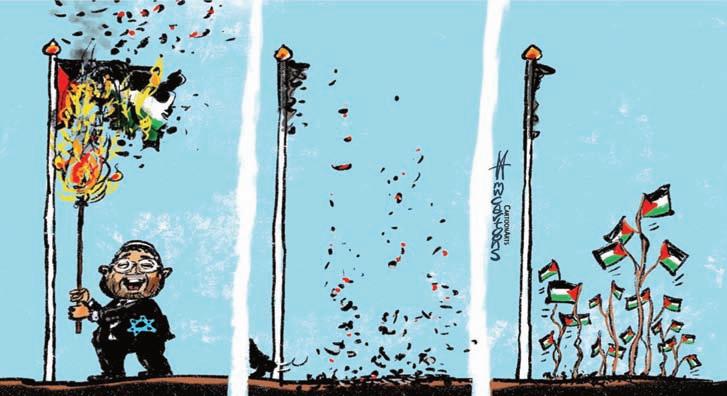
The body cam video from Memphis, TN shows a familiar scene, starting with a traffic stop for a 29-year-old Black motorist, Tyre Nichols. Police shout expletives at him and yank him from his car. Then they beat him senseless, ignoring his cries for his mother, and taking their time before providing first aid. Nichols died three days later in the hospital. Memphis is one of hundreds of cities that have sent their law enforcement officials to Israel to learn policing strategies. These trainings with an occupying force that rules a population deprived of human and civil rights do not promote security. These programs facilitate an exchange of methods of state violence and control, including mass surveillance, racial profiling and suppression of protest and dissent. Everyone who has taken part in these brainwashing trainings needs to be de-programmed.
As we went to press, the House of Representatives voted to remove Rep. Ilhan Omar (D-MN) from her position on the Foreign Affairs Committee. As Daniel Larison notes (p. 24), Omar has long been targeted and defamed as an anti-Semite for challenging the U.S.-Israel relationship and questioning the bipartisan norms of U.S. foreign policy. The successful Republican effort to oust Omar from the powerful committee prompted impassioned responses from many of Omar’s Democratic colleagues.

“Don’t tell me that this is about a condemnation of anti-Semitic remarks when you have a member of the Republican caucus who has talked about Jewish space lasers,” Rep. Alexandria Ocasio-Cortez (D-NY) said, referring to Rep. Marjorie Taylor Greene (R-GA). “As a proud Jew and a proud friend and colleague of Ilhan Omar, I don’t need any of you to defend me against anti-Semitism,” Rep. Jan Schakowsky (D-IL) told her Republican colleagues. “My fellow Minnesotans and I see this for what it is: a petty vendetta,” Rep. Betty McCollum (D-MN) remarked. “Where are the free speech warriors
today?” asked a tearful Rep. Rashida Tlaib (D-MI). “The hypocrisy is obvious to the American people,” she added. Omar believes she was targeted both due to her views and her ethnicity and religion. She said her ouster does not surprise her, “because when you push power, power pushes back.”
After getting off to a slow start due to Speaker of the House Kevin McCarthy’s (R-CA) inability to quickly consolidate support for his speakership bid, the new Congress eventually ramped-up its work and began introducing a bunch of new legislation pertaining to the Middle East. Congressional correspondent Julia Pitner (p. 26) provides an overview of the pertinent legislation, as well as brief profiles on the newest members of the House Foreign Affairs Committee. (Sneak preview: Most of the new committee members have solid pro-Israel bona fides. Surprise, surprise!)
You may have never heard of the Washington Report before, but from now on you’ll be receiving this magazine regularly! We’re watching if you stand up for peace and justice and serve your constituents.
Please don’t disappoint us. Read these articles and think long and hard about sending our tax dollars to Israel.
Rep. Omar’s ouster came just after Secretary of State Antony Blinken returned from a trip to Israel and Palestine. During his brief trip, Blinken uttered the typical American talking points: support for a twostate solution and calling for “both sides” to deescalate rising tensions. This issue features three views (p. 8) on the new Israeli government and the tepid response of U.S. officials.
Prior to COVID-19, the American Israel Public Affairs Committee’s (AIPAC) annual Policy Conference in Washington, DC attracted thousands upon thousands of individuals. Three years later, the organization appears headed in a new direction, as they are now deep in the game of funding and influencing political campaigns, having recently launched their own PAC and Super PAC. As such, they appear to no longer value having an annual megaconference. This January, AIPAC did host a smaller gathering of 1,000 invited guests to strategize and hear from U.S. officials, such as Secretary of Defense Lloyd Austin (p. 49). We tried to attend the event, but were denied entry (again, surprise, surprise). AIPAC has changed tactics, but it remains highly influential, and you can count on the Washington Report continuing to track and report on its every move.
Thank you to our 2022 Angels Choir (see pp. 73 and 74)! Some of you sent contributions totalling under $100 for the year and are not named, but we value and put to good use every dollar you send! To those of you who already donated in 2023, we will list your name in the May 2023 issue—unless you choose to be anonymous. You’re the reason this community-supported magazine and independent bookstore are still standing and entering our 41st year.
Make a Difference Today!
Executive Editor: DELINDA C. HANLEY
Managing Editor: DALE SPRUSANSKY
Contributing Editors: WALTER L. HIXSON
JULIA PITNER
IDA AUDEH
Other Voices Editor: JANET McMAHON
Middle East Books and More Director: NATHANIEL BAILEY
Finance & Admin. Dir.: CHARLES R. CARTER
Assistant Bookstore Dir.: HAJIRA ASGHAR
Art Director: RALPH UWE SCHERER
Founding Publisher: ANDREW I. KILLGORE (1919-2016)
Founding Exec. Editor: RICHARD H. CURTISS (1927-2013)
Board of Directors: HENRIETTA FANNER
JANET McMAHON
JANE KILLGORE
Washington Report on Middle East Affairs (ISSN 87554917) is published 7 times a year, monthly except Jan./Feb., March/April, June/July, Aug./Sept. and Nov./Dec. combined, at 1902 18th St., NW, Washington, DC 20009-1707. Tel. (202) 939-6050. Subscription prices (United States and possessions): one year, $29; two years, $55; three years, $75. For Canadian and Mexican subscriptions, $35 per year; for other foreign subscriptions, $70 per year. Periodicals, postage paid at Washington, DC and additional mailing offices. POSTMASTER: Send address changes to Washington Report on Middle East Affairs, P.O. Box 292380, Kettering, OH 45429.
Published by the American Educational Trust (AET), a nonprofit foundation incorporated in Washington, DC by retired U.S. foreign service officers to provide the American public with balanced and accurate information concerning U.S. relations with Middle Eastern states. AET’s Foreign Policy Committee has included former U.S. ambassadors, government officials, and members of Congress, including the late Democratic Sen. J. William Fulbright and Republican Sen. Charles Percy, both former chairmen of the Senate Foreign Relations Committee. Members of AET’s Board of Directors and advisory committees receive no fees for their services. The new Board of Advisers includes: Anisa Mehdi, John Gareeb, Dr. Najat Khelil Arafat, William Lightfoot, George W. Aldridge and Susan Abulhawa.
The Washington Report on Middle East Affairs does not take partisan domestic political positions. As a solution to the Palestinian-Israeli dispute, it endorses U.N. Security Council Resolution 242’s land-for-peace formula, supported by nine successive U.S. presidents. In general, it supports Middle East solutions which it judges to be consistent with the charter of the United Nations and traditional American support for human rights, self-determination, and fair play. Material from the Washington Report may be reprinted without charge with attribution to Washington Report on Middle East Affairs. Bylined material must also be attributed to the author. This release does not apply to photographs, cartoons or reprints from other publications.
Indexed by ProQuest, Gale, Ebsco Information Services, InfoTrac, LexisNexis, Public Affairs Information Service, Index to Jewish Periodicals, Ethnic News Watch, Periodica Islamica.
CONTACT INFORMATION:
Washington Report on Middle East Affairs
Editorial Office and Bookstore:
1902 18th St. NW, Washington, DC 20009-9062
Phone: (202) 939-6050 (800) 368-5788
Fax: (202) 265-4574
E-mail: wrmea@wrmea.org • bookstore@wrmea.org circulation@wrmea.org
advertising@wrmea.org • donations@wrmea.org
Web sites:
http://www.wrmea.org
http://www.middleeastbooks.com
Subscriptions, sample copies and donations: P.O. Box 292380, Kettering, OH 45429
Phone: (800) 607-4410
• Fax: (937)-890-0221
Printed in the USA
Too many progressive Democrats voice support for Zionist Israel, despite its designation as an apartheid state and its failure to abide by the Oslo Accords.
One such example is recently elected Sen. John Fetterman (D-PA). This is what Fetterman told Jewish Insider in April 2021: “Whenever I’m in a situation to be called on to take up the cause of strengthening and enhancing the security of Israel or deepening our relationship between the United States and Israel, I’m going to lean in.” Fetterman added that he was “dismayed” by some in Congress voting against funding for Israel’s Iron Dome.
There is nothing progressive about supporting a settler colonial state like Israel. And, if these lawmakers are willing to abet Israel’s crimes, why should we have any confidence in their positions on domestic issues?
America is a free country, however it often feels as if the country is hostage to Israel. Hundreds of lobbies, think tanks and media outlets are working at the behest of the Zionist state to keep unlimited support flowing. The work of the lobby is the only explanation for continued U.S. funding for Israel. How else can one justify $3.8 billion a year in aid to Israel when it is a violator of human rights?
Mohammed Khaku, Allentown, PA
Israel is in violation of multiple U.N. resolutions, international law and the U.S. Leahy Law due to its brutal occupation of the Palestinians.
America must find the courage to confront Israel with an ultimatum: Either agree to a just two-state peace settlement with the Palestinians, based on pre1967 borders with East Jerusalem as the Palestinian capital, or the U.S. ends all financial, military and diplomatic aid to apartheid Israel. We need less talk and more action.
Ray Gordon, Venice, FL
Walter L. Hixson’s review of my book, We Are Not One: A History of America’s Fight Over Israel, printed in the January/February issue, is driven by his ideology, and has many inaccuracies about both me and the book.
For instance, nowhere do I claim that the “book is the first to systematically examine the relationship between American Jews and Israel.” Rather it’s the first book to systematically examine the history of the U.S. debate over Israel (and goes well beyond just American Jews).
In addition, when he says I make the point “Israel is an oppressive and ultimately apartheid state,” those are his words, not mine. Moreover, he insists that “Alterman’s book echoes the very problem he describes,” because, “in New York publishing, which is the milieu in which Alterman operates, there are limits as to how far one can go in condemning Israel’s violent apartheid regime and demanding meaningful change.” This is nonsense. Once again, he simply does not understand the book’s topic. It is about the history of the debate over Israel in the United States. It’s not about what is to be done about Israel, Palestine or anything else. As for the “millieu” in which I allegedly “operate,” now he’s just making things up.
Eric Alterman, via Twitter
Donations to the Israel Defense Forces (IDF) are not tax-deductible. Under the U.S. Patriot Act, whoever knowingly provides material support or resources to a foreign terrorist organization shall be fined or imprisoned for no more than 20 years, or both. The IDF is a foreign terror organization. Let me explain.
The year 2022 was the deadliest year for Palestinians living under Israeli occupation in decades: 231 Palestinians were killed by the IDF. The victims were men, women and children who were killed in their own country.
It is mind-boggling to hear that the IDF officer who killed a 24year-old Palestinian with autism in 2021 just got a promotion and raise.
That news led Miko Peled, an Israeli-American author, to refer the IDF as a “terrorist organization” that has been engaged in the crimes of ethnic cleansing and genocide against Palestinians for decades.
I should note here that when Israeli settlers harass Palestinian children on their way to school, destroy their crops and/or chant “death to Arabs,” they are typically protected by the police and IDF, but if Palestinians stand up for themselves, they are often shot by the IDF. Whoever provides support to the IDF is complicit in crimes against Palestinians and in violation of U.S. laws that ban support for any terror group. Now it’s time for the U.S. to enforce these laws.
Mahmoud El-Yousseph, via email
Jeff Halper wants all the “Palestine” organizations to push for a U.N. Protection Force for the Palestinians in the occupied territories. I think I favor it, given that the alternative is no protection against the Israeli settlers, soldiers and police.
A Palestinian friend of mine favors it, and I think some other Palestinians do too. They point out that the U.S. has always vetoed U.N. bills critical of Israel, meaning it’s unlikely Washington would allow the establishment of a U.N. protection force. (This is another argument in its favor!)
The Palestinians ultimately have very few options.
My local chapter of the Middle East Committee of Women Against Military Madness is divided on the idea of a U.N. protective force, because of course such a force would be armed.
One possible alternative would be a nonviolent peace force, but I don’t see that happening, either.
Lisa Marrow, St. Paul, MN
According to the chair and executive director of the Texas Holocaust, Genocide
Send your letters to the editor to the Washington Report, P.O. Box 53062, Washington, DC 20009 or e-mail <letters@wrmea.org>.
and Anti-Semitism Advisory Commission, progressives and far-left critics of Israel possess an “anti-Israel ideology rooted in anti-Semitism.” Nonsense. Their critiques of Israel are based on its mistreatment of native Palestinian Arabs, who are themselves Semites.
Amnesty International, Human Rights Watch, the Presbyterian Church, several Israeli human rights organizations such as B’Tselem and numerous American Jews have criticized Israel for practicing apartheid and collective punishment.
Claiming they are antiSemites or self-hating Jews is a smear tactic designed to shield Israel from legitimate criticism.
George Aldridge, Belton, TX
Canadian legislator Joel Harden, a member of Ontario’s New Democratic Party, has been attacked by Israeli advocacy groups for alleged “anti-Semitic comments.” In 2021, Harden said, “the single greatest origin of violence in the Middle East, it is unquestionably the state of Israel and the way in which they feel absolutely no shame in defying international law.”
Harden was referencing the fact that the Israeli state has defied many U.N. resolutions and the Geneva Conventions to maintain control of conquered Palestinian territory. Israel has committed military aggression against all its neighbors and exists in a self-imposed state of permanent militarism.
Peace will only be possible when the U.S. government ceases its military, economic and diplomatic
support for Israel’s total domination of Palestinian society. Only that will allow the beginning of fair-dealing. The cynical twostate fantasy must also eventually be replaced by a binational state with equal rights for all.
Rather than attempt to silence and shame Harden and others, it might be wiser to examine the facts behind their statements.
For the time being at least, such attacks will continue to be mounted by those determined to shield Israel from the consequences of its unethical and illegal conduct.
Morgan Duchesney, Ottawa, ON ■OTHER VOICES is an optional 16-page supplement available only to subscribers of the Washington Report on Middle East Affairs. For an additional $15 per year (see postcard insert for Wash ington Re port subscription rates), subscribers will receive Other Voices inside each issue of their Washington Report on Middle East Affairs.
Back issues of both publications are avail able. To subscribe, telephone (800) 607-4410, e-mail <circulation@wrmea. org>, or write to P.O. Box 292380, Kettering, OH 45429.

ON MONDAY, JAN 30, U.S. Secretary of State Antony Blinken arrived in Jerusalem and delivered a speech alongside re-elected Israeli Prime Minister Binyamin Netanyahu.
The arrival of the secretary of state comes amid two landmark moments that took place last week. The first was the killing of 10
Palestinians during an Israeli army invasion of the Jenin refugee camp on Jan. 26, which eyewitnesses called a “massacre.” The second was a guerrilla shooting operation undertaken by 21-yearold Khairi Alkam in the illegal Israeli settlement of Neve Yaakov located in East Jerusalem, where six Israeli settlers and one Ukrainian national were killed.
“We want to make sure that there’s an environment in which we can…create the conditions where we can start to restore a sense of security for Israelis and Palestinians alike,” the secretary of state affirmed at a press conference following a meeting with Netanyahu where the Biden official reiterated calls for a twostate solution.
For Palestinians, the surge in Israeli attacks on Palestinians is making any restoration of security seem impossible, and Blinken’s message only reflected the biased approach the Biden adminis-
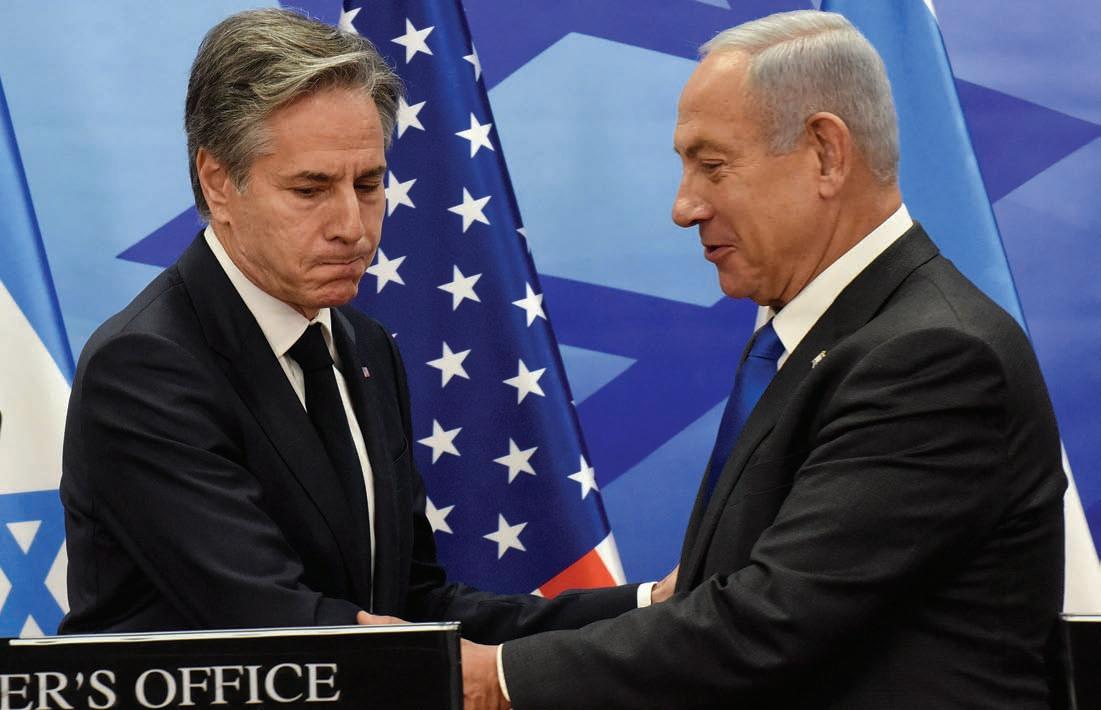 Mariam Barghouti is a Palestinian ‐ American writer, blogger, researcher, commentator and journalist.This article was printed in Mondoweiss on Jan. 30, 2023. Reprinted with permission.
Mariam Barghouti is a Palestinian ‐ American writer, blogger, researcher, commentator and journalist.This article was printed in Mondoweiss on Jan. 30, 2023. Reprinted with permission.
tration is taking on the ground. “The American response was and remains biased toward the occupation,” Ubai Aboudi, executive director at Bisan Center for Research and Development, told Mondoweiss.
“When the U.S. draws an equivalence between the butcher and the butchered, then it is necessarily on the side of the butcher,” Aboudi said.
“We are still waiting on the issue of Shireen [Abu Akleh], and we doubt there has been accountability on the issue of assassinating a well-known journalist who is also an American citizen, likewise in the case of Omar Assad,” Aboudi said, recalling the slain Palestinian-Americans killed last year along with 230 others.
Abu Akleh and Assad, an 80-yearold Palestinian-American who suffered a heart attack as he was being held up by Israeli soldiers in the West Bank last year, were U.S. citizens, and yet the required legal action for holding their killers accountable has not been pursued.
Blinken also heralded the normalization efforts of the Biden and Trump administrations to increase Israeli diplomatic, military and economic ties across the region.
“As we advance Israel’s integration,” the secretary of state said, “we can do so in ways that improve the daily lives of Palestinians in the West Bank and Gaza.”
Many Palestinians are still waiting for the Biden administration to overturn several of the policies of the Trump administration, including moving the American Embassy from Tel Aviv to Jerusalem. The continuity between U.S. administrations only furthers the view that American foreign policy supports strengthened and sustained Israeli settler expansion and violence.
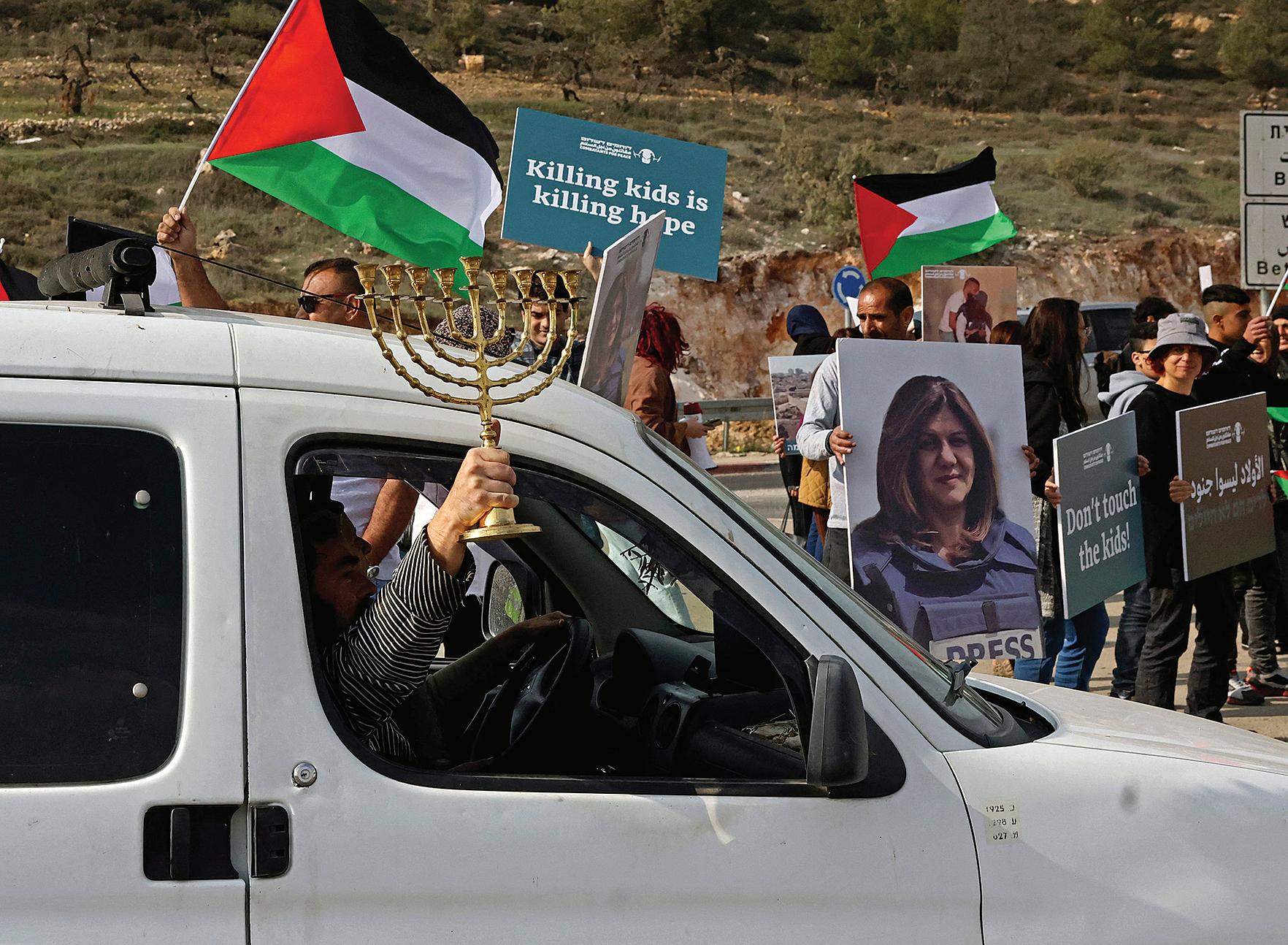
“Blinken’s message is clear in its highlight,” Ghassan Daghlas, Palestinian official and director of monitoring settlement activity in the West Bank, told Mondoweiss. “There is no pressure on Israel to change its practices.”
While some thought the inauguration of the new far-right Israeli government would shift U.S. policy, Blinken’s visit would seem to indicate it will not.
“The U.S. may have a perspective on the form of the Israeli government,” Daghlas noted about the new Israeli government, “but that’s internal [Israeli] issues which do not speak to Palestinians and their rights.”
One other focus of the trip is to increase bilateral relations between the United States and Israel. This includes the Visa Waiver Program which would allow Israeli citizens to enter the United States without prior application for visas.
U.S. Ambassador to Israel Tom Nides released a new video in coordination with Blinken’s trip which explained Israeli movement toward joining the Visa Waiver Program. Nides concluded his message on a note which signals a unified American-Israeli fraternity “as we like to say at the embassy, Blue is Blue.”
The ambassador did make a point of saying that U.S. passport holders should also be able to travel freely to Israel, “including Palestinian-Americans” but only as American passport holders.
Yet even in the case of citizenship security, the U.S. position continues to showcase a discriminatory response toward Palestinians.
SECRETARY OF STATE Antony Blinken arrived in Israel on Jan. 30 for talks with Prime Minister Netanyahu amid dramatic developments, including apparently successful Israeli drone attacks against an Iranian defense installation where Tehran is conducting parts of its ballistic missile program. U.S. officials confirmed that Israel was behind the weekend attacks, according to the Wall Street Journal.
Israeli and U.S. critics of the 2015 nuclear deal with Iran had long insisted that without a ban on Iran’s ballistic missile program,
the nuclear deal was fatally flawed. Fires and explosions at similar facilities in 2020 and 2021 have been attributed to Israeli sabotage, but unacknowledged by either Israel or the United States. The current strikes differ in both the weaponry used—drones—and in the attribution of the attacks to Israel by U.S. intelligence sources.
Iranian statements and publicly available video imagery indicate the attacks were carried out using commercially available quadcopter drones, which suggests that they were launched from within Iran, rather than, say, Azerbaijan. Regardless of the so-called “launch basket” (the area from which the drones were launched), the attacks could be important for two reasons.
1. They might presage an entirely new military strategy toward Iran’s nuclear facilities, one that does not require an intensive and hazardous air campaign and therefore lowers the costs and risks of escalation and general war. This is the approach Iran took to its highly destructive raid on two Saudi oil installations in 2019. Stay tuned.
2. The Biden administration is apparently ready to acknowledge close cooperation with Israel on military efforts to damage Iran’s nuclear and missile programs.
These points will figure in Blinken’s talks with Netanyahu about the spiraling crisis in the Palestinian arena. In the aftermath of the murder of seven Jewish worshipers emerging from a synagogue in the Neve Yaakov neighborhood in Jerusalem, tensions have spiked. In his first remarks after hitting the tarmac, Blinken offered condemnation for the violence but urged restraint overall.
“We condemn all those who celebrate these and any other acts of terrorism that take civilian lives no matter who the victim is or what they believe,” he said. “Calls for vengeance against more innocent victims are not the answer. And acts of retaliatory violence against civilians are never justified.”
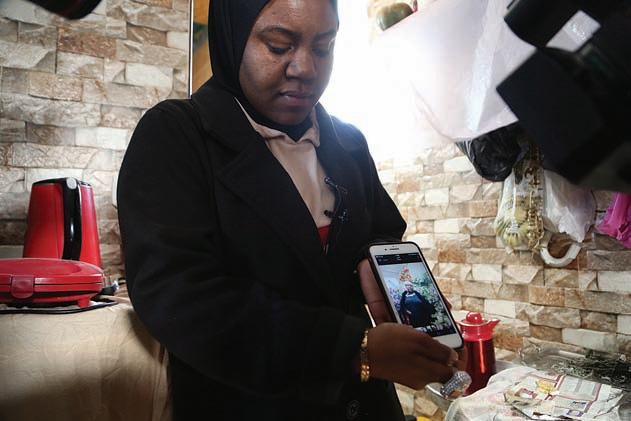
“It is the responsibility of everyone to take steps to calm tensions, rather than to inflame them,” he added. “That is the only way to halt the rising tide of violence that has taken too many lives, too many Israelis, too many Palestinians.”
The new government has placed two ultra-right wing cabinet ministers in charge of security and the West Bank. The massacre challenges them to put their money where their mouth is. For these two ministers, Itamar Ben-Gvir and Bezalel Smotrich, it is both a challenge and an opportunity. Their initial response was to order the arrest of 42 relatives and acquaintances of the lone attacker, which looks very much like collective punishment, and approve the demolition of his family’s house.
The latter penalty, framed by government lawyers as a deterrent rather punishment, is one that the Israeli Supreme Court has approved in the past. (It is a vestige of pre–1948 British Mandatory law.) Meanwhile, the Palestinian Authority has halted cooperation
Steven Simon is a Senior Analyst at the Quincy Institute and Professor in the Practice of International Relations at Colby College. He is working on a new book, The Long Goodbye: The United States and the Middle East from the Islamic Revolution to the Arab Spring
with Israeli authorities, which raises security problems of its own, while Hamas has unreservedly applauded the killings without claiming responsibility.
Blinken will want to persuade Netanyahu to avoid turning this episode into an all-out Israeli-Palestinian war. Given the sharply critical response of Israel’s business community to his government’s plan to subordinate the judiciary to parliament, Netanyahu undoubtedly knows that his government is navigating dangerous shoals. He is well-connected to leaders in this economic sector, who have warned of capital flight and a downgrading of Israel’s credit rating.
This is hardly his first rodeo. Netanyahu’s previous stints as prime minister were marred by crises in Israel’s long-running conflict with Palestinians, and he has generally backed off from Armageddon scenarios. The Biden administration has been in constant contact with Netanyahu since his government took office, no doubt reminding him that the United States welcomed his insistence on his ability to corral his cabinet and will expect him to back words with action.
More pointedly, against the backdrop of the drone attacks, Iranian support for Russian aggression in Ukraine and brutal suppression of protestors at home, Blinken will remind Netanyahu that dealing with Iran’s nuclear program is a strategic imperative for both the United States and Israel. Events, he will probably observe, have never been as favorable to this cause as they are now. He will caution Netanyahu not to undermine bilateral efforts to disarm Iran to accommodate his ultra-right wing coalition partners.
For Netanyahu, the Biden administration’s portrayal of him as the adult in the room holds promise and peril. The promise lies in his rehabilitation as the shrewd and responsible steward of Israel’s most important partner. His reputation on this score had been shredded by his alienation of Barack Obama. He can now re-burnish his credentials. Given his posture as Israel’s savior against an Iranian existential threat and his reliance on U.S. support to
infuse this posture with a semblance of reality, he will not want to drive a Palestinian wedge between the United States and Israel.
On the other hand, his exceptionally strong majority in the Knesset, the basis of his political power—and the shield against a possible prison term—hinges on the loyalty of radical parties with vocal constituencies. And they are notably indifferent to the United States and to Netanyahu’s broader objectives. Netanyahu could offer the center and center-left parties now in the opposition the chance to replace his nettlesome current coalition partners, but experience shows that the resulting government would be extremely unstable.
Blinken’s Israel visit therefore is an important event. It has the potential to restore Netanyahu to grace and even open the possibility of an invitation to the White House, by a president, who, as vice president, was described by a prominent Israeli commentator as having to “wipe [Netanyahu’s] spit off his face” and “say it was only rain,” or be relegated once again to bilateral diplomatic purgatory.
Palestinians inspect an olive field on Jan. 1, 2023, after Israeli settlers uprooted trees in the village of Aqraba, south of Nablus, in the occupied West Bank. Settlers also burned seven cars belonging to Palestinians and destroyed property in the village of Aqraba, after a Palestinian’s shooting attack in Jerusalem. Settlers carried out more than 144 attacks against Palestinians in one evening.
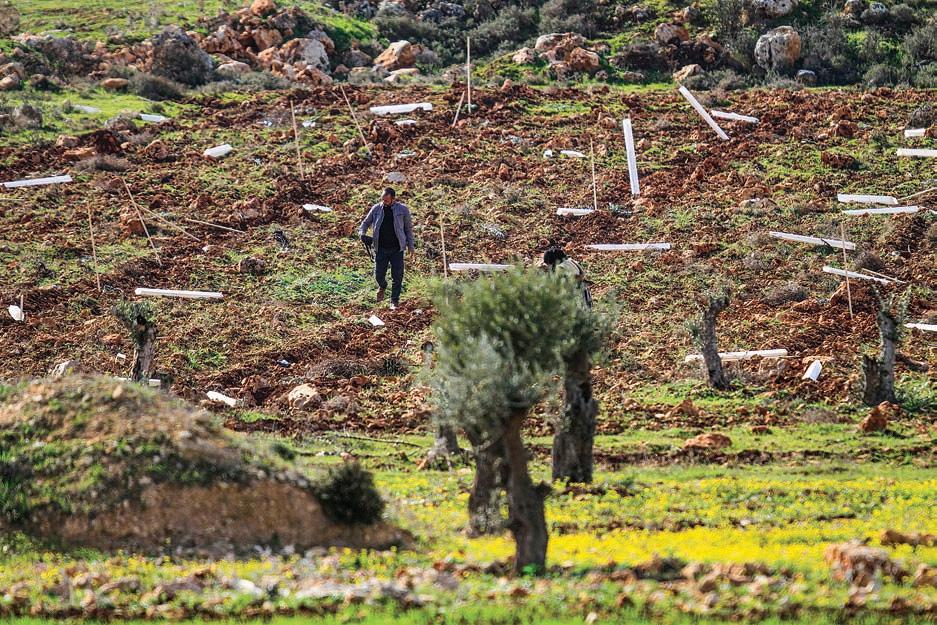
The PA has reservations about the plan, which does not include any demands for Israel to reduce the number of its incursions across the West Bank. Moreover, Abbas has blamed Israel and the “lack of international efforts to dismantle the occupation” for the escalation.
U.S. SECRETARY OF STATE Antony Blinken has put pressure on Palestinian Authority President Mahmoud Abbas to accept and implement America’s security plan for the Palestinian Authority to regain control over Jenin and Nablus. U.S. and Israeli officials have said that they see the reduction in the PA’s security control across the occupied West Bank as a key reason for the ongoing escalation in the territory.
The plan was drafted by U.S. security coordinator Lieutenant General Michael Fenzel, confirmed U.S. and Israeli officials. The Biden administration is looking for ways to de-escalate the situation in the West Bank and prevent it from deteriorating into a third intifada.
The lack of support and progress in the peace process has weakened the PA, leading to it losing control in Jenin and its refugee camp, as well as in Nablus, where Palestinian resistance fighters have been active against the Israeli occupation. The fighters do not affiliate with Palestinian factions, although some are known to be linked to the Fatah movement which controls the PA. All of them are hailed by the factions.
On Jan. 26, Israeli occupation forces raided Jenin and killed ten Palestinians, including a 61-year-old woman. The Israeli forces carry out daily arrest campaigns across the occupied West Bank.
Israeli officials claim that Jenin is raided because the PA security forces do not do it themselves. According to Palestinian officials, though, the Israeli incursions erode the PA’s ability and legitimacy to act against the resistance fighters.
Following the killings in Jenin, the PA said that it had suspended security coordination with Israel. Israeli journalist Edy Cohen has denied this and stressed that the PA still offers great assistance to the occupation state. Abbas has threatened to end security coordination on many occasions in the past, but has always pulled back at the last moment. Indeed, he has called such coordination “sacred.” ■
They knew that if they raided the center of the camp it would result in great bloodshed. The Israel Defense Forces and the Police Special Anti-Terror Unit can no longer invade this brave, determined camp without spilling a lot of blood. They also knew that no “huge terrorist attack inside Israel” was thwarted by the operation, as the IDF mouthpiece also known as Yedioth Ahronoth proclaimed Friday. They invaded the camp in the morning, while the children were on their way to school—fortunately, at least the UNRWA schools were on strike that day—just because they could.
WHAT WERE YOU THINKING? That the killing of 146 Palestinians in the West Bank in 2022 (according to B’Tselem), most of them noncombatants, would be meekly accepted? That the killing of about 30 people in the month of January would pass quietly?
That residents of the Shufat refugee camp, who are maltreated every day and every night by police and Border Police officers who invade their homes in strange operations, from tax raids to nighttime arrests, destroying their property and their dignity, will shower their abusers with rice? That someone whose grandfather was murdered by a settler and whose 17-year-old friend was killed last week by the Border Police was not liable to commit an attack?
And what were the commanders of the Jan. 26 insane operation in the Jenin refugee camp thinking? What was the point of the operation, aside from a demonstration of power? To suppress terrorism? It only fanned the flames.

“Had Maj. Gen. Yehuda Fuchs, chief of Central Command, known that this would be the result, he might not have approved it,” journalist Alon Ben-David said on Channel 13 News. And what was the general thinking, that there was another option? After all, everyone knew the Jenin operation would set off a dangerous wave of violence. It’s not possible to invade the Jenin refugee camp without a massacre, I wrote here after my visit in mid-January, and no massacre in the camp could pass quietly.
The military leaders may have thought they were thwarting terrorist attacks, but they fueled a new wave of attacks, and they knew it. It follows, then, that not only the blood of the dead in Jenin, but also in Jerusalem, indirectly, is on the hands of those who carried out the operation in the Jenin camp.
Once again, Israel is the one that started it. There is no other way to describe the chain of events. In the Jenin refugee camp today are dozens of young gunmen who are willing to sacrifice their lives. Killing a few of them does not diminish the determination of the rest. Jenin is a special refugee camp, whose equal in fighting spirit can only be found today in the Gaza Strip. The camp’s militancy flour-
Continued on page 14
Israeli forces demolish the home of Palestinian Udei Tamimi in East Jerusalem’s Shufat Refugee Camp on Jan. 25, 2023. Tamimi was killed during an attack on Oct. 19. PHOTO BY ISRAELI POLICE/ANADOLU AGENCY VIA GETTY IMAGESISRAEL’S NEW GOVERNMENT is the most right-wing and religious leadership the country has had in the 75 years of its existence, as many observers have pointed out. And this style of leadership may last because it represents the next generation of Israelis.
You don’t have to look far to see that the religiously observant Orthodox and ultra-Orthodox sectors of Israel’s population are growing quickly. The new minister of Jerusalem affairs has 12 children. The minister of national missions—one of the few women in the cabinet—has 11, the housing minister 10, the interior minister 9, the finance and immigration ministers have 7 each and the minister of heritage has 6.
The rapid growth of Israel’s ultra-Orthodox population has profound consequences for the rest of society, especially Israel’s delicate status quo between religion and secularism. Moreover, ultra-Orthodox voters and politicians are increasingly allied with parties from another religious demographic whose influence is growing: Orthodox nationalists.

As a professor of Israel Studies, I would argue that Israel’s future may look less like the cosmopolitan, secular Tel Aviv than the nearby ultra-Orthodox city of Bnei Brak or one of the satellite towns outside Jerusalem that are centers of Orthodox nationalism.
In 2015, then-President Reuven Rivlin gave a famous speech in which he called Israel
tribes.”
There are secular or moderately religious Jews, who constituted the vast majority of the country’s founders and until today make up most of its political, economic and cultural elite. Though estimates
Michael Brenner is Professor of Jewish History and Culture at Ludwig Maximilian University and Abensohn Chair in Israel Studies, American University. This article is republished from The Conversa‐tion under a Creative Commons license.
vary, around half of Israel’s Jewish population consider themselves secular, and 19 percent are marginally observant.
Then there is the group usually called National Religious, or Religious Zionist. These Israelis combine Orthodox Judaism with commitment to political Zionism, and they now constitute the core of the settler movement in the West Bank. They constitute around 20 percent of Israel’s Jewish population, or about 15 percent of its total population.
A third group is called Haredim (ultra-Orthodox). Unlike other Orthodox Jews, who are integrated into mainstream neighborhoods and workplaces, many Haredi groups try to separate themselves to an extent from secular society. Originally, they did not support the creation of the state of Israel, which they believed should come about only through the Messiah. Today, however, Haredi communities are politically associated with right-wing parties.
The fourth group Rivlin mentioned are Israeli Arabs, or as they increasingly call themselves, Palestinian citizens of Israel.
Israeli ultra‐Orthodox men attend the funeral of Rabbi Shimon Baadani, in the city of Bnei Brak near Tel Aviv, on Jan. 11, 2023. Baadani, the spiritual leader of the largest ultra‐Orthodox Jewish party within Israel’s ruling coalition, died at the age of 94. The rabbi headed the Council of Torah Sages, the highest body in Shas which joined the newly formed government of Prime Minister Binyamin Netanyahu. PHOTO BY TOMER NEUBERG/AFP VIA GETTY IMAGESThese four groups rarely interact with one another in everyday life. Each has its own school system, and they marry and socialize within their own group—which Rivlin warned could weaken the country.
Over time, there has been a population shift between the four sectors. When Rivlin delivered his speech in 2015, he reported that for the first time, most of Israel’s first graders were not admitted to secular Jewish schools, but to one of the three other systems.
The ultra-Orthodox population is growing quickly. Haredi families have an average of about seven children, compared with just three in the general population and two among secular Jews. According to a recent study of the Israel Democracy Institute, the ultra-Orthodox sector constitutes 13.5 percent of Israel’s population today and will rise to 16 percent by the end of the decade, with further increases expected. They already constitute about a quarter of all Jewish pupils in Israel’s schools today.
These demographic changes pose challenges for Israel’s society and economy. For example, the poverty rate among the ultraOrthodox is twice as high as among other Israelis due to a culture that emphasizes intensive religious study over paid employment and schools that prize religious learning over secular subjects. The unemployment rate among Haredi men is almost 47 percent, compared to less than 5 percent in the total population.
Unlike most other Jewish Israelis, most Haredi youth do not serve in the army, which is based on exemptions the secular founder of the state, David Ben-Gurion, made 75 years ago. At the time, the ultraOrthodox were a marginal group, and Ben-Gurion was convinced they would remain so.
Young Arab men and women are not required to serve in the army, either. Added to the number of Haredi youth, this means that almost half of Israel’s eligible population are not drafted today.
The second-fastest growing “tribe” in Israel, based on birth rate—with families of four children, on average—are the Orthodox National Religious, whose current political leaders represent the settlers of the West Bank.
Religious voters who support these groups often prioritize Israel’s character as a Jewish state over its character as a liberal democracy. For example, 65 percent of Jewish Israelis who identify as “religious” and 89 percent of ultra-Orthodox say that Jewish law should take precedence over democratic principles in the case of a contradiction, according to a Pew survey.
National Religious parties, which have proved popular with young voters, were the real surprise winner of the November 2022 election—particularly their more radicalized leadership. Whereas former Prime Minister Naftali Bennett, for example, was ready to enter a coalition with left-wing and Arab partners, new leaders Bezalel Smotrich and Itamar Ben-Gvir reject any cooperation with parties left of center and would not be welcome by those parties, anyway.
What both religious sectors have in common is a growing outspokenness about making Israeli society more in line with Orthodox principles. For example, Israel is the most LGBTQ-friendly state in the Middle East, yet many government ministers and their spiritual leaders have used derogatory language toward the LGBTQ community. There have been calls to permit separate seating for men and women at public events and to allow doctors to refuse patients whom they do not want to treat on religious grounds.
These shifts have the potential to alienate American Jews who are, apart from Israelis, the largest Jewish community in the world but mainly identify with the more liberal Reform or Conservative movements.
The different types of Orthodox Jews have come a long way from rejecting political Zionism or from keeping religion out of politics. Smotrich, the National Zionist new minister of transportation, has openly
stated that his ideal is a Torah state, meaning a Jewish state founded on Jewish religious laws.
His supporters are still far from fulfilling that dream, but they are well aware that the country’s demographic changes may be on their side—a challenge to Israel’s delicate status quo. Overcoming the gaps in Israel’s increasingly segmented society will require serious bridge-building efforts on both sides—even more than at the time of Rivlin’s warning. ■
Continued from page 12
ished in the alleys whose inhabitants grew up knowing that their country was taken from them and they were condemned to a life of misery. The ongoing torture in the form of someone being killed almost every day in the past few months throughout the West Bank also had to lead to Neve Yaakov and to Silwan.
The overwhelming fact that both attacks were in settlements cannot be ignored. There is no difference between Neve Yaakov and the City of David, between Esh Kodesh and Havat Lucifer. All are in the occupied territories, all are equally illegal according to international law, even if Israel has invented its own world of concepts.
What comes next is also in the hands of Israel. It is doubtful that a third intifada is unavoidable, but any grandiose Israeli revenge operation will pour oil on the flames. Any collective punishment will only aggravate the situation, even if it satisfies the right’s lust for vengeance.
Arresting 42 family members? To what end, other than to satisfy this lust?
Razing the perpetrator’s home? After all, the previous demolition in Shufat, which included an invasion of the camp by no fewer than 300 police officers, great destruction and the killing of an innocent 17-year-old boy, must have only spurred camp resident Khairi Alkam to take his pistol on Jan. 27 and go out to kill Jews in Neve Yaakov, leaving Israel shocked solely by the cruelty of the Palestinians. ■
has made its goals clear. Prime Minister Binyamin Netanyahu declared on Dec. 30, 2022: “These are the basic lines of the national government headed by me: The Jewish people have an exclusive and unquestionable right to all areas of the Land of Israel. The government will promote and develop settlement in all parts of the Land of Israel—in the Galilee, the Negev, the Golan, Judea and Samaria.”
The government includes far-right parties that oppose LGBTQ rights, equality for women, and religious rights for non-Orthodox Jews and support annexation of the occupied territories and expulsion of most of its Palestinian residents. It plans to control the Supreme Court so that blatantly racist legislation will not be overruled.
Establishment American Jewish organizations such as the American Jewish Committee, the Anti-Defamation League (ADL) and the Conference of Presidents of Major American Jewish Organizations say they are taking a “wait and see” attitude about the new government, which they argue is a product of Israel’s “democratic” system. Many other American Jews are taking a far different position.
In December, more than 330 American rabbis, including some who occupy prominent roles in major cities, pledged to block members of the Religious Zionist bloc in the Israeli government from speaking in their synagogues and will lobby to keep them from speaking in their communities. The signatories come from the Reform, Conservative and Reconstructionist movements. There are no Orthodox signatories. The letter was organized by David Teutsch, a leading Reconstructionist rabbi in Philadelphia, and John Rosove, the rabbi emeritus of Temple Israel in Los Angeles.
The letter outlines five Religious Zionist proposals that it says will cause irreparable harm to the relations between Israel and Jewish Americans. These include changing the Law of Return to keep out non-Orthodox converts and their descendants; eroding LGBTQ rights; allowing the Knesset to overrule decisions of the Supreme
Court; annexing the West Bank; and expelling Arab citizens who oppose Israel’s government.
Rabbi Jeremy Kalmanofsky of Congregation Ansche Chesed in Manhattan will no longer recite the prayer for the state of Israel that many synagogues feature at worship services. He says he can no longer pray for the success of Israel’s leaders, ministers and advisers since it includes right-wing extremists he considers “akin to the Ku Klux Klan.” “I don’t hope that this government succeeds. I hope that this government falls and is replaced by something better. I just could not imagine us saying this prayer that their efforts be successful. I think their efforts are dastardly.”
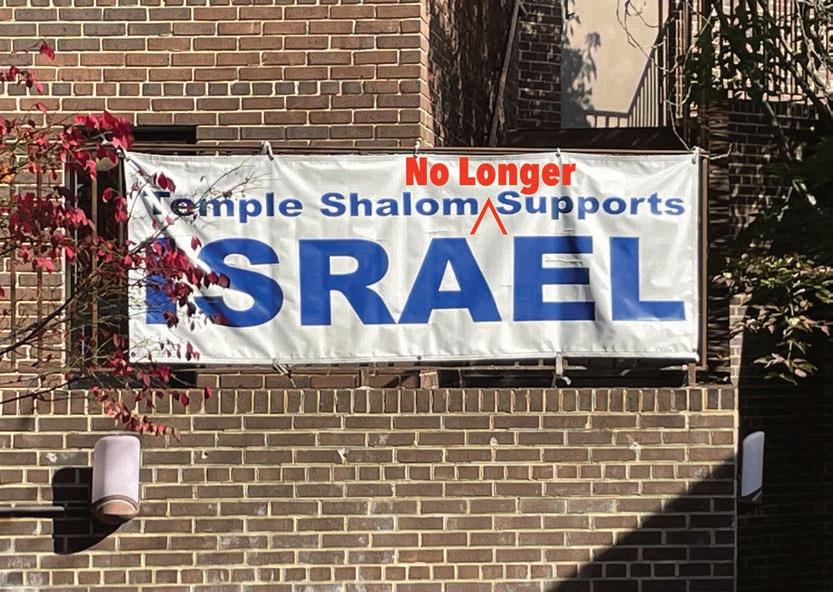
Abraham Foxman, 82, the past leader of the Anti-Defamation League, who has said that “nothing could separate him from support for Israel,” now says, according to the Jewish Telegraphic Agency, “The leaders of an extreme party could do the trick if they get their way…I never thought I would reach that point where I would say that my support for Israel is conditional.” In an interview with The Forward, he said: “I’ve always said my support for Israel is unconditional. I don’t think it’s a horrific condition to say, ‘I love Israel as a Jewish and democratic state that respects pluralism. If Israel ceases to be an open democracy, I won’t be able to support it.’”
Foxman Will the signs and Israeli flags posted on some synagogues across the country begin to change? STAFF PHOTOappears to be oblivious to Israel’s history of opposition to democracy for non-Jewish citizens and its resistance to pluralism.
Foxman said his outlook reflected that of the larger American Jewish community. Foxman, a Holocaust survivor, retired from the ADL in 2015, fifty years after first joining the organization. He laments Israel’s move to the far right: “It’s not one thing, it’s a whole package of things, which is bringing us back to the Middle Ages. It’s undermining democracy in terms of the legal system, it’s cutting back on human or equal rights for all, whether it’s LGBTQ, the Conservative movement or the Reform movement.”
Jodi Rudoren, editor of The Forward, wrote: “Itamar Ben-Gvir’s senseless, audacious pilgrimage…to the Temple Mount/Dome of the Rock compound… certainly is a harbinger (of what will happen). I am deeply worried about the independence of Israel’s judiciary, about the new government’s threats to LGBTQ people and plans to redefine who is considered Jewish under Israeli law and, of course, about the ongoing, escalating violence against Palestinians.”
A growing number of American Jews are now saying that critics of Zionism were correct from the beginning. Consider the case of Hillel Halkin, an author and translator who moved to Israel from the United States in 1970. He is the author of Letters to an American Jewish Friend: A Zionist’s Polemic, which won a National Jewish Book Award in 1978. In the book, he urges American Jews to emigrate to Israel. Halkin, now 83, admits that he was wrong. Writing in The Jewish Review of Books, he declares that critics of Zionism were correct: “We’re over the cliff and falling…nothing will save it (Israel) from the abyss of messianic right-wing politics.” Israel, he laments, avoided the central issue of Palestinian rights. To an anti-Zionist friend, with whom he argued over the years, he wrote: “You’ve won the argument. For years now, Israel has seemed to me like a man sleepwalking toward a cliff. Now we’ve fallen from it.” Sadly, he notes, racism has come to dominate Israeli politics and, as a result, “Israel is headed for disaster.”
Tom Ginsburg, professor of international law at the University of Chicago, was inter-
viewed by the Jewish Telegraphic Agency and provided this assessment of the Netanyahu government’s plan for the Israeli legal system: “You could have a situation where the Knesset—which currently has a role in protecting human rights—can pick out and override specific cases, which goes against the idea of the rule of law.” He noted that similar changes have occurred in Hungary and Poland, “which are not necessarily countries you want to compare yourself to…I honestly worry about whether this society will remain a Jewish and democratic one with the current coalition…The ethnonationalist direction of the country bothers me as a Jew.”
It’s puzzling how someone who understands international law wasn’t troubled by Israel until this last election.
Even Alan Dershowitz, long a staunch defender of Israel’s policies, including its indefensible human rights record, said he cannot defend sweeping judicial changes including allowing lawmakers to overrule the Supreme Court. Dershowitz said the proposed changes pose a threat to civil liberties and minority rights in Israel. “If I were in Israel, I would be joining the protests,” Dershowitz told Israeli Army Radio, referring to anti-government protests in Tel Aviv on Jan. 7 that drew thousands. “It will make it much more difficult for people like me who try to defend Israel in the international court of public opinion to defend them effectively. It would be a tragedy to see the Supreme Court weakened.”
A number of American Jewish groups spoke out against including the extremist faction in the government while Netanyahu was negotiating with the bloc, and more have done so since he announced the government’s formation. They include the major non-Orthodox religious movements and the liberal Jewish Middle East policy groups, including Partners for Progressive Israel, the Israel Policy Forum, J Street, IfNotNow and Americans for Peace Now.
Few Americans understand the extreme and racist nature of Religious Zionism, which now plays an important role in Israel’s government. These Jewish fundamentalists show total contempt for non-Jews.
Rabbi Kook the Elder, the revered father of the messianic tendency in Religious Zion-
ism, said: “The difference between a Jewish soul and the souls of non-Jews—all of them in all different levels—is greater and deeper than the difference between a human soul and the souls of cattle.”
Rabbi Kook’s entire teaching, which is followed devoutly by those who lead the settler movement on the West Bank (among others), is based upon the Lurianic Kabbalah, the school of Jewish mysticism that dominated Judaism from the late 16th to the early 19th century. One of the basic tenets of the Lurianic Kabbalah is the absolute superiority of the Jewish soul and body over the non-Jewish soul and body. According to the Lurianic Kabbalah, the world was created solely for the sake of the Jews; the existence of nonJews was subsidiary.
Rabbi Yitzchak Ginsburgh, an Americanborn activist rabbi on the West Bank, speaks freely of Jews’ spiritual superiority over non-Jews, which he believes is based on genetics: “If you saw two people drowning, a Jew and a non-Jew, the Torah says you save the Jewish life first…Something is special about Jewish DNA…If a Jew needs a liver, can you take the liver of an innocent non-Jew passing by to save him? Torah would probably permit that. Jewish life has an infinite value.”
Assessing the essential racism of Religious Zionism in the book Jewish Fundamentalism in Israel, Norton Mezvinsky, who was professor of history at Central Connecticut State University, and Israel Shahak, a Holocaust survivor and longtime Hebrew University professor, provide this assessment of Rabbi Ginsburgh’s position: “Changing the words ‘Jewish’ to ‘German’ or ‘Aryan’ and ‘non-Jewish’ to ‘Jewish’ turns the Ginsburgh position into the doctrine that made Auschwitz possible in the past…The similarities between the Jewish messianic trend and German Nazism are glaring.…The hatred of Western culture with its democratic elements is common to both movements.”
Zionism was a minority movement among Jews until the advent of Nazism and the Holocaust. Reform Judaism rejected Zionism until the 1940s. With the creation of Israel in 1948, Zionism slowly came to dominate organized Jewish life in the United States, even though most Jewish
Americans always rejected the Zionist idea that they were in “exile” and that Israel was their real “homeland.”
Slowly, American Judaism transformed itself from a religion of universal values which worshiped a God who had created men and women of every race and nation, to an Israel-centered religion in which the state of Israel often appeared to be the object of worship, much like the golden calf in the Bible. Israeli flags appeared in synagogues and promoting Israel became a major goal of Jewish organizations. Some critics pointed this out, but they were silenced or ignored. Some observers fear that Judaism is losing all spiritual content.
In 1988, Rabbi Arthur Hertzberg, who had headed the American Jewish Congress, wrote in the New York Review of Books: “American Jews preferred to see Israel as it was depicted to be [by] Leon Uris in Exodus, in which Israelis were painted as totally noble and Arabs were the Middle Eastern equivalent of the murderous Indians of Hollywood westerns. When support for Israel became the ‘secular religion’ of most American Jews, Israel had to be presented as a homeland that was superior to all other homelands. Most American Jews have not wanted to know what was really happening in Israel. Now they found themselves face to face with the uncomfortable fact that there is a right-wing in Israel that is so insistent on its ideology that it would rather live amid violence than search for compromises.”
Netanyahu makes it clear that Israel is not the liberal democracy Jewish Americans thought it was. Even before his new
government was elected, younger American Jews were growing increasingly alienated from the ethnocentrism which had replaced universalism in Jewish life. One observer of these trends is Eric Alterman, for many years a media columnist for The Nation and now a professor of English and Journalism at Brooklyn College (CUNY).
Speaking at Tel Aviv University in May, Alterman declared that Israel had lost American liberals and that Judaism itself is in crisis because its only content is “pro-Israelism.” Alterman said, “Israel has lost the left, no question about it, and it can’t get it back as long as it has the occupation…It’s building 4,000 new settlements. It’s doing terrible things each day…Israel has lost American Jews and liberals because it has no content to offer besides stale ‘everyone hates the Jews’ propaganda that is meaningless to young Jews.”
Alterman elaborated: “Israel has a hasbara program…but they have nothing to reach out with anymore. Because the argument I was given that made sense to me when I was growing up and maybe made sense to my daughter; that there was the Holocaust and Jews have never been safe and Israelis were invaded and are at risk every minute—that argument doesn’t hold water any more. American Jews are still being given the exact same argument by Jewish organizations… but they’ve learned something very different in the news… What they see they don’t like...American Jewish youth are walking away from Judaism. They’re either turning away from Israel or they’re walking away from Judaism entirely. Because Judaism has no answers for them.”
(Advertisement)

Alterman has just written a book, We Are Not One: A History of America’s Fight Over Israel (available from Middle East Books and More) about the chasm between American and Israeli Jews. He argues that to save Judaism, the money spent on programs like Birthright Israel, to send young American Jews on free trips to Israel, should be spent instead “on the wonders of Jewish history and culture, so as to rejuvenate American Jewish institutions and social justice institutions…I feel like Israel has said to American Jews, ‘We’re going on our way, and you can take it or leave it.’ And more and more American Jews are going to leave…Because the occupation is forever… Liberals don’t like the idea of a ‘Jewish state.’ What is the reason that people living next to each other have different rights? Israel answers, ‘Arabs are going to destroy us. Shut up and sign the check.’ The American liberal response is to walk away.”
Before the Holocaust and the creation of the State of Israel, Zionism was a minority view in the American Jewish community. Recent developments indicate that it is on its way to becoming a minority view once again. This will be a positive development for Judaism as a religion of universal values, and for Jewish critics of Zionism, such as the 80-year-old American Council for Judaism, which have kept alive an older humane Jewish moral and ethical tradition which now has an opportunity to emerge once again. A diminished role for Zionism in U.S. policy and public life will be especially beneficial for the integrity of U.S. foreign policy, and for the human rights of the Palestinian people and their right to self-determination. ■
BINYAMIN NETANYAHU celebrated the inauguration of the most reactionary government in Israel by re-endorsing Israel’s U.N. envoy Gilad Erdan in the position he himself had once held. Netanyahu’s first big step into the limelight was to lie aggressively from the General Assembly podium. Erdan began his career by opposing the Oslo Accords, so it is perhaps fitting that he remain at the U.N. for the final dismemberment of the charade.
In the early 1990s, Palestinian leaders began their long march through the international institutions. They had learned that AK47s were no match for the modern weaponry of Israel and hit upon what former U.N. Secretary-General Kofi Annan, in another context, called the unique legitimizing power of the United Nations. In effect, while the U.N. could not force Israel to leave the occupied territories, the occupiers could never enjoy secure title without the world body’s approval. This soft power has been shown in other contexts. Apartheid South Africa and Indonesia had to give up their ill-gotten gains in Namibia and East Timor, respectively, and
European Court and international court rulings still challenge Morocco’s occupation of the Sahara and Israel’s in Palestine.
Like its scofflaw patron, the U.S., Israel is not (to put it mildly) the most law-abiding U.N. member, but, like Washington, it is quick to invoke international law and order when expedient. The most recent example of this behavior is Israel’s intemperate—and counterproductive—over-reaction to the latest Palestinian success in invoking the International Court of Justice against the continuing occupation. But in a world where the West calls upon the Palestinians to abjure violence and pursue peaceful means, how could the occupier and perpetrator of so many breaches of international law persuade Europeans, who are publicly committed to support democracy and civil rights, to abstain on a resolution that invokes international law? After all, the Palestinians are only asking the General Assembly to act as a global grand jury, determining whether Israel had a legal case to answer.
If the tacit European accomplices were so confident that their protégé, Israel, was not practicing apartheid or riding roughshod over international law to maintain an illegal occupation, then why shouldn’t the world’s highest legal authority in the world rule on the issue? No rational country or diplomat could argue that there was no case, al-
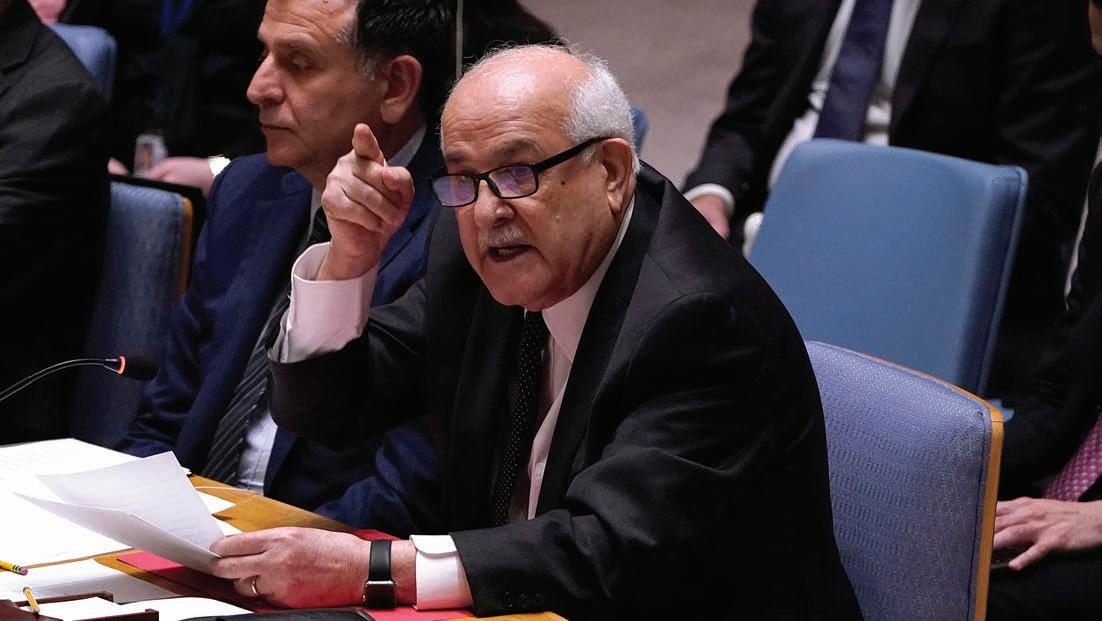
though Israel has consistently claimed so. Those pandering to Israeli wishes could argue that they were uncomfortable seeing Israel in the dock, and they did argue that it might interfere with negotiations.
But which negotiations? As torrents of Palestinian blood flow in the West Bank and as successive Israeli ministers announce expropriations while daily TV reports showed racist Israeli settler brownshirts on a rampage with explicit state backing, we have to give hasbara its due for its success in conscripting shameless defenders to Israel’s cause.
Twenty-six delegations abandoned all principles and voted with Israel against the referral; 53 others abstained, apparently unwilling to assert their lack of principles through a clear vote in favor. In the geoarithmetic of the U.N., the 87 who voted for the resolution were a comfortable majority if against, say Russia, but questionable against Israel, which was quite pleased with the result. While procedurally those abstentions have no effect, politically they are corrosive. Supporters of East Timor stopped putting forth resolutions when the Indonesians succeeded in getting as many abstentions as the Timorese got supporters. Even the allegedly Nazi Ukrainians had enough principles to support the referral, perhaps because the constant Russian mantra of “Azov Brigade” had inured them against the similarly devalued overdeployment of “anti-Semitism!” And last March, Ukraine had won its own case against Russia at the International Court of Justice, which found that Russia’s allegations of genocide against Ukraine to be without foundation and that Moscow’s military intervention was illegal. The only dissenters in the decisions were, unsurprisingly, the Russian and Chinese judges. In the General Assembly, 141 countries voted to condemn Putin’s invasion and only five voted against. Ukraine was hardly in a position to question the authority of the U.N. Israel voted with the majority then but abstained in the vote in November to assess reparations against Russia. Some Israeli commentators suggested that apart from general groveling to its chum Putin, Israel worried
that the precedent was a tool that could be brought against it—and indeed, it could.
The heart of the Israeli dilemma is this: How can a state that owes its legal existence to a 1948 U.N. General Assembly resolution deny the applicability of U.N. decisions and international law and order?
As always Israeli diplomats distract attention with a perennial replay of the “dead cat maneuver,” in which someone throws a ripe, maggoty feline corpse into the middle of the table to distract people from the real, underlying issues on the agenda. In this case the dead cat—the accusation of anti-Semitism—has been rotten for some time, but Israeli hasbara can be forgiven for repetition, since even if totally mendacious it has proven to be effective.
The latest General Assembly resolution up for a vote had merely asked for the International Court of Justice to rule on the legality of Israel’s actions. But what proved a step too far, even for the most groveling proIsraeli delegations, is Israel’s application of sanctions against the Palestinians for their temerity in pursuing the case. As Palestine representative to the U.N. Riyad Mansour said, “We face the absurd situation where impunity is enjoyed by those who violate the law and collective punishment is endured by those entitled to its protection.”
One of American Israel Public Affairs Committee’s founders wisely said, “a lobby is a night flower: it thrives in the dark and dies in the sun.” Discrete lobbies can pressure office holders into dubious behavior that they would rather not see exposed domestically or globally. But Israel went too far for its squeamish friends, so countries like Germany had stretched their elastic principles beyond breaking point. It is one thing to vote one way or the other on a procedural resolution, it is another thing entirely to countenance beating up a litigant. Over a hundred delegations, including many of the previously spineless Europeans, condemned Israel’s intimidatory measures not least because it was busy giving evidence of its rumored lawlessness. Perhaps if more voters saw
what their governments were condoning in the U.N., the daylight would turn the vampire lobbies to dust.
That lobbies work best in the dark was epitomized by Dean Douglas Elmendorf’s veto of Harvard Kennedy School’s appointment of Ken Roth to a fellowship after his retirement as head of Human Rights Watch. Elmendorf would not or could not explain why, although the echoes around the Ivory Tower resounded with lobbyists’ unsubstantiated allegations that Roth had supported “antiSemitic” slanders by allowing Human Rights Watch to report on Israeli apartheid against the Palestinians. This particular story had a happy ending: academics, human rights experts and the media created such a storm that the dean had to eat crow in public and allow Roth to take the position. His statement explained neither the veto nor its withdrawal in a coherent way.
One welcome outcome of this episode was the tattered reputation of hasbara shows like NGO Monitor and U.N. Watch, which supported firing Roth before he had even taken the job. One hopes that media will have drawn the lesson from the incident and go directly for quotes to the hasbara ventriloquists themselves in Israel’s Ministry of Foreign Affairs rather than getting them laundered through spuriously independent dummies.
Almost five years after the Syrian regime used chemical weapons against its own people in Douma, the Organization for the Prohibition of Chemical Weapons finally and belatedly issued its fact-finding report on chemical weapons use in Douma and Syria and, despite years of obfuscation by Russia and denial by Bashar al-Assad, fingered the Syrian tyrant for using chemical weapons. Moscow’s behavior in Ukraine doubtless helped the office find its backbone in the institution. Many people in Syria and Ukraine might be alive now if Washington had held its line in the sand about the use of chemical weapons. ■
THE LATEST ARAB OPINION INDEX 2022 is yet more proof that Arab societies are diverse in every possible way, from their assessment of their economic situation and living conditions to their take on immigration, state institutions and democracy. With one single exception: Palestine.
According to the poll, which is carried out annually by the Arab Center for Research and Policy Studies in Doha, 76 percent of respondents said that Palestine is a cause for all Arabs, not Palestinians alone.
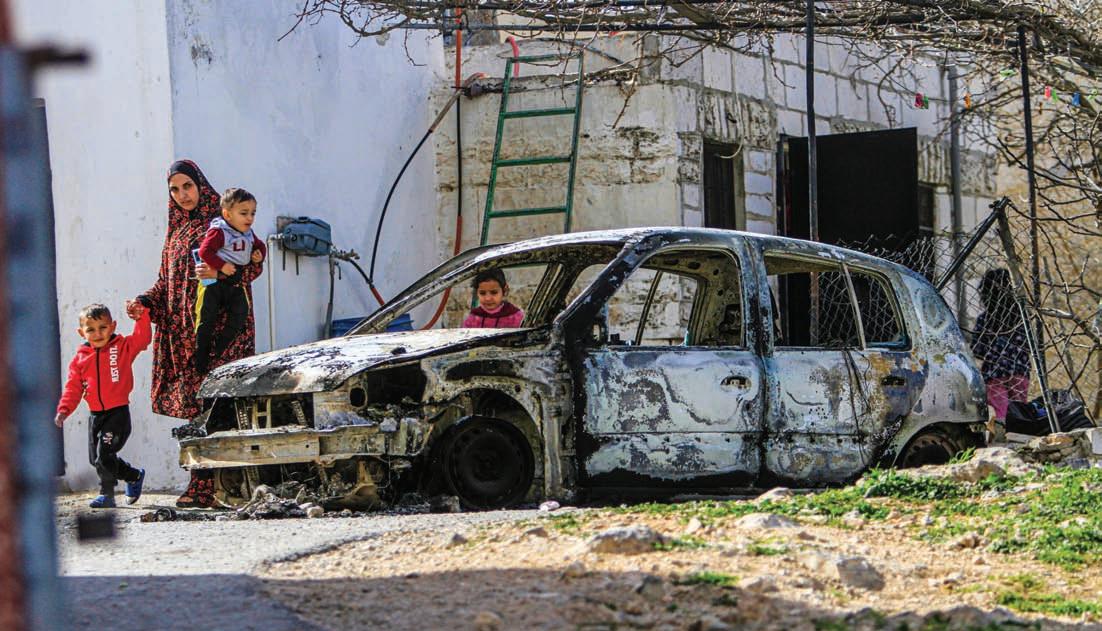
Three important points must be kept in mind when trying to understand this number.
Dr. Ramzy Baroud is a journalist, author and editor of Palestine Chronicle. His latest book, co‐edited with Ilan Pappé, Our Vision for Liberation: Engaged Palestinian Leaders and Intellectuals Speak Out, is available from Middle East Books & More. Dr. Baroud is a non‐resident senior research fellow at the Center for Islam and Global Affairs (CIGA). His website is <www.ramzybaroud.net>.
First, Arabs are not merely expressing sympathy or solidarity with Palestinians. They are stating that the Palestinian struggle against the Israeli occupation is a collective Arab struggle.
Second, these views are the same across all sections of society throughout the entire geographic expanse of the Arab world, from the Gulf to the Maghreb regions.
Third, equally important is that the public opinions that have been examined in the poll come from countries whose governments have either full diplomatic ties with Israel or vehemently reject normalization.
The study is quite extensive, as it included 33,000 individual respondents and was carried out in the period between June and December 2022. Once again, the Arab people collectively reject normalization with Israel, with Algeria and Mauritania topping the list at 99 percent each.
Though some might discount the detailed study by claiming that Arabs inherently hate Israel due to their deep-seated aversion to
Jews, the study breaks down the reason why Arab masses have such a low opinion of Israel.
When they were asked why they reject diplomatic ties between their countries and Israel, the respondents mostly “cited Israel’s colonial and expansionist policies, as well as its racism toward the Palestinians and its persistence in expropriating Palestinian land.”
Only 5 percent cited religious reasons behind their position and that too cannot be dismissed as mere religious zealotry, as indeed many Arabs formulate their views based on the moral values enshrined in their religions; for example, the need to oppose and speak out against injustice.

It must be stated that this is hardly new. Arabs have exhibited these views with an unmistakable consistency since the start of the Arab Opinion Index in 2011 and, one would dare argue, since the establishment of Israel atop the ruins of Palestine in 1948.
But if that is the case, why are the latest poll results deserving of a discussion?
While examining the American public view of Russia, the state of democracy in the United States, or the greatest threat to national security, opinion polls often fluctuate from one year to the other. For example, 70 percent of all Americans considered Russia an “enemy” to the United States in March, compared to only 41 percent in January.
The massive jump in two months is not directly related to the Russian war in Ukraine, since Ukraine is not a U.S. territory, but because of the anti-Russia media frenzy that has not ceased for a moment since the beginning of the war.
However, for Arabs, neither media shift in priorities, internal politics, class orientation or any other factor seem to alter the status of Palestine as the leading Arab priority.
In 2017 and 2022 respectively, two U.S. presidents visited the Arab region. Both Donald Trump and Joe Biden labored to execute a major shift in the region’s political priorities.
Biden summed up his agenda in a meeting with six Arab leaders in Jeddah in July 2022 by stating, “This trip is about once again positioning America in this region for the future. We are not going to leave a vacuum in the Middle East for Russia or China to fill.”
None of these self-serving priorities seem to be paying any real dividends.
That said, the pressure to dismiss the centrality of Palestine as an Arab cause does not only come from the outside. It is also guided by the internal dynamics of the region itself. For example, some pan-Arab news networks, which put much focus on Palestine in previous years, have been relentlessly and at times deliberately ignoring Palestine as an urgent daily reality in favor of other topics that are consistent with the regional policies of host countries.
Yet, despite all of this, Palestine remains the core of Arab values, struggles and aspirations. How is this possible?
Unlike most Americans, Arabs do not necessarily formulate their views of the world based on the media agenda of the day, nor do they alter their behavior based on presidential speeches or political debates. To the contrary, their collective experiences make them particularly cynical of propaganda and fiery speeches. They formulate their views based on numerous grassroots channels of communication,
whether using social media tools or listening to the Friday sermon in their local mosque.
The struggle for Palestine has been internalized in the everyday acts of the average Arab woman or man; from the names they choose for their newborn to the quiet muttering of prayers before falling asleep. No amount of propaganda can possibly reverse this.
Arab public opinion obviously matters, even though most Arab countries do not have functioning democratic systems. In fact, they matter most because of the lack of democracy.
Every society must have a system of political legitimacy, however nominal, for it to maintain relative stability. It means that the collective Arab view in support of Palestinians and rejection of normalization without an end to Israeli occupation would have to be taken seriously.
Though some Arab governments are listening to their people and thus condition normalization on Palestinian freedom and sovereignty, the United States and Israel insist on ignoring the Arab masses, as they have done for many years. However, if Washington believes that it can simply compel the Arabs to hate Russia and China and love Israel while the latter continues to kill Palestinians and occupy their land, it will be sorely disappointed, not only today, but for many years to come. ■
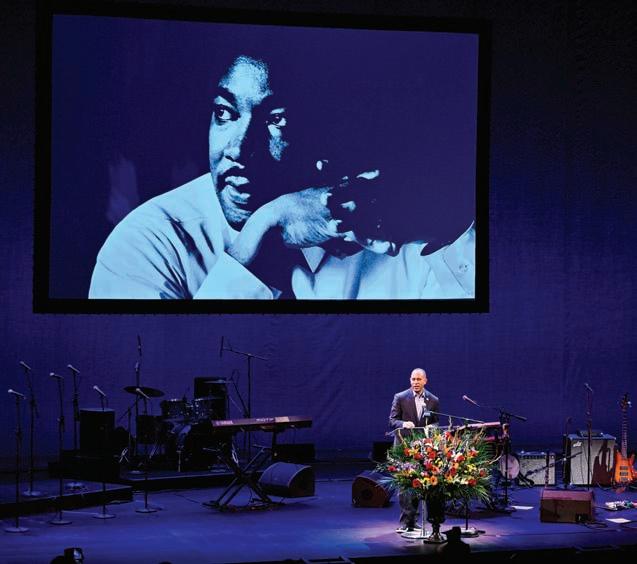 By Walter L. Hixson
By Walter L. Hixson
THE DR. MARTIN LUTHER KING, JR. federal holiday presents an annual opportunity to celebrate the greatest champion of individual liberty and justice for all in American history. This past January, as always, through written and spoken words, commemorations and community events, and an all-day slate of televised National Basketball Association games, millions of Americans and others around the world paid homage to the martyred civil rights leader.
Sadly, however, MLK Day also presents an opportunity for bla-
History’s Shadows, a regular column by contributing editor Walter L. Hixson, seeks to place various aspects of Middle East politics and diplomacy in historical perspective. Hixson is the author of Architects of Repression: How Israel and Its Lobby Put Racism, Violence and Injustice at the Center of US Middle East Policy and Israel’s Armor: The Israel Lobby and the First Generation of the Palestine Conflict (available from Middle East Books and More), along with several other books and journal articles. He was a professor of history for 36 years, achieving the rank of distinguished professor.
tant displays of hypocrisy. It is one thing for white nationalists to deride or ignore the holiday—that is to be expected—but the hypocrisy emanates from prominent politicians who, while rightfully celebrating Dr. King, at the same time display a cynical contempt for his legacy.
Unfortunately, I could cite many examples but will focus on two of the most blatant offenders, two influential members of Congress who, as African Americans and outspoken proponents of racial equality, not only should know better—they do know better. This awareness is what makes them hypocrites.
The two are Sen. Cory Booker (D-NJ) and Rep. Hakeem Jeffries (D-NY), the new minority leader of the House and the first African American to hold such a high position of leadership in Congress. Both men are skilled lawmakers and important voices in the Black community.
Both men are also in the pocket of the Israel lobby.
Until 2021, the American Israel Public Affairs Committee held high-profile annual conferences in Washington, DC in which U.S.
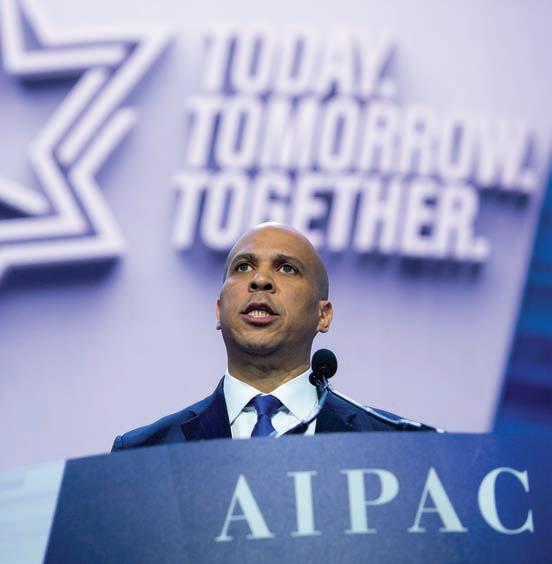
politicians competed for invitations to trumpet their loyalty to Israel even as it: violated international law through decades of illegal occupation and settlements; carried out indiscriminate warfare; jailed thousands of Palestinians including children; and designated itself a Jewish-supremacist and therefore an apartheid state.
Booker frequently ingratiated himself at the AIPAC conferences by professing his unquestioned loyalty to Israel. For example, on March 2, 2020, Booker, a member of the Senate Foreign Relations Committee, reassured the AIPAC throng of the “unshakeable bond” between the United States and Israel, an “indispensable ally” that the United States would continue to “fully support ensuring that they have the means and resources” that Washington annually provides (amounting to billions each year and more cumulative military assistance since World War II than provided to any other country). Booker condemned the BDS movement as “dangerous” and was the only Democratic presidential candidate that year to oppose renewal of the Iran nuclear deal. Booker, who has received hundreds of thousands of dollars in campaign contributions from the Israel lobby during his two terms as a senator, reveled in his friendship with AIPAC board chairman, Mort Fridman, with whom he was known to “text message back and forth like teenagers.”
Also cozy with the Israel lobby is Jeffries, who received nearly a half million dollars from lobby groups in support of his 2022 reelection campaign. Declaring in 2019 that he was “proud to be here at AIPAC’s annual policy conference...celebrating and advancing the U.S.-Israel relationship,” Jeffries has now
promised to maintain his predecessor Nancy Pelosi’s policy of declining to pressure Israel, which has sworn in an extremist right-wing government that vows to step up an already repugnant level of ethnic cleansing and indiscriminate violence against Palestinians.
Both Jeffries and Booker commemo-
rated the most recent MLK holiday with messages that embraced King’s legacy of support for civil rights and human rights. Their homilies can only be described as hypocrisy in view of their simultaneous and unquestioning support for Israeli apartheid. In a public speech Jeffries condemned those who want to “celebrate [Dr. King] but not elevate the work that he did.” Here Jeffries could have been accurately describing himself. As for Booker, he declared in a YouTube message that he would spend the King holiday “thinking about how to live his words.” As well he should.
(Advertisement)
Perhaps it is unfair to single out Sen. Booker and Rep. Jeffries—after all many white politicians are guilty of the same hypocrisy. But, as African Americans in leadership positions, Booker and Jeffries could make a real difference if they had the courage to draw the appropriate parallels between racial repression in Israel/Palestine and that which runs through the long arc of American history. Instead of papering over Israel’s egregious civil rights and human rights record they could rally people of color as well as white supporters behind the cause of civil rights and racial equality in Israel/Palestine.
Playgrounds for Palestine is a project to build playgrounds for our children. It is a minimal recognition of their right to childhood and creative expression. It is an act of love.
Playgrounds for Palestine (PfP) is a registered 501(c)3 nonprofit organization, established in 2001. We’re an all-volunteer organization (no paid staff) that raises money throughout the year to construct playgrounds and fund programs for children in Palestine.


Selling Organic, Fair Trade Palestinian olive oil is PfP’s principle source of fundraising. This year, PfP launched AIDA, a private label olive oil from Palestinian farmers. Please come by and taste it at our table.

We hope you’ll love it and make it a staple in your pantry.
For more information or to make a donation visit: https://playgroundsforpalestine.org • P.O. Box 559 • Yardley, PA 19067
If ever Booker, Jeffries and other Israeli apologists choose to live by Dr. King’s words—to summon the courage to support human rights for all people rather than selling out to a proapartheid lobby—their words of commemoration would resonate on MLK Day.
Until that time comes, however, they should stop disgracing with their hypocrisy the holiday that honors a great a man who did have the courage— courage that cost him his life— to demand freedom and justice for all. ■
It is not possible to be in favor of justice for some people and not be in favor of justice for all people.
—Dr. Martin Luther King, Jr.
 By Daniel Larison
By Daniel Larison
KEVIN MCCARTHY has pledged to remove several Democratic members from some of their most important committee assignments as a way of buying support from Republicans for his position. Among those targeted by McCarthy is Rep. Ilhan Omar of Minnesota, who has been in the crosshairs of hawks for years because she has been an outspoken critic of U.S. foreign policy.
Now McCarthy is promising to remove her from the House Foreign Affairs Committee, where she has served diligently for the last four years. The official pretext for removing her is her alleged bias against Israel, but the reality is that Rep. Omar has been a thorn in the side of hawks on many issues and, as a Somali-American Muslim woman, she has become their preferred target of abuse.
It is true that Rep. Omar is a trenchant critic of the abuses of the Israeli government and has joined her colleague Rep. Rashida Tlaib of Michigan in speaking out against the apartheid conditions that Palestinians are forced to endure. Omar first became a target of hawkish backlash from both parties in 2019 when she called out the political pressure that leads to the reflexive support that Congress
gives to Israel. Like many critics of U.S. policy toward Israel before her, she was outrageously smeared with the charge of anti-Semitism. As columnist Paul Waldman observed at the time, Omar was rebuked “for things she didn’t actually say and ideas she didn’t actually express.” It has become common for Omar’s critics to distort and misrepresent her words, because they usually have no good responses to her arguments.
In 2021, she faced another wave of dishonest attacks when she asked Secretary of State Antony Blinken where victims could go for justice if U.S. and Israeli forces are not held responsible by their own countries for abuses committed in Afghanistan and Palestine, respectively. Omar’s point was that the victims of all crimes should be able to get justice no matter who the perpetrators may be, stating, “We must have the same level of accountability and justice for all victims of crimes against humanity.” This appeal for a single standard of accountability was then twisted by Omar’s critics into equating the United States with the Taliban. Anyone who watches the video of her question or reads her words can see that she wasn’t saying anything of the kind, but she was challenging the blatant double standard that the United States applies to itself and Israel when it comes to such wrongdoing.
Daniel Larison is a contributing editor at Antiwar.com and former senior editor at The American Conservative magazine. He has a Ph.D. in History from the University of Chicago. Follow him on Twit‐ter @DanielLarison and at his blog, Eunomia.
Omar’s questioning of Blinken was important and revealing. It exposed the hypocrisy of the U.S. position on exempting itself and Israel from the jurisdiction of the International Criminal Court, and it called attention to the lack of accountability for alleged U.S. and Israeli war crimes.
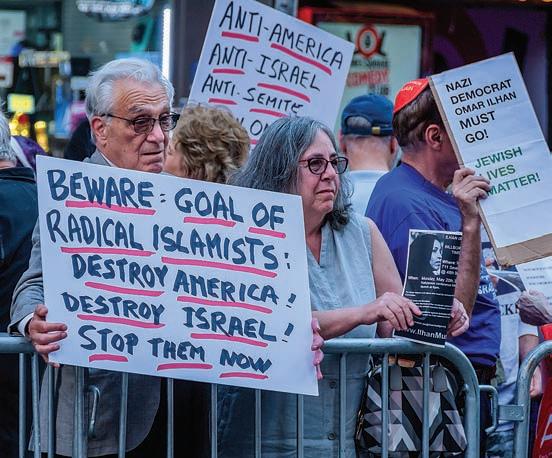
is exactly
sort
This the of oversight that membersof Congress should be exercising, and the House Foreign Affairs Committee is better for having someone like Rep. Omar on it. I suspect that McCarthy and his allies want her off the committee because she has been too effective in asking hard questions about the policies and actions of the United States and U.S.-backed states.
Despite the obnoxious backlash against her, Rep. Omar has not stayed quiet on these and other important issues. She has been a vocal critic of human rights abuses by many other governments, including both Saudi Arabia and China. Omar has condemned Uyghur genocide in Xinjiang and fought against U.S. support for the atrocious war on Yemen, and she has also denounced the illegal Russian invasion of Ukraine in the strongest terms.
Last year, Rep. Omar and her colleagues appealed to the Biden administration to reinstate the Group of Eminent Experts (GEE) to resume its work in investigating war crimes and human rights abuses by all parties to the Yemen conflict. The Saudi government had successfully lobbied to kill off the group to shield itself from international scrutiny, and Omar was one of the leaders in this effort to reverse this outrage.
She has been a consistent, principled opponent of the use of broad sanctions against other countries. While she has supported targeted sanctions against specific officials responsible for abuses, she rejects broad sanctions that mostly harm innocent people while doing little or nothing to the leadership. Rep. Omar has gone beyond most standard criticisms of
broad sanctions to describe them as the form of collective punishment they are. Not content only to criticize existing policy, Omar has been at the forefront of seeking to reform how our government uses sanctions.
In the previous Congress, she used her position as vice chair of the House Foreign Affairs Subcommittee for Africa to urge the Biden administration to analyze the humanitarian effects of broad sanctions. As the letter that she and her colleagues sent put it, “Far too often and for far too long, sanctions have been imposed as a kneejerk reaction without a measured and considered assessment of their impacts.” Almost two years since that letter was written, the need to address our government’s overuse of sanctions has only become greater. Far from scaling back the use of economic warfare, the Biden administration has continued and expanded it. The United States needs sanctions opponents like Rep. Omar in an oversight role if there is to be any chance of reining in these outof-control policies.
The scholarly literature on sanctions has found that they are usually ineffective and destructive, and Rep. Omar has been unusual among members of Congress in taking these findings seriously. In an op-ed she wrote for The Washington Post in 2019, she made a solid case against broad sanctions for being both harmful and counterproductive: “Research has shown that sanctions rarely achieve their desired goals. In the worst-case scenario, they hurt the people of a country—generally the very
(Advertisement)
people we’re purporting to help—without making a dent in the country’s behavior. And in the case of human rights abusers, research suggests that more abuses typically occur with economic sanctions in place than without them.”
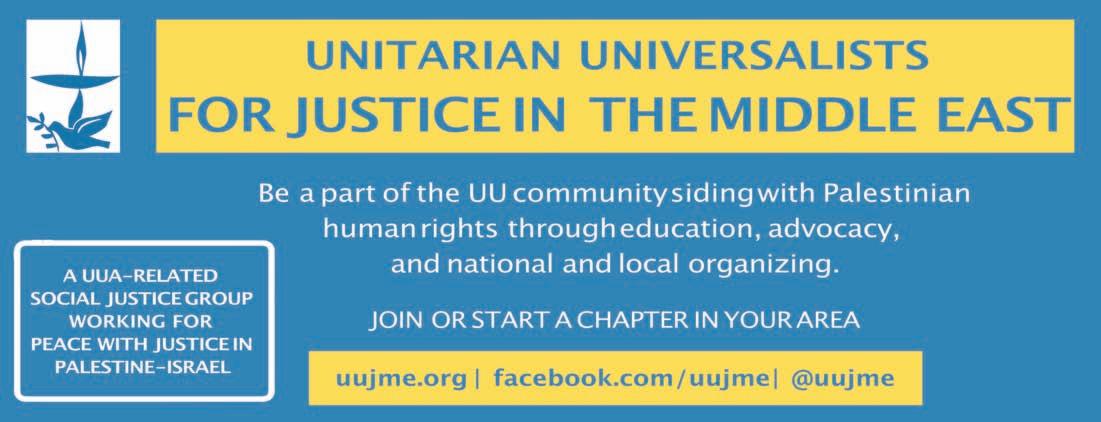
Omar has also demonstrated real political courage in dissenting against reckless policies that had widespread support in Washington. When it was easy and popular to jump on the bandwagon for regime change in Venezuela, she was one of a very few members of Congress to oppose U.S. policy there. Four years later, the failure of the regime change policy is obvious and Omar’s principled opposition to regime change and economic warfare against Venezuela has been vindicated.
When Bolivian President Evo Morales was ousted in a coup in 2019, Omar was one of a handful in Washington to call it a coup and condemn it. In both cases, it would have been politically safer to stay quiet or to embrace the prevailing view in Washington, but Rep. Omar spoke out against a destructive U.S. policy in one country and an attack on democracy in another.
This is the sort of principled advocacy that Americans need from their representatives in Congress, and it is something that is missing far too often from the making of our foreign policy. If McCarthy succeeds in removing Rep. Omar from the Foreign Affairs Committee, he will be doing a grave disservice to the public and the country. ■
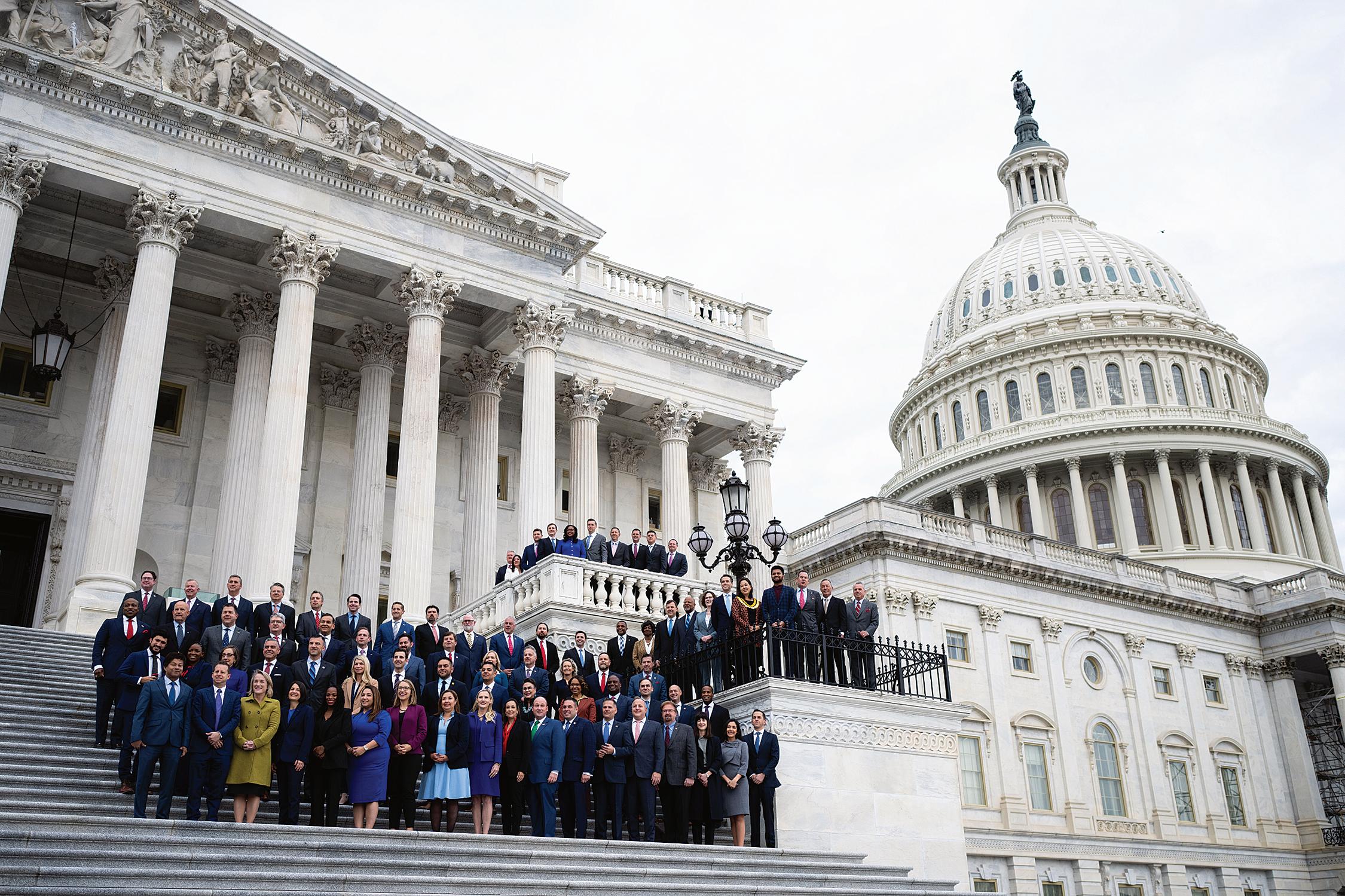 By Julia Pitner
By Julia Pitner
IN ITS CLOSING DAYS, the 117th Congress passed H.R. 2617, the Consolidated Appropriations Act for 2023, which was signed into law by President Biden on Dec. 29, 2022. Among the pieces of legislation that were not included in the Omnibus bill were H.R. 9691 “requiring investigation into all non-natural deaths of journalists in a foreign nation, who are U.S. citizens or working on behalf of a U.S.-based news media entity,” H.R. 9697 “prohibiting the use of U.S. funds to support the Saudi-led military intervention in Yemen” and H.R.
5148/S. 2120, the U.S.—Israel Artificial Intelligence Center Act.
Staying true to the punish Iran stance, the Masih Alinejad Harassment and Unlawful Targeting Act of 2022 (aka the Masih Alinejad HUNT Act of 2022) was added to this omnibus appropriations bill. It is major Iran sanctions legislation with complex and farreaching implications that are unrelated to appropriations but hamstring the administration’s effort to reformulate the U.S. relationship with Iran, specifically the nuclear negotiations and other matters.
The original legislation was introduced by Sens. Patrick Toomey (R-PA), Ben Cardin (D-MD) and Jacklyn Rosen (D-NV) in 2021. After more than a year in circulation, it at-
tracted only 10 cosponsors. Notably, parts of this bill were also offered multiple times, all unsuccessfully, as amendments to other major legislation. It was never discussed or marked up in any Senate committee, nor was it ever considered on the Senate floor. Yet, because it was appended to the FY23 Omnibus as a free-standing title, it is now the law (likely in large part due to the horrific actions of the Iranian government against Iranian protesters). Much like the DEFEND Act, which created a Middle East security architecture under the rubric of the Abraham Accords, this piece of policy legislation was added with no discussion or mark-ups in Senate committees, no hearings or floor votes and almost no debate.
Newly elected members of Congress pose for the 118th Congress member‐elect class photo on the House steps of the U.S. Capitol in Washington on Nov. 15, 2022. BILL CLARK/CQ-ROLL CALL, INC VIA GETTY IMAGESOnce the 118th House members were finally sworn in on Jan. 7, 2023, they quickly set the tone on Middle East issues, with several bills being introduced while members were being appointed to key committees. Iran and Palestine were the focus right out of the gate. On Jan. 9, H. Con. Res. 7 was introduced by Rep. Claudia Tenney (RNY) with 64 bipartisan cosponsors, “Commending the bravery, courage and resolve of the women and men of Iran demonstrating in more than 133 cities and risking their safety to speak out against the Iranian regime’s human rights abuses.” Passing the House by a vote of 420-1, the Senate introduced the concurrent S. Con. Res. 2 on Jan. 26, sponsored by Sen. Bob Menendez (D-NJ) and 39 bipartisan cosponsors, now in the Committee on Foreign Relations.
The House members immediately focused their attention on U.N. organizations dealing with Palestine and Palestinians. Two days after being sworn in, Rep. Greggory Steube (R-FL), with 19 cosponsors, introduced H.R. 211, “To provide for the abolition of certain United Nations groups, and for other purposes.” The bill, introduced on Jan. 9, is the 2023 expanded version of the COI Elimination Act H.R. 7223, also introduced by Steube, which sought “abolition of the U.N. International Commission of Inquiry on the Occupied Palestinian Territory, including East Jerusalem, and Israel.” Steube introduced the same bill in 2022, cosponsored by 101 Republicans and 18 Democrats.
Reps. Brian Mast (R-FL) and Josh Gottheimer (D-NJ) introduced H.R. 340 on Jan. 12 with no cosponsors. The bill proposes “To impose sanctions with respect to foreign support for terrorist organizations, including Hamas and the Palestinian Islamic Jihad.” It was referred to the Committee on Foreign Affairs and the Committee on Financial Services. The bill would “sanction all financial backers of Hamas, the Palestinian Islamic Jihad, or their affiliates. Any person, group, or government who supports Hamas is complicit, and the U.S. should not reward them with aid or access to our economy.”
The previous bill, cosponsored by Gottheimer (D-NJ), passed the House in the
Nominated to serve on the HFAC, along with lifetime pro-Israel PAC donations, as of Jan. 2023:
Sherman, Brad (D-CA)$640,750 Salazar, Maria (R-FL)$167,515 Mast, Brian (R-FL)$432,576 Costa, Jim (D-CA)*$285,226
Other signatories: Titus, Dina (D-NV)$129,911 Torres, Ritchie (D-NY)$349,067 Norcross, Don (D-NJ)$116,250 Peters, Scott (D-CA)$ 23,674 Gottheimer, Josh (D-NJ)$917,159 Golden, Jared (D-ME)$189,475 Fitzpatrick, Brian (R-PA)$294,527
*Leaving HFAC
Source: OpenSecrets
previous Congress as a part of the FY23 National Defense Authorization Act, but was removed from the bill by the Senate.
H.R. 552 was introduced on Jan. 26 by Rep. Lance Gooden (R-TX) and 13 cosponsors (all Republicans), “To prohibit United States contributions to the United Nations International Organization for Migration (IOM), the United Nations High Commissioner for Refugees (UNHCR), and the United Nations Relief and Works Agency for Palestine Refugees in the Near East (UNRWA), and for other purposes,” aka the “No Tax Dollars for the United Nation’s Immigration Invasion Act.’’ The bill states: “Notwithstanding any other provision of law, the Federal Government may not make a contribution to the United Nations International Organization for Migration (IOM), the United Nations High Commissioner for Refugees (UNHCR), or the United Nations Relief and Works Agency for Palestine Refugees in the Near East (UNRWA).” It also requires a report on all U.S. funding to the three organizations in 2021 and 2022, that should also “assess and specify the amount of funds IOM, UNHCR, and UNRWA should repay to the U.S.” The bill was referred to the House Committee on Foreign Affairs. Gooden introduced this same measure in 2021 (H.R. 6155). Rep. Gooden’s press release stated that this bill “prevents taxpayer funds from being used to facilitate mass migration into the U.S.” The fact is that UNRWA has nothing to do with migration (mass or otherwise) to the U.S., so it seems clear that inclusion of UNRWA in this anti-immigration bill is aimed
to garner votes from anti-Palestinian Democrats (unlikely) or (more likely) to use it as a political tool to label opposition to the bill as anti-Israel.
Letters to U.N. Secretary-General António Guterres and U.N. High Commissioner for Human Rights Volker Turk were penned by Rep. Brad Sherman (DCA) on Jan. 23 and co-signed by 10 fellow House members (listed in the box), attacking Francesca Albanese, Special Rapporteur on the situation of human rights in the Palestinian territories occupied since 1967, for alleged antiSemitism, explicitly citing the International Holocaust Remembrance Alliance (IHRA) definition of anti-Semitism as the standard against which she must be judged. The letter goes on to attack the U.N. for antiSemitism and closes saying, “We urge you to demonstrate that the U.N. is capable of genuinely addressing anti-Semitism by removing Ms. Albanese from her post.” Since her portfolio is tracking human rights in the occupied Palestinian territories, it comes as little surprise that she is under fire. Of note, all the signatories are beneficiaries of proIsrael PAC campaign support; three were nominated to the House Foreign Relations Committee, including the letter’s author.
On Jan. 26, Rep. Jake Auchincloss (DMA) delivered a speech on a bill that would reintroduce the creation of the U.S.-Israel artificial intelligence (AI) center. Although the new version hasn’t been submitted yet, he stated that the piece of legislation would allow the U.S. “to collaborate with international partners like the Israeli government … to tap into the expertise of both countries and draw upon each other’s resources to explore and develop cutting-edge AI advancements.” Previous versions of the same legislation introduced in both the House and in the Senate in 2021 garnered little support and, as noted above, were removed from the FY23 Omnibus bill.
Meanwhile, Rep. Adam Schiff (D-CA), former Chair of the House Intelligence Committee, and Sen. Ron Wyden (D-OR), member of the Senate Intelligence Committee, are waiting for responses to letters sent in late December to the Drug Enforcement Agency and FBI, respectively, raising concerns about the agencies’ use of Israeli-produced spyware. Both letters conspicuously
omitted the fact that the companies producing the spyware are Israeli.
On a positive note, in January 2023the U.S. Department of Education Office for Civil Rights released a new fact sheet de-

tailing protections for students of protected classes already part of the Civil Rights Act of 1964 and students of all religious groups. The fact sheet is drawing attention, not over what it includes but because of
REP. JONATHAN JACKSON (D-IL) is the son of civil rights leader Rev. Jesse Jackson. He told Jewish Insider he had tagged along with his father on trips throughout the world, including to the Middle East, and witnessed anti-apartheid efforts in South Africa. Based on those experiences, he rejected accusations that Israel has engaged in apartheid and said “we have to educate some members of our own Congress that there’s a history here.” He supports reentering the 2015 nuclear agreement with Iran.
Rep. Sydney Kamlager-Dove (D-CA) said in an interview that the U.S. is “fortunate” to have allies like Israel and has a longtime relationship with the California Jewish community. Last May she said that the U.S. has an “obligation” to reenter the Iran nuclear deal.
Rep. Thomas Kean (R-NJ) hails from a long-running New Jersey political dynasty with long-standing ties to the Jewish community. He said in a 2020 interview that visits to Auschwitz and Moscow, the latter of which was to meet with Soviet refuseniks, had shaped his
what it omits—the IHRA’s controversial working definition of anti-Semitism, which has drawn widespread criticism from civil society groups for defining certain criticisms of Israel as anti-Semitic. ■
“entire approach to public service,” particularly to Israel. In the New Jersey State Legislature, he led a bipartisan effort to deny state investments in Airbnb after it announced it would not list Israeli homes in the West Bank.
Rep. Michael Lawler (R-NY) is representing a heavily Jewish district in the Hudson Valley—a fact Lawler noted in a statement announcing his appointment to the Foreign Affairs Committee. “With ongoing challenges in the Middle East and an emboldened Iran looming, it will be critically important to bolster our support for one of our closest allies, Israel, in the coming weeks, months and years,” he said.
Rep. Rich McCormick (R-GA) served for 20 years in the Marine Corps and Navy, reaching the rank of commander. As a candidate in 2020, McCormick stated that “Any plan for the Middle East must recognize Israel’s right to exist, provide the Palestinian people with the right to self-determination and ensure access to the holy sites of Jerusalem…I also believe that peace should not demand the uprooting of people—Arab or Jew—from their homes.”
Rep. Cory Mills (R-FL) is an Iraq War veteran and former member of Joint Special Operations Command, who worked subsequently in private security and defense contracting. He is appointed to both the House Foreign Affairs Committee and the Armed Services Committee.
By remembering the Washington Report in your will, you can:
• Make a significant gift without affecting your current cash flow;
• Direct your bequest to a vital purpose—educating readers about U.S. foreign policy in the Middle East;
• Receive a charitable estate tax deduction;

• Leave a legacy for future generations.
Bequests of any size are honored with membership in the American Educational Trust’s “Choirmasters,” named for angels whose foresight and dedication ensured the future of the Washington Report and Middle East Books and More.
For more information visit www.wrmea.org/donate/bequests.pdf, contact us at circulation@wrmea.org, write: American Educational Trust, PO Box 292380 • Kettering, OH 45429, or telephone our new toll-free circulation number 800-368-5788 • Fax: 202-265-4574
Rep. Jared Moskowitz (D-FL) replaces former Rep. Ted Deutch (D-FL), whom he succeeded in a South Florida district, on the House Foreign Affairs Committee. Moskowitz, like Deutch, has pledged to be a vocal supporter of Israel but, along with a few longtime Congress members, such as Rep. Jerrold Nadler (D-NY) and Sen. Lindsey Graham (RSC), is concerned about the new extremist Israeli government.
Rep. Keith Self (R-TX) is a former county judge who served in the Army Rangers in Qatar, Egypt, Germany, Afghanistan and Belgium.
Standing members who left the committee: Reps. Brian Fitzpatrick (R-PA), Greg Steube (R-FL), Dan Meuser (R-PA), Claudia Tenney (R-NY), August Pfluger (R-TX) and Nicole Malliotakis (R-NY). Reps. Brad Schneider (DIL), Jim Costa (D-CA), Juan Vargas (D-CA) and Vicente Gonzalez (D-TX) have stepped off the committee. Former Reps. Steve Chabot (R-OH) and Peter Meijer (R-MI) did not win reelection, and Reps. Adam Kinzinger (R-IL) and Lee Zeldin (R-NY) did not seek re-election. ■
Rep. Chip Roy (R‐ TX) moves through Statuary Hall after talking to reporters about switching his support for Speaker of the House to Republican leader Kevin McCarthy (R‐CA) during the fourth day of elections at the U.S. Capitol Building on Jan.6, 2023 in Washington, DC. He has called for a debate on U.S. aid to Ukraine.

THE DRAMA SURROUNDING Rep. Kevin McCarthy’s (R-CA) election as Speaker of the House showcased the many ways the conservative movement has evolved (or fractured) over the past decade. While conservative rabble-rousers in Congress, many of them members of the far-right Freedom Caucus, largely cited domestic policy concerns in their objections to McCarthy’s nomination, foreign policy issues were also raised. In his remarks during the nomination process, Rep. Chip Roy (R-TX) cited McCarthy’s support for seemingly unlimited financial assistance to Ukraine as a blemish on his resume. “We should debate the merits [of funding Ukraine],” he told his colleagues. “We should debate the ups and downs of being involved. We should debate the $45 billion [in U.S. aid].”
Once known as the “war party” in the years following 9/11, a noticeable number of Republicans are now anti-war proponents. Unlike their pacifist-minded colleagues on the left, these anti-war Republicans are more concerned about the practical fiscal implications of unlimited wars than idealistic notions of peace and justice. Nonetheless, they comprise an important component of the growing bipartisan anti-war movement.
Amid these changing conservative foreign policy tides, views toward Israel remain unchanged. Why is not even one congressional Republican adamantly questioning billions in annual aid to Israel, a country that is more than capable of meeting its own needs?
Yes, a certain percentage of “Bible Belt” Republicans are likely restricted by the Christian Zionist beliefs of their constituents. Others likely view Israeli Prime Minister Binyamin Netanyahu as a key cog in the global right-wing movement, given his close relationship with the likes of former President Donald Trump, Hungarian Prime Minister Viktor Orbán and former Brazilian President Jair Bolsonaro. However, a good percentage of Republicans come from districts where voters have no strong proclivity toward either Palestine or Israel. Even if they do, such voters are likely to place “America First” concerns such as the national debt ahead of support for a foreign country. (Polls show that even the vast majority of ardent Jewish and Christian Zionists place Israel low on their list of concerns when they cast ballots.)
It thus stands to reason that there should be a pocket of criticism or at least debate regarding the U.S.-Israel relationship within the Republican congressional delegation. Aside from libertarian Rep. Thomas Massie (R-KY), however, no Republican member of Congress has taken a critical position toward Israel—be it regarding human rights, budget worries, or freedom of speech concerns
stemming from bills targeting the right of U.S. activists to boycott Israeli goods. Surely the protection of life, speech and national resources are not far from the purported conservative agenda. So why is there an Israel exception?
It seems the power of the Israel lobby is the only sufficient explanation for the dearth of Republicans voicing concern about U.S. policy toward Israel (just as it explains overwhelming support for the country among Democrats). Indeed, with the far-left’s recent evolution toward criticizing Israel, it appears Republicans now see extra value in boasting of their unwavering support for Israel. Doing so allows them to attract niche interest voters away from Democrats, and more critically, to solidify the financial support of the pro-Israel political action committees (PACs) who fund their campaigns. Even though the bulk of their constituents don’t spare a daily thought about Israel, it’s unlikely Republicans are about to walk away from the opportunity to “own” the issue of Israel by stripping it of its bipartisan status. It turns out all politics is not local, but it is largely based on cynicism.
Considering this reality, should advocates for Palestine be courting conservatives— both those in elected office and those in the grassroots—or is that a futile task? Should reaching out to the left be the sole focus? At the 2019 Israel lobby conference hosted by this publication and the Institute for Research: Middle Eastern Policy (IRmep) in Washington, DC, I asked Brad Parker of Defense for Children International (DCI)-Palestine if his organization was doing any outreach to Republican House offices as part of its effort to gain sponsors for legislation protecting Palestinian children from Israeli violence. While he said some conversations did take place (none of which resulted in a Republican cosigning the legislation), he made it clear Democrats were the focus of his group’s efforts. (Courting Democrats outside of the two dozen or so progressives who regularly stand up for Palestine is likely hard enough work.)
While organizations such as DCI-Palestine, with limited financial capabilities compared to pro-Israel groups, are understand-
ably disinclined to burn resources searching for an elected Republican to flip on the issue of Israel, it seems someone ought to take up the task of engaging the right on this issue. It may serve Republicans for Israel to become a partisan issue, but it does not serve Palestine. No human rights movement should be content aiming for just one segment of the population to support their cause. Even if the entire Democratic Party suddenly became supportive of Palestine overnight, that means the U.S. would fund and support Israel when Republicans are in power and then Democrats would have to tediously undo that support upon regaining control. Is the goal for the cause to become another Iran deal, prone to the fickle machinations of the two-party system?
For previously listed reasons (mostly money), it is indeed unlikely Washington Republicans will respond to any pressure from organized groups advocating for Palestine. Any change of pace within the party requires a grassroots movement. Democratic politicians themselves have only begun to reconsider their position on Israel due to grassroots pressure (proving that political contributions can’t always outbid the power of the voters). Groups like DCI-Palestine can only reinforce what politicians have first heard from their constituents. This means local groups advocating for Palestine must find some bridge to the grassroots conservative heart and mind, so that they no longer (often passively) sign-off on unquestioned support for Israel.
Does this sound impossible? It’s not without precedent. It wasn’t long ago that individuals such as the late Rep. Paul Findley (R-IL) weren’t afraid to loudly question Israel. In fact, before 9/11, plenty of Muslim- and Arab-Americans identified themselves with the Republican Party and were relatively free to voice concerns about Israel. Republican Presidents Dwight D. Eisenhower, Ronald Reagan and George H.W. Bush all in some way refused to mindlessly toe the pro-Israel line. Today, there are still some conservative thinkers (as rare as they may be) at outlets such as The American Conservative who are willing to challenge Israel. Growing conservative opposition to endless
wars provides further evidence that foreign policy prudence is not outside the ethos of conservatives. Despite the proliferation of Christian Zionism, even many devout Christian conservatives are open to human rights arguments in favor of Palestine. At the 2019 conference, Brad Parker remarked that churches were his group’s best tool in approaching conservative lawmakers.
Indeed, in my casual conversations with conservative (mostly Catholic) Christians, many are receptive to not just the fiscal arguments against aiding Israel, but also the moral concerns regarding the country’s treatment of Palestinians. I even have one conservative friend who despises Israel’s human rights record and dreams of representing his home state of North Carolina in Congress so that he can raise hell within the Republican Party by supporting Palestine! While some on the right have reservations about the pro-Israel consensus, they often don’t have the space to articulate these concerns, as they don’t share a common parlance with the left-wing critics of Israel, and the official Republican Party offers no validation of their views.
For all the talk about intersectionality on the left, perhaps it’s time to take on the greatest intersectional challenge yet: engaging right-wing critics of Israel, even if they are not natural allies and do not adhere fully to the left-wing “canon.” Maybe it’s even time to engage others (on the left and right alike) who are skeptical of the Palestinian position, helping them connect the intellectual and moral dots. No righteous cause ought to hide behind barriers or be stifled due to the assumed indifference or hostility of others.
Perhaps with a little work, we are not far off from a future where some conservatives will phone their members of Congress to challenge them about Israel, where pundits like Tucker Carlson (regardless of one’s views about him) rail against unquestioning support for Israel, where one Republican member of Congress finds the moral or political conviction to be the rogue member of his caucus who criticizes Israel. Maybe the recent shifts in the Republican Party signal that the time is ripe for a conservative proPalestine movement to materialize. ■
ISRAEL’S AMBASSADOR to Canada, Ronen Hoffman, resigned in late January, citing political disagreements with Israel’s new, farright government led by Binyamin Netanyahu. Yael German, Israel’s ambassador to France, quit in December.
“With the transition to the new government and to a different policy in Israel, my personal and professional integrity has compelled me to request to shorten my post and return to Israel this summer,” Hoffman said in a tweet. Hoffman was appointed ambassador by former Israeli Prime Minister Yair Lapid.
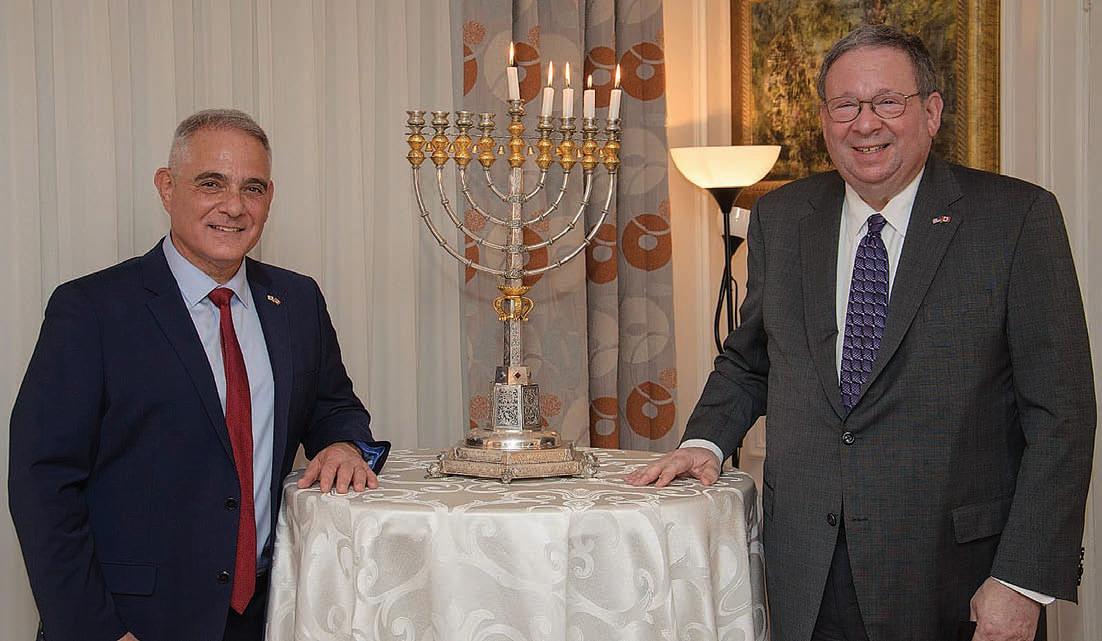
Canadians for Justice and Peace in the Middle East (CJPME) had been calling for Hoffman’s expulsion from Canada in the month before his resignation. At the beginning of the year, CJPME launched a campaign calling on Canada to boycott Israel’s extremist government.
Candice Bodnaruk has been involved in Palestinian issues for the past 14 years through organizations such as the Canadian BDS Coalition and Peace Alliance Winnipeg. Her political action started with feminism and continued with the peace movement, first with the No War on Iraq Coalition in 2003 in Winnipeg.
After Israel’s December election, CJPME noted that both Canada’s Prime Minister Justin Trudeau and Foreign Affairs Minister Melanie Joly issued warm congratulations, without any mention of extremism or Israel’s increased annexation plans in the West Bank. “Canada looks forward to working together and building on our areas of shared interest,” Joly tweeted at the time.
CJPME responded by criticizing Joly on Twitter, demanding that Canada expel Hoffman, stop military trade with Israel and all trade with illegal settlements. “Canada should refuse to meet with the representatives of Israel’s far right regime,” the organization stated on their website. The Religious Zionism party, which is part of Binyamin Netanyahu’s new coalition government, has promoted vigilante violence, racial segregation and annexation of the West Bank.
CJPME’s “Tell Trudeau: Boycott Israel’s Extremist Government” campaign, encouraged people to email their political leaders. Almost 2,000 people sent emails to government representatives. In January, Michael Bueckert, vice president of CJPME, said the Canadian government must distance itself from the new, far-right regime.
“Prime Minister Trudeau must expel Israel’s ambassador and prove
that Canada doesn’t hold ‘shared values’ with apartheid and a regime of Jewish supremacy.”
Responding to the ambassador’s resignation in an email to the Washington Report, Bueckert said Hoffman’s absence creates an easy opportunity for Canada to take a stand. “Therefore we are calling for Melanie Joly to refuse to recognize the diplomatic credentials of whoever Israel’s far-right, racist regime picks to replace him,” Bueckert said.
Only two decades ago Islamic extremism was top of mind among experts who work in the field of extremism and radicalization. Now, it is white nationalism and neoNazism that are at the forefront.
Kawser Ahmed, Adjunct Political Science Professor at the University of Winnipeg and a project director with Extremism and Radicalization to Violence in Manitoba (ERIM), spoke with the Washington Report recently on the challenges and relevancy of this work in Manitoba.
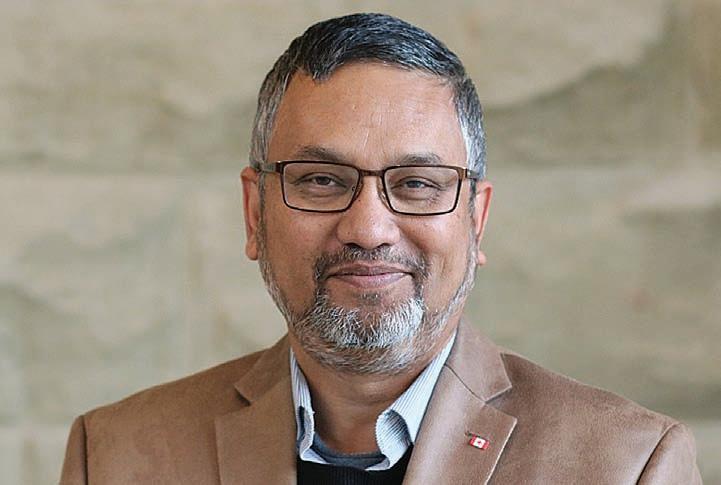
The project, funded through Public Safety Canada, is the first of its kind in Canada. One of ERIM’s goals is to build awareness among teachers about extremism and radicalization. Project leaders have created a tool kit for educators that explores such topics as how to identify racist symbols on students’ clothing or backpacks of which teachers may not even be aware.
“Teachers often do not have a clue,” Ahmed said, explaining that a teacher may not have seen a white supremacist symbol before and won’t know how to deal with it.
ERIM’s educator resources help teachers understand what a symbol means and then decide how to deal with it. Empowerment through such knowledge is one of the prime objectives of the project.
Ahmed said the project is very unique because educators are in the forefront everyday talking and dealing with young people who are vulnerable in today’s world.
“I found a lot of interest among the educators in learning why this happens,” he
said, adding that not all educators are on the same page or realize the severity of the issue. Some teachers have indicated extremism is not an appropriate topic for the classroom. “Racist ideologies and race superiority are discussed by kids at a young age,” Ahmed warns, noting that the program works with children as young as five. Once children become teens it is often too late to intervene.
In the past year, ERIM has sponsored lectures on countering White Nationalism in schools as well as the Canadian extremist group The Base, which has a presence in Manitoba. Ahmed believes The Base originally chose Manitoba as “its breeding ground” because the mid-size Prairie province was not on anyone’s radar. The group had plans to double in size and provide weapons training to members because there are many isolated locations in Manitoba and the province is also close to the U.S. border in North Dakota.
Shockingly, Ahmed disclosed that the core group of teachers he works with warned him that many teachers in Manitoba subscribe to white supremacy. Antiimmigration sentiments and “replacement theory” are also becoming more prevalent in the province, and “30 to 40 percent of Canadians believe they are being replaced by immigrants,” he said. The actual numbers of immigrants don’t matter in the larger
view of things, what matters is perception, he said. “What I am personally trying to achieve with this project is to attack the perceptions, because perception seriously matters in today’s world,” he said. Now white nationalism and replacement theories have moved almost to the mainstream in Canada, with politicians like Federal Conservative Party leader Pierre Poilievre expressing sympathy for such views.
Last spring, ERIM organizers created a tool kit, “Confronting White Nationalism in Schools,” which is available on the ERIM website, <www.erimca.org/>, along with many other teacher-focused resources. “This project aims to educate our teachers about the dangers of extremism and violence among young people, so it is awareness building,” he said. “The school team is absolutely convinced that if they do not intervene and deal with it (white supremacy) it is going to be out of control,” Ahmed concluded.
The Canadian government adopted the contentious International Holocaust Remembrance Alliance (IHRA) definition of anti-Semitism in 2019. Palestinian solidarity rights activists across Canada spent the past year writing letters, signing petitions
and meeting with government officials, yet several provincial and municipal governments still chose to adopt the IHRA definition of anti-Semitism in 2022, including provincial and city governments in Manitoba, Alberta, New Brunswick and the Vancouver City Council.
Today, activists continue to focus on education, explaining to governments and organizations how the IHRA works and the implications of adopting the definition with all of its illustrative examples of anti-Semitism. The definition states “Anti-Semitism is a certain perception of Jews, which may be directed as hatred toward Jews. Rhetorical and physical manifestations of anti-Semitism are directed toward Jewish or nonJewish individuals and/or their property, toward Jewish community institutions and religious facilities.”
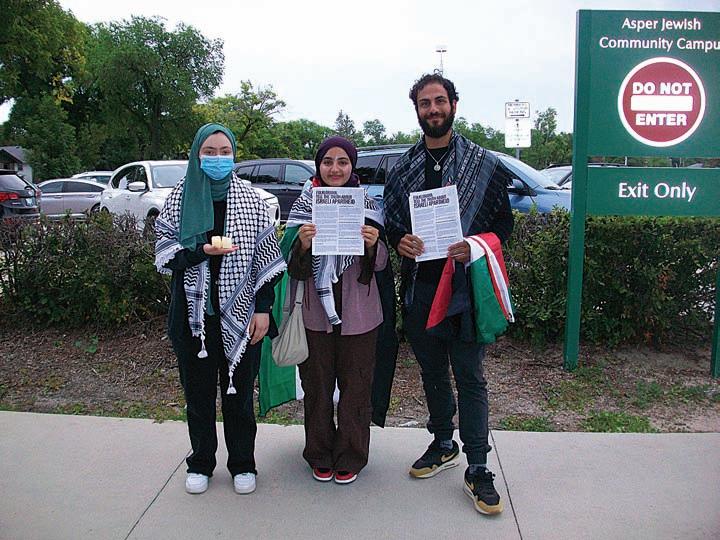
What is troublesome is not this definition itself, but the examples of anti-Semitism that were created specifically for a data collection program but are now included with it, four of which refer to criticism of Israel as anti-Semitic. Independent Jewish Voices (IJV) says those examples have led their organization as well as many others, including the BC Civil Liberties Association and Canadian Association of University Teachers (CAUT), to oppose the IHRA definition.
Aaron Lakoff, IJV’s communication and media lead, discussed the group’s campaign against the IHRA with the Washington Report recently. Lakoff said since the illustrative examples are the problematic part of the IHRA definition, activists can encourage governments to specifically not adopt the examples, which is what happened in Brampton, Ontario. “They did adopt IHRA, but then they came back and specifically said they weren’t adopting the examples because the mayor at the time was Patrick Brown, a wellknown conservative politician in Canada, who recognized how divisive the examples were,” Lakoff said.
Lakoff said his organization has also been telling the general public what IHRA is and why it should be opposed, and also why people should be finding other ways to define and fight anti-Semitism that don’t involve silencing the voices of Palestinians.
Lakoff thinks there is a certain level of fear among activists that when IHRA is adopted it may mean that the BDS movement or proPalestinian protests might be criminalized. “We haven’t seen that yet in Canada. Obviously, it’s something people should be wary of, but for now we absolutely have that space to agitate for BDS, to agitate against Israeli apartheid and we need to use that space while it’s still there,” he said. Groups may find the definition is eventually used to deny them space to hold an Israeli Apartheid Week event on campuses.
Lakoff spoke at the Montreal City Council meeting to oppose the IHRA. “There were a lot of Jews coming and speaking against IHRA. That just proves the point that we are so far away from having consensus on this definition and it’s causing such division in the Jewish community,” he said.
He said he considers it a small victory that the Canadian media has been talking about the IHRA and why it is controversial and dividing the Jewish community. The pro-Israel lobby is “losing their minds” when they see headlines in conservative newspapers like the Vancouver Sun calling the IHRA controversial. He said pro-Israel groups are trying to give the impression that the definition has broad consensus within the Jewish community which is simply not the case.
Lakoff is also concerned about the IHRA’s potential impact on universities,
workplaces, and in institutions where there is a lot on the line for people speaking out. He pointed out that many Canadian academic organizations have opposed adoption of the definition and have also issued statements and led petitions against it. Queen’s University Faculty Association rejected the IHRA last year (2022) while the University of Toronto refused to adopt it in 2021.
“I think, again regardless of the kind of research you do, any academic in their right mind is going to recognize the dangers of equating support of Palestinian human rights and anti-Semitism,” Lakoff said. He explained that part of the problem with IHRA is that it exceptionalizes anti-Semitism, pitting Jewish safety and Jewish human rights against Palestinian safety and Palestinian human rights. IJV is also concerned about the possibility that the federal Heritage Minister, Ahmed Hussen, may require grant recipients to attest to the IHRA to receive Canadian Heritage funding. Many Arab or Muslim organizations regularly speak out against Israeli Apartheid, which could be deemed anti-Semitic under IHRA, and those organizations also receive Canadian Heritage money.
“Our approach has always been, yes, of course we need to be talking about fighting anti-Semitism, but let’s do that within a broader framework of fighting white supremacy, racism and anti-Palestinian racism,” Lakoff concluded. ■
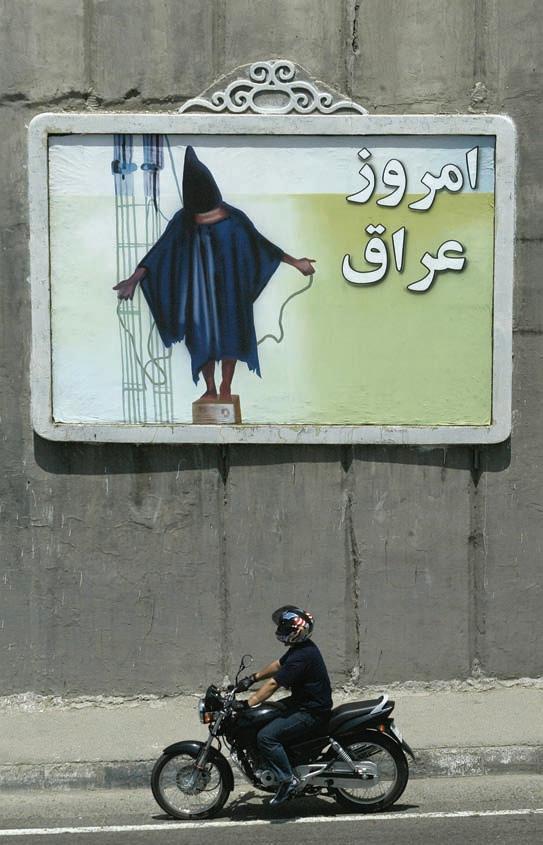 By George Aldridge
By George Aldridge
unleashed a maelstrom of fanaticism, internecine sectarian violence, mayhem and looting and anti-American hatred; it helped spawn ISIS, a virulent, violent Salafist Caliphate that threatened to take over Iraq. It also did damage that will take generations to get over. Under postwar U.S. mismanagement, Iraq went from being a “republic of fear” to a “caldron of chaos.”
The First Gulf War erupted shortly after I entered the U.S. Foreign Service—an otherwise optimistic period highlighted by the collapse of the Soviet Union, the dismantlement of the Berlin Wall and Iron Curtain, the reunification of Germany and the end of the Cold War. Years later, the 2003 German film “Good Bye, Lenin!” captured the near disbelief that the Warsaw Pact was no more and that the Cold War was over.
Saddam Hussain’s invasion of Kuwait abruptly sidelined the euphoria of the times.
Tension and turmoil thereafter seemed to reign even as the administrations of George H. W. Bush and Bill Clinton sought to facilitate a just and lasting Arab-Israeli peace settlement, albeit without Palestinian representation. Appalling horrors in Rwanda, Bosnia-Herzegovina, Kosovo and Darfur spoke of ethnic cleansing, concentration camps, even genocide. Heartless brutality took place in Srebrenica, making a mockery of “U.N. safe-havens”—the oxymoron of the 1990s.
THIS MARCH 20 will mark 20 years since the Second Gulf War, more commonly known as the Iraq War. Launched under dubious, many would maintain fabricated, justifications, the U.S.-led invasion
A U.S. diplomat for more than 27 years, George Aldridge was consul for labor and economic affairs in Casablanca from August 2002 to July 2005. Before entering the U.S. Foreign Service in July 1990, he taught American and Texas government at three North Texas junior colleges and was executive director of the southwest office of the National Association of Arab Americans.
By the early 2000s my family and I were based in Casablanca, where I was consul for labor and economic affairs, involved in the George W. Bush administration’s negotiations for a free trade agreement with Morocco. As the specter of a second Gulf War seemed inevitable, our lives grew more cautious. My wife—like other expatriates—was anxious about public reactions once our bombing raids over Baghdad occurred. “Don’t speak English to me when we’re out shopping,” she stressed. “Mumble in French or Arabic, but don’t speak English.” We concealed our identity as Americans and even exchanged our diplomatic license plates for regular Moroccan ones.
My business, labor and civil society Moroccan contacts and friends were equally alarmed. To a person, they hoped that the war would be swiftly over, with few civilian casualties. The Iraqi people, they emphasized, should not be punished for the crimes of Saddam Hussain and the Ba’ath Party. Liberate them from tyranny, but do not subject them to reprisal, they urged. I sensed they generally supported our March 2003 campaign to remove Hussain and eliminate the Iraqi military’s wherewithal to threaten its neighbors.
But with the subsequent occupation came the revolting news in July 2003 of sadomasochist torture: U.S. soldiers and intelligence officers were shown to have brutalized Iraqi detainees in macabre and grotesque ways. The February 2004 Taguba Report acknowledged that U.S. personnel at Abu Ghraib committed “numerous incidents of sadistic, blatant and wanton criminal abuses” of detainees. Brigadier General Mark Kimmitt described the vile treatment of the Iraqi prisoners as “reprehensible.” In an appearance alongside King Abdullah II of Jordan, President Bush apologized for what he said was “abhorrent abuse” and a “stain on our country’s honor and reputation.”
I was disgusted, but I was also worried. Islamists known as integristes (hardcore Islamic fundamentalists) in Morocco and others would surely use Abu Ghraib to vilify us. Various American leaders such as Generals David Petraeus and Stanley A. McChrystal warned that Islamists would use Abu Ghraib as a recruitment tool, pointing out that we Americans are indeed hideous infidels. General McChrystal commented: “In my experience, we found that every first-time jihadist claimed Abu Ghraib had first jolted him into action.”
Retribution for our crimes would be forthcoming. Our soldiers, expatriates, missionaries, diplomats, aid workers, embassy and consulate employees from the host country known as “foreign service nationals,” Peace Corps volunteers, overseas teachers and students and tourists would likely be targeted in revenge attacks.
But not only Americans and other Westerners would be threatened and victimized, Moroccans told me. As several stressed, Moroccans close to the embassy in Rabat and consulate in Casablanca or connected to the international schools and other U.S.affiliated institutions would be attacked as traitors. Moroccan women, specifically those who exhibited Western mores and lifestyles, would be especially vulnerable. As one long-time female consular contact
warned me, “The integristes will now go after anyone seen as pro-Western. You’ve enraged them against us.”

Perhaps even more alarming was a bitter comment made repeatedly by several Moroccans: “Before Abu Ghraib we thought you Americans were better than us. Now we know this is not true. You are no better than the worst of our so-called leaders. Our image of Americans has been shaken.”

Hearing Moroccans say that they had lost faith in American exceptionalism was jarring. After all, they routinely took pride in reminding one and all that in December 1777 their country was the first to recognize the United States of America. Since Operation Torch during World War II when U.S. forces liberated Morocco from French Vichy control in November 1942, Moroccans have regarded us as “the good guys.” This image was further strengthened in subsequent years when the U.S. objected to French efforts to reimpose colonial control of Morocco, Algeria and Tunisia. Somehow, even our steadfast support for Zionism had not dissuaded Moroccans that we were their friends and worthy of emulation. Abu Ghraib changed their views. Moreover, Moroccans were openly offended by
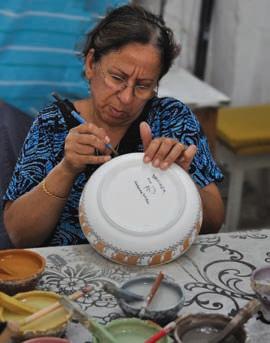
our nonimmigrant visa policy that assumed that all young North African and Middle Eastern males were an inherent threat. At large gatherings of Moroccan high school students—many of them fluent English speakers—there were frequent expressions of anxiety about going to college in the United States. These talented young scholars worried that they would be shunned and mistreated for being Moroccan Muslims.
Their parents were already alarmed by the horrors that took place ten years earlier in Bosnia. On numerous occasions they asked me if the West truly cared about Muslims. As they often remarked, “if the West won’t accept and safeguard the most Westernized and Europeanized Muslims among us, the Bosniaks, as coequals, what Muslims would be acceptable? Will you ever like us and welcome us to your homes?” They were truly disturbed by what they considered the West’s inaction and pretty much suggested that no matter how secular and Western-oriented Muslims became, they would never be fully welcomed and accorded equal status.
Hopefully, those parents, as well as the students—now adults nearing 40 years of age—have rediscovered that Americans are indeed their friends. And we need their friendship. ■
ABU AGILA Mohammad Mas’ud
Kheir Al-Marimi, 74, a Libyan national, appeared in a federal court in Washington, DC, on Dec. 12, 2022, charged in connection with the bombing that destroyed Pan Am Flight 103 over Lockerbie, Scotland while flying from London to New York. According to U.S. prosecutors, Mas’ud made the bomb that blew up the plane on Dec. 21, 1988, killing 270, including 11 people on the ground. Two other Libyans have been tried for the same crime: Abdelbaset al-Meghrahi was convicted while his co-accused Lamin Fahima was acquitted in 2001. AlMeghrahi protested his innocence until his 2012 death from prostate cancer in his Tripoli home. In fact, his conviction was widely criticized by the legal community and by United Nations observer Hans Kochler, who cited “foreign governmental and intelligence interference in the presentation of evidence.”
Mas’ud’s kidnapping and subsequent “extradition” to the U.S. started in the poor suburb of Abu Salim, south of the Libyan capital Tripoli, where armed militias roam freely.
On the night of Nov. 16, 2022, Mas’ud was getting ready for bed when half a dozen unmarked cars pulled up in front of his home. Four masked and armed men forced their way into his bedroom, dragged him out in his pajamas, shoved him into one of the cars and drove away. One of the masked men told the small crowd that quickly formed in the street that Mas’ud would be back soon. Abdel Moneim Al-Maryami, the family’s spokesman and Ma’sud’s nephew, described the shock for onlookers who “watched helplessly.”
That evening Mas’ud had just returned from his third visit to the hospital in a week. The septuagenarian suffers from a host of ill-
Mustafa Fetouri is a Libyan academic and freelance journalist. He received the EU’s Freedom of the Press prize. He has written extensively for various media outlets on Libyan and MENA issues. He has published three books in Arabic. His email is mustafa fetouri@hotmail.com and Twitter: @MFetouri.
nesses made worse during his decade-long incarceration in the notorious Al-Hadba prison in Tripoli, accused of preparing car bombs in Libya’s 2011 civil war. The U.S. Justice Department alleges that Mas’ud first confessed to making the Lockerbie bomb in Al-Hadba prison, but the former director of that prison, Khalid Sharif, denies that Mas’ud ever made such a confession while he was there. Sharif, now living in exile in Turkey, was one of the top leaders of the organization known as the Libyan Islamic Fighting Group. In 2004 the U.S. listed this Afghanistan-based group as terrorists but unlisted it in 2015 after it participated in the 2011 U.S.-NATO supported armed revolt that toppled former leader Muammar Qaddafi’s government.
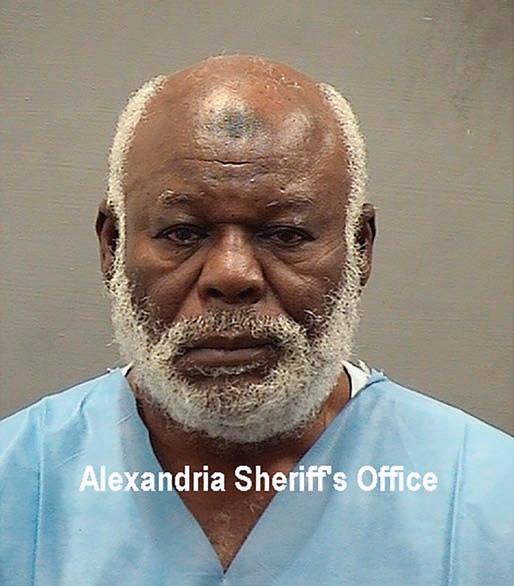
The following morning the family started searching for Mas’ud, a daunting task because different militias have different detention centers. After a week and multiple visits to the headquarters of different militias, the offices of the prime minister and the prosecutor general, and different detention centers around Tripoli, Abdel Moneim was told where he was and allowed to visit him.
In detention Mas’ud told his visitors that nobody “interrogated him,” let alone explained why he was detained or by whom. Family members continued visiting until one day his son, Essam, went for a visit but was told his father had been taken to Misrata, some 186 miles (300 km) east of Tripoli. “He was handed over” to Joint Force, a notorious and powerful militia, Essam said.
No one mentioned the idea of handing him over to the U.S. In fact, Essam said, “they assured us that he was being kept there for his own safety.” Other family members had filed a kidnapping report with the police. Government officials denied knowing anything about the kidnapping. The prosecutor general denied issuing an arrest warrant and promised to investigate the matter.
Mas’ud made headlines on Dec. 21, 2020, the 32nd anniversary of the bombing, when then-U.S. Attorney General William Barr ac-
cused him of assembling the bomb and handing it over to Al-Meghrahi in Malta.
Libyan laws do not permit the extradition of its citizens to stand trial abroad, and it has no extradition treaty with the U.S. In a BBC interview in 2021, Libya’s U.S.-educated foreign minister, Najla El-Mangoush, said her government was “open” to the idea of extraditing suspect Mas’ud but “within the law.” Faced with a huge public outcry, ElMangoush denied that she ever said she was open to Mas’ud’s extradition, forcing the BBC to release the video clip of the interview in which she made that claim.
The U.S. and Libyan governments knew that Mas’ud could not legally be transferred to the U.S. so they colluded with Joint Force, a militia loyal to Tripoli’s government, to grab him.
Just before midday on Dec. 11, 2022, some Pan Am Flight 103 victims’ families received an “urgent update” email from the Scottish authorities updating them on their
efforts to prosecute Mas’ud. The message’s closing line said the U.S. “has obtained custody” of him.
I was in Paris, waiting for news because a friend had already alerted me to expect some. His family first heard the news from me after I spoke to their spokesman Abdel Moneim that morning.
On Dec. 12, Mas’ud limped into Judge Robin Meriweather’s DC courtroom where he told the judge that he “cannot talk” before meeting his attorney. A day later, a Libyan businessman told me that he was ready to fund a defense team. But appointing the right defense team thousands of miles away is not an easy task for his family who are still in shock and confused by the conflicting advice they are getting from friends and volunteers trying to help them.
The fact that he was kidnapped should be reason enough to halt any further legal proceedings against him. But the U.S. has a history of kidnapping suspects and sending them for interrogation to countries that use torture liberally.
(Advertisement)

On two previous occasions, U.S. commandos kidnapped suspects from Libya to try them in the U.S. Ahmed Abu Khatallah, was kidnapped in 2014, and tried and convicted in the U.S. for participating in the 2012 attack on the U.S. compound in Benghazi, which killed Ambassador Christopher Stevens and three other Americans. In 2013 Abu Anas al-Libi was snatched and taken to U.S for trial accused of planning the attacks on U.S. Embassies in Kenya and Tanzania in 1998. He died of cancer in custody days before his trial. For this third kidnapping the U.S. outsourced the dirty work to a local militia.
The news that Mas’ud had been kidnapped was condemned by Libya’s parliament, High Council of State (a consultative body), national security adviser and the minister of justice. They also warned that handing him over to the U.S. would be illegal and an infringement of Libyan sovereignty.
However, none of them knew exactly what happened, and Prime Minister Abdul Hamid Debeibeh kept silent. The uproar was repeated when Mas’ud was reported to have been sent to the U.S.
The public reaction has been supportive of Mas’ud and critical of the government in Tripoli. In a clumsy televised speech, Debeibeh attempted some damage control but instead made things worse. He said that “this man [Mas’ud] killed 270 innocent souls in cold blood,” but did not provide any evidence. Most Libyans mocked him and asked whether more Libyans would be sent to the U.S. for Lockerbie bombing trials.
Rumors of more extraditions of Libyans intensified in the wake of a Jan. 12, 2023 unannounced visit of CIA Director William Burns. He briefly met with Debeibeh in Tripoli before flying east to Benghazi to meet with General Khalifa Haftar, a former CIA asset and U.S.-Libya dual citizen. Neither publicly commented on the kidnapping of Mas’ud.
A second Lockerbie bombing trial is very unlikely. U.S. prosecutors will try to avoid such a scenario because it could lead to re-examining the whole Lockerbie trial evidence of 2001, as well as evidence that has emerged since Al-Meghrahi’s convic-
tion. Doing so could unravel the entire case and cast serious doubts about the evidence used to convict Al-Meghrahi 22 years ago and raise questions about Libya’s responsibility for the bombing.
Dr. Jim Swire, who lost his daughter in the bombing and now represents UK victims’ families, argues that the United Nations, not the U.S., should try Mas’ud. He
(Advertisement)
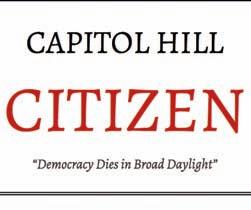
said “no one country can be the plaintiff, the prosecutor and the judge” in this case. His compatriot, law professor Robert Black, thinks Mas’ud can still “get a fair trial” in a U.S. court. The professor believes that U.S. prosecutors must prove, beyond any reasonable doubt, that Mas’ud made the device that destroyed the jumbo jet on that cold December night in 1988, that his bomb, and no other, caused the disaster and that Mas’ud knew that his bomb would be used for that purpose.
Professor Black, the primary figure behind the previous Lockerbie bombing trial in Camp Zeist under Scots law in The Netherlands, thinks it is not “essential” for U.S. prosecutors to show how the bomb got on the plane in order to get a conviction. In such a scenario the evidence to convict Mas’ud will rest, heavily, on the analysis of the fragment of circuit board that the U.S. claims was part of the timer that set the bomb off in midair. That tiny fragment, U.S. investigators claim, was found in a Scottish field where debris from the plane was scattered. However, since that first Lockerbie trial, evidence has emerged demonstrating that the fragment was actually planted to frame Libya.
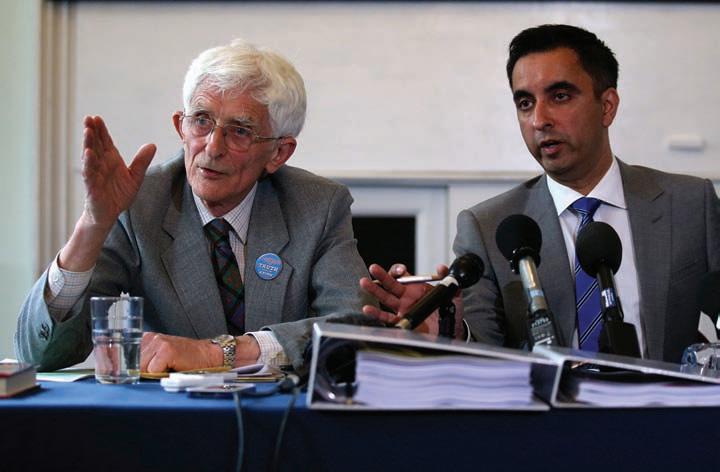
George Thompson, a former Scottish police officer turned private investigator, who has worked extensively on the case, claims to have the evidence to show exactly that. Thompson told me that he is ready to be a witness in the upcoming U.S. trial, whenever that might be.
If convicted, Mas’ud is certain to face life imprisonment. In his first court appearance on Dec. 12, prosecutors told him that they will not be seeking the death penalty. U.S. Former Attorney General Barr, in a BBC interview published the next day, said Mas’ud should receive the death penalty. Barr also said that Mas’ud’s alleged confession, should be admissible in court, despite concerns by others that it may have been coerced.
Mas’ud’s trial could take months to start and weeks to end. Regardless of the outcome, most Libyans believe it will not bring us any closer to the truth about Lockerbie. ■







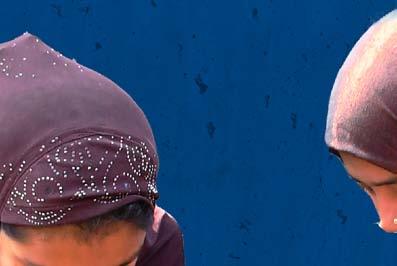




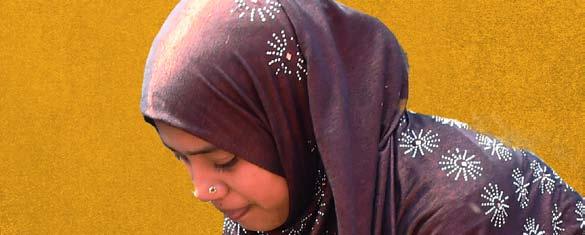






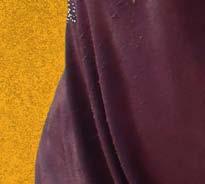








its attention on the September 2022 Shanghai Cooperation Organization (SCO)’s annual gathering in the ancient city of Samarkand in Uzbekistan. The gathering took place amid an emerging cold war, with heated tensions between the West and the SCO’s two key members: Russia and China.
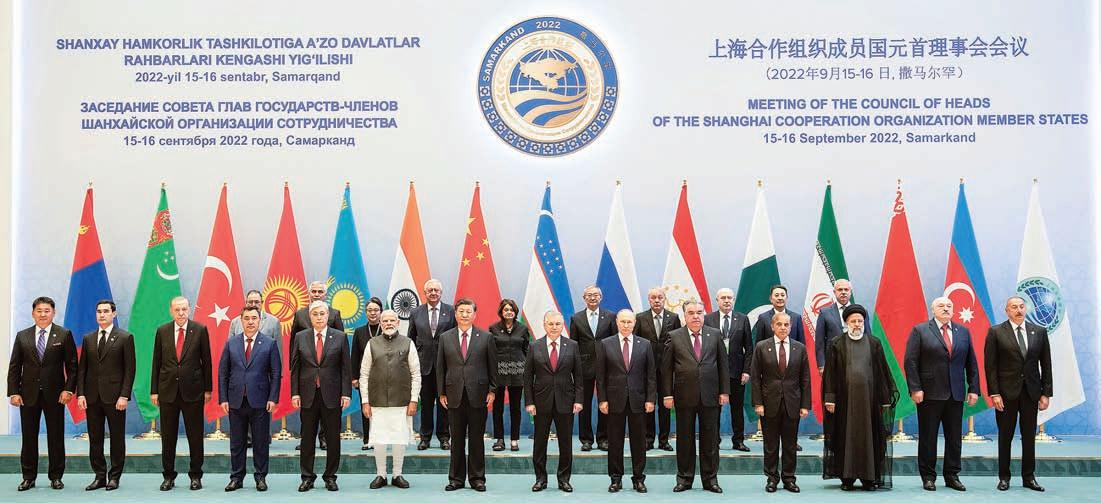
The formal inclusion of Iran as a permanent member of the organization, scheduled to occur by April 2023, contributed to the perception of an ever-greater divide between the East and the West.
Tehran has long sought to become a member of the SCO and has held the status of observer state since 2005. Last year, finally, the organization accepted Iran’s application to formally join the grouping and on Sept. 15, Tehran signed a memorandum of obligations to join the organization with full membership if all goes according to plan.
The SCO is a Eurasian economic, political and security alliance founded by China, Russia, Kazakhstan, Kyrgyzstan, Tajikistan and Uzbekistan in 2001. Since then, it had only expanded once in 2017, accepting India and Pakistan as two new members.
Iran has presented the Samarkand summit as a great diplomatic triumph on the political and economic front, although many analysts
Stasa Salacanin is a widely published author and analyst focusing on the Middle East and Europe. He produces in‐depth analysis of the region’s most pertinent issues for regional and international publications including the Al Jazeera Center for Studies, Middle East Monitor, The New Arab, Gulf News, Al Bawaba, Qantara, Inside Arabia and many more.
remain cautious about Iran’s actual gains and benefits, at least in the short term.
While Iran’s recent inclusion may now be seen through the lens of the emerging cold war and growing tensions between China, Russia and the West, Dr. Julia Roknifard, assistant professor at the School of Politics, History and International Relations at the University of Nottingham Malaysia, thinks that Russia’s so-called special military operation in Ukraine and the escalation of tensions that ensued was not the entire reason Iran’s membership in the SCO is finally being approved. She recalls that Tehran’s application was made back in 2008 but not given traction until last year.
Until recently, Dr. Roknifard explained, some SCO members, including Russia, preferred to avoid inclusion of a state that is an antagonist to the West, and to the U.S. in particular, in hopes of maintaining or strengthening their own relationships with the West. Moreover, she recalls that there were other obstacles, like Iran’s frictions with some of the regional players, including Uzbekistan, which while it was led by Islam Karimov feared politicizing Islam. But now, she noted, “those obstacles are removed and ambitions by the two leaders within the SCO—China and Russia—to flirt with the West, in order to improve the situation on that front, have been given up.”
This is why the SCO is increasingly seen as an anti-NATO bloc, especially after the outbreak of war in Ukraine when Russia tried to present the regional organizations, especially the SCO, as an anti-Western forum. The inclusion of Iran, as another anti-Western member, is thus not surprising, as many observers believe that it will just amplify the anti-Westernism.
From the Iranian perspective, the quest for membership in the SCO responds perfectly to its policy shift to pivot to the East. Iran is attempting to lower the effects of sanctions by improving relations with its neighbors and pursuing ever-closer strategic ties with Russia and China.
Yet, it is highly uncertain how much Iran will benefit from the membership and, more importantly, whether joining the SCO will significantly improve its economic situation and amortize the effect of the U.S.-imposed sanctions, in case a new nuclear deal is not achieved. Iran’s trade with the SCO member states surpassed US $37 billion in 2021, which accounted for about 30 percent of the country’s total foreign trade.
The nuclear deal, in Roknifard’s opinion, has a very slim chance of being reinstated or renegotiated given all the circumstances. She thinks that since Iran is always looking for new channels to procure what it needs for self-sustenance and to safely export its oil, as well as other items, the SCO membership may offer an effective system to provide for those needs. “You can expect the inclusion of Iran to raise its political profile, providing more credibility for the state when it embarks on dealing with the SCO members and beyond the group,” she told the Washington Report. While Western experts believe that the SCO format is weak, as it is primarily a security and geopolitical organization that lacks any formal economic mechanism to boost trade amongst members, Iran’s membership offers a diplomatic forum for pursuing closer ties to Central Asia and beyond, while Central Asian countries see Iran as a potential transit hub.
Therefore, many observers see the SCO as a platform for expanding bilateral relations but that it simply lacks tools that could effectively respond to Iran’s long-lasting economic hardships. Nevertheless, “inclusion to the SCO strengthens Iran’s image as a responsible and reasonable player and helps promote better communication channels, based on which it is going to advance its economic interests,” Roknifard noted.
Even before becoming a full member of the SCO, Iran already indicated that it strongly desired to pursue stronger relations with China and Russia, the two most powerful SCO members.
Over the past few decades, China and Iran have developed a broad and deep partnership, especially in the field of energy and defense cooperation, as well as geostrategic balancing against the United States. China has become Iran’s most important oil and trading partner. Moreover, last year, the countries signed a 25-year agreement that would include an economic and security partnership paving the road to huge Chinese investments, especially in the country’s infrastructure and energy sector.
Full membership in the SCO will also strengthen Tehran’s ties with Moscow, which have already become exceptionally close, particularly after the events in Ukraine. While their mutual trade turnover increased by 81.7 percent in 2021, reaching $4.035 billion, according to the Russian Federal Customs Service (FCS), their goal is to increase it to $40 billion.
There have been many debates regarding whether the SCO can provide a platform for resolving regional differences among the organization’s members and associated partners. Some observers see the inclusion of Iran as step that will increase the image and the value of the SCO as a regional organization. It may even contribute to lowering tensions between some of their members such as Iran and Saudi Arabia (which is also a dialogue partner of the SCO). Others remain reserved about the realistic reach of the SCO in address-
ing regional problems, pointing to the case of India and Pakistan, which have not been able to move forward on their longlasting disputes over Kashmir.
Roknifard thinks that a lot of time and effort is needed to build cohesion before the SCO can become a serious platform for negotiations of the sort that are needed between Iran and the Kingdom of Saudi Arabia. She thinks that at this point, it would appear more effective for Iran and the Kingdom to resume their negotiations toward rapprochement on a bilateral basis.
In her view, resolving regional issues will depend on further developments within the SCO and its ambitious plan of acquiring new members and dialogue partners. “One can be cautiously optimistic about the SCO providing a platform for a dialogue, but to expect that resolution of many problems would shift from a bilateral to multilateral basis is premature,” according to Roknifard.
Nevertheless, despite objective limitations, Iran’s membership to the world’s largest regional organization, which consists of 40 percent of the world’s population and 30 percent of global gross domestic product (GDP), is certainly a diplomatic triumph for Tehran. Membership will improve its international standing and be a significant step toward pulling out of the U.S.-imposed isolation. It will certainly strengthen its bargaining power with Washington. ■
agreements. The implementation of the 25year agreement, which was touted as being worth $400 billion and involved Iranian oil, Iranian banking, telecommunications, ports and other economic projects, has been left in limbo.

Why have bilateral economic deals not been implemented?
to swirl about the future of the bilateral relationship in light of recent moves by China’s president that Iran considers unfriendly to its interests.
Amid widespread protests in Iran, the Islamic Republic is losing one of its major allies, China. In recent years, Iran turned toward China. The two countries signed a 25-year cooperation agreement on March 27, 2021, and Iran signed a memorandum of understanding to become a permanent member of the Shanghai Cooperation Organization in September 2022. Although this might appear to signal bilateral rapprochement, the Iranian government has not gained tangible economic benefits from the
Two issues have made Iran an unattractive investment partner: its presence (together with North Korea) on the Financial Action Task Force’s (FATF) blacklist and the inability of its negotiators to salvage the Iran nuclear deal, the Joint Comprehensive Plan of Action (JCPOA) under Iran’s President Ebrahim Raisi’s administration.
Iranian officials regard China as the only JCPOA member that can give Iran an economic lifeline in the face of U.S. sanctions, but China seems to be moving away from Iran and toward Iran’s nemesis, Saudi Arabia.
For many years, Iran has insisted that it will never negotiate ownership of its islands. But in a joint statement issued by China’s leader and the Persian Gulf Cooperation Council rulers during President Xi Jinping’s visit to Saudi Arabia in December 2022, both sides affirmed “support for all peaceful efforts, including the initiative and endeavors of the United Arab Emirates to reach a peaceful solution to the issue of the three islands: Greater Tunb, Lesser Tunb and Abu Musa, through bilateral negotiations in accordance with the rules of international law, and to resolve this
A product manager for the UNV Chinese video surveillance manufacturing company at the booth of Uniview Tech‐nologies at the 19th International Police Safety and Security Equipment Exhibition in Tehran, Iran on Oct. 18, 2022. PHOTO BY MORTEZA NIKOUBAZL/NURPHOTO VIA GETTY IMAGESissue in accordance with international legitimacy.”
And China took one more step: It mentioned Iran in the context of “respect for the principles of good neighborliness and noninterference in the internal affairs of states.”
This was the first time that China expressed an opinion on the three islands. Iranian Foreign Minister Hossein Amir-Abdollahian wrote in Chinese on his Twitter account that “the three islands of Abu Musa, the Lesser Tunb and the Greater Tunb are inseparable parts of Iran and belong to the motherland forever.” President Raisi expressed irritation with the joint GCC-China statement: “Iran wants China to review its position in this regard.”
Some analysts believe that the government soft-pedaled its dissatisfaction with Beijing; Iran’s foreign ministry did not use the word “summoning” to describe the appearance of China’s ambassador in Iran’s foreign ministry. (The Iran news agency described it as a “visit.”)
Beijing has tried to mollify the Islamic Republic after its joint statement with the Gulf
Cooperation Council. Xi sent Chinese Vice Premier Hu Chunhua to Iran. However, some believe that the choice of envoy—an official who had been recently removed from the top echelons of power—could only be seen as an insult to Iran. The Chinese vice premier maintained that Beijing always respects Iran’s sovereignty and territorial integrity. However, he did not retreat from China’s stance in the joint statement with Arab countries about negotiations for ownership of the three islands and Iran’s regional activities.
China’s new stance toward Iran triggered domestic reactions. Iran’s Arman Daily newspaper ran a front-page article supporting Taiwanese independence, and other newspapers in Iran published articles against China. Some Iranians took to social media to express their dissatisfaction. Several publications wrote that since the Chinese government has refused to apologize, Tehran could retaliate by supporting Taiwan’s independence.
It seems that the widespread protests around the country, driven by Mahsa
(Advertisement)
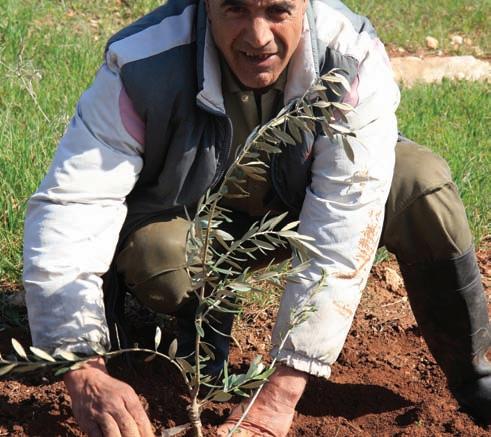

Amini’s death in police custody, as well as economic sanctions are causing Iran’s global position of weakness. The Iranian government has never been so isolated since the Iran revolution in 1979.

China has little to benefit from the 25year economic agreement, and now it looks at the unstable situation of its partner and has few hopes that the relationship can be salvaged in the short term.
Domestic protests in Iran that some call a revolution could affect future relations between Iran and its allies, such as China and Russia. China, which has its own domestic problems, clearly sees the Arab Gulf countries as offering more than can be expected from Iran. Closer relations with Washington’s Arab allies could also benefit China. In addition, recent positive diplomatic exchanges between Washington and Beijing make it unlikely that the Chinese will risk completely alienating Washington by unreservedly supporting Tehran. The end result is that Iran can no longer consider Beijing a stalwart ally. ■
SIX DAYS AFTER MALAYSIA’S Nov. 19 general election, Pakatan Harapan (PH; Alliance of Hope) leader Anwar Ibrahim gained the premiership. The PH coalition had campaigned against corruption within the Barisan Nasional (BN), the coalition dominated by the United Malays National Organization (UMNO), which had been part of the previous administration. After the election, however, the PH chose BN as its partner to form a unity government.
The general election was called early. Many in the UMNO felt confident of winning following a string of successes, including edging back into government following the breakdown of the coalition that had defeated it in 2018 and victories in state elections in Johor and Melaka. Canny observers pointed to the divisions among the opposition that had enabled those successes and the low per-
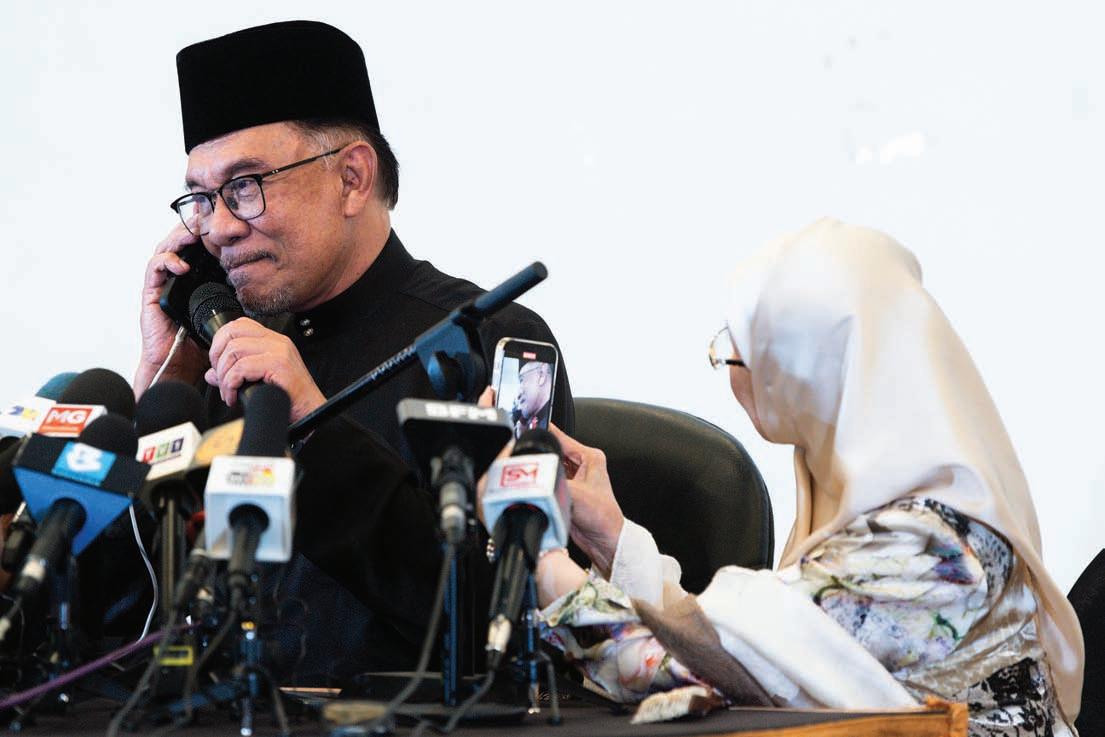
centage of votes won by BN candidates, but this did not prepare BN for the magnitude of its defeat: its representation in the 222seat parliament fell from 41 seats to 30. This defeat (the second since 2018) seemed to seal the UMNO’s loss of its 60-year dominance of Malaysian politics. PH won 82 seats, down from 90, but enough to make it the largest coalition in parliament. The Perikatan Nasional (PN; National Alliance) raised its tally of seats from 48 to 73. The PN consists mainly of two parties: a party of former UMNO members and the Malaysian Islamic Party (PAS). PAS more than doubled its representation (from 18 to 49 seats); it is now both the largest single party in Malaysia’s parliament and also the dominant party within PN.
PAS’ election campaign was designed to take account of different constituencies of potential support. In the conservative religious Malay heartlands of Kelantan and Terengganu in Malaysia’s northern peninsula, it campaigned under its own flag and stressed
its Islamist credentials, but in regions where the populations are more mixed and less religious, it operated under the PN flag and put a reduced emphasis on its own distinctive policies. In a stronger position than it has ever been before, PAS may turn out to be the big winner in this election, but it will be challenged to come up with policies and tactics that could further increase its strength.
With no single party or coalition attaining a majority, there were bound to be efforts to put together a coalition government and a PN/BN alliance looked quite possible initially, but in the end, Anwar Ibrahim put together a unity government with the BN and support from the major party in Sarawak, Eastern Malaysia. He is certainly pleased to have done so, 24 years after breaking with UMNO and two years after the collapse of the coalition government elected in 2018, in which he had been due to take over from Dr. Mahathir Mohamad. However, having campaigned for clean government and against corruption since the 1990s, his readiness to bring back into government the very coalition that had been responsible for most of the abuses that he lambasted has disturbed many of his supporters, particularly the young people who PH courted during the election. Many of them were first-time voters, including 18- to 21-year-olds enfranchised by a 2019 constitutional amendment.
Among those who sent messages of congratulations to Anwar Ibrahim when he became premier were Ismail Haniyeh, Hamas member and former prime minister of the Palestinian Authority, and Hamas leader Khaled Mashal. Ibrahim said of his video call from Haniyeh, “Apart from congratulating me on my appointment as the country’s 10th prime minister, he also praised the dedication and commitment of the Malaysian people to ensure a smooth, democratic and peaceful transition of the leadership.” Responding to these messages, he said, “Malaysia remains committed and reaffirmed its unwavering support and profound solidarity to the Palestine people and their long-standing struggle.”
Before Anwar Ibrahim’s years in UMNO (1982-1998), he was a leading member of
the Malaysian Islamic Youth Movement, which was influenced by and had connections with the Muslim Brotherhood. Hamas emerged from the brotherhood’s Palestinian branch in 1987.

In December 2022, Indonesia’s parliament approved changes to the country’s criminal code that would criminalize sex outside marriage and cohabitation by couples; make promotion of contraception illegal; and reinstitute a ban on insulting the president, vice-president, state institutions and the national ideology of Pancasila (five principles, going back to the foundation of independent Indonesia). Previous attempts have been made to introduce these changes, including in 2019, when the proposals were met with large demonstrations and President Joko Widodo asked parliamentarians to drop the planned legislation pending further study of the issues involved.
This time, the legislation was passed with little public opposition and with backing from all parties in the Indonesian parliament. There was limited time for opponents to rally support and organize against it. As to the parliamentary parties, the more conservative sense they are onto a vote winner and the rest, while understanding full well that many Indonesians don’t support the legislation, sees no electoral advantage in espousing what would still be a minority cause.
At the time of writing, the president had not yet signed it into effect. If he does, it remains questionable whether these repressive measures would even be enforceable. The criminalization of sex outside marriage would make homosexual sexual relations into punishable offenses, whereas at present, they are not generally subject to legal action (despite some prosecutions under a broadly worded anti-pornography law). Probably millions of Indonesians of different sexual orientations cohabit without being married. The provision making it illegal to insult politicians will also be hard to enforce: Since the overthrow of the Suharto regime,
Indonesians have become accustomed to being able to voice their opinions of politicians, in or out of office, whoever they are, and however likely they might be construed as insulting them.
The new measures have been most strongly promoted by parties that claim to be promoting Muslim values, in a country where religious conservatism has been making advances, despite its secular constitution and a reputation for religious tolerance. It may be a sign of the times that nonreligious parties, which won 404 of the 575 seats in the 2019 elections for the People’s Representative Council, docilely gave their support to laws that would criminalize millions of Indonesians, draw international criticism and hit Indonesia’s tourism trade, which has barely revived from the impact of the coronavirus pandemic and lockdown. ■
The New Jersey chapter of American Muslims for Palestine (AMP) held a conference titled “Liberating Palestine: The Time is Now” at Rutgers University’s Newark, NJ campus on Jan. 28. The event, which featured a bazaar, Palestinian art and entertainment and several panel discussions, was both a celebration of Palestinian culture and a call to double down on efforts to advance the liberation of the Palestinian people.
Harsh critiques of movements to normalize relations with Israel were frequent throughout the day. Sayel Kayed, a member of AMP-NJ, noted that interfaith movements can be used as mechanisms to whitewash Israeli human rights violations. Such initiatives, increasingly organized by pro-Israel groups, often send delegations of Christians or Muslims to Israel and give them a sterilized view of the “conflict.” In addition to winning support for Israel among participants, the trip organizers and the Israeli hasbara network use the delegations as propaganda to show that Israel welcomes all people, not just Jews.
Kayed said it’s important to boycott these disingenuous initiatives, and to instead engage with organizations genuinely committed to Palestinian rights. While most pro-Israel organizations classify boycotts of Zionist groups and goods as anti-Semitism, he noted that Zionists come from all backgrounds, including Jews, Christians and Muslims (as evidenced by the Abraham Accords). Thus, he said, there is a clear distinction between intolerable anti-Semitism and justifiable anti-Zionism.
Beyond being careful not to legitimize Israel, Kayed encouraged attendees to become more active with engaging their members of Congress, even if they have a pro-Israel orientation. “We’re not making enough calls, emails or meetings” with elected officials, he said, noting that the pro-
Israel lobby is constantly in the halls and offices of Congress. He also encouraged proPalestine groups not to let members of Congress use the community for photo ops, like visiting a mosque on a religious holiday, even though they refuse to engage the community on Palestine.
Nerdeen Kiswani, an activist and recent graduate from CUNY Law, discussed the depths pro-Israel groups go to attack and

among her peers. “I was overwhelmed with the support I was getting” from fellow students, she said, noting that she became more popular on campus with each attack. She said she took each affront as an opportunity to personalize the Palestine issue and teach others about how Israel and its supporters treat Palestinians from Jerusalem to New York.
Kiswani said her ordeal taught her the importance of “being proactive, not just reactive.” While this is hard due to the constant, well-funded attacks, she said staying focused on her goals helped her not become distracted or discouraged. Ultimately, her focus paid off, as the CUNY Law faculty passed a pro-BDS resolution one day before Kiswani’s graduation—and she was chosen by her peers to deliver a commencement address.
defame Palestine activists on college campuses. “Zionist organizations make it their mission to make you feel afraid,” she noted. Due to her outspoken advocacy on campus, Kiswani was relentlessly targeted by the Israel lobby: the Act.IL app organized a campaign that resulted in 19,000 emails being sent to her school demanding that she be expelled; and in 2020, the group Stopantisemitism.org named Kiswani anti-Semite of the year. “They made it their mission to take me down,” she said. “It was unrelenting attack after attack for three straight years.”
Despite their best efforts, Kiswani said the Zionist groups failed to delegitimize her
Mohamad Habehh, AMP’s director of development, said it’s important for campus (and all) advocates to be careful about what they say and who they work with, because pro-Israel groups are constantly looking for ways to entrap and smear Palestinian activists. “All they need is one thing, and they’ll never leave you alone,” he noted. Nonetheless, he said organizers play a critical role in the movement, as they inform others about what is happening in Palestine. Citing an article from the Israeli newspaper Haaretz, he pointed out that the more people know about Israel, the less they like the country. Meanwhile, the more people know about Palestine, the more they support Palestinians.
On this note, Lamis Deek, a human rights attorney, stressed the power of the average person to make a difference—and the even greater power and potential of people working en masse for Palestine. Both the facts and the law do not comport with the Zionist narrative, she said, meaning that convincing individuals, companies and governments to support the Palestinian cause is an entirely achievable (yet challenging) prospect.
activists should be encouraging the U.S. government to block visas to illegal Israeli settlers and sanction Israeli groups that facilitate human rights violations. She also advised activists to demand that the IRS investigate U.S. non-profit organizations that help fund violations of human rights and international law in Palestine.
In order to form effective movements, Shamas said activists will have to grapple with forming “broad based and uncomfortable” coalitions with groups who are not natural allies. She also encouraged activists to engage and teach those who are not familiar with the Palestinian struggle. “We need to do a lot of thinking about how we’re going to make compelling arguments to those folks,” she said.
Dale SprusanskyActivist Miko Peled introduced Amro and began by inviting him to describe Hebron. It is clear that he loves the city (“the most beautiful Palestinian city”) and its residents. In the old city of Hebron (a UNESCO World Heritage site), residents must place nets over their doorways to catch the garbage that settlers on upper floors throw down on them regularly. The physical and psychological terrorism are unrelenting.
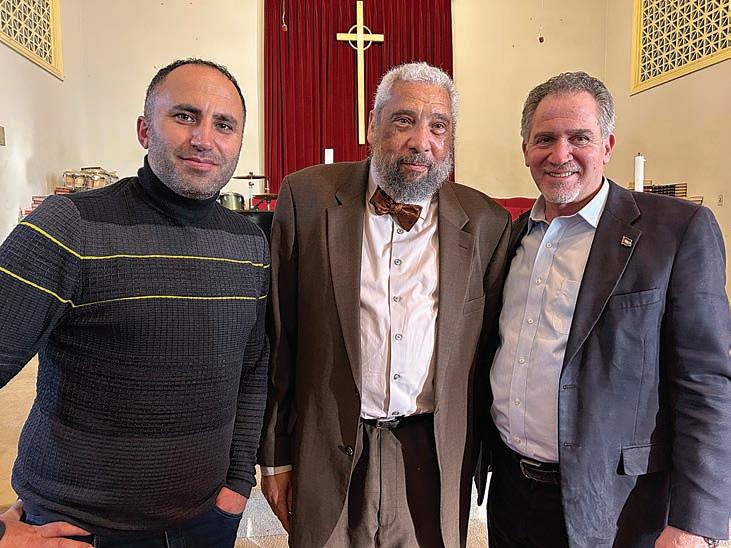
The perpetrator of the 1994 massacre of 29 Palestinians in Hebron’s Ibrahimi Mosque, American-Israeli doctor Baruch Goldstein, is considered a hero by the new Knesset members. About two years after the massacre, the Hebron Redeployment Agreement was signed, which split Hebron into two sections: H-1, to be under the control of the Palestinian Authority, and H-2 (the old city of Hebron), under the control of Israel. About 20,000 Palestinians and a few hundred Israeli settlers live in H-2.
get essential services. Since an ambulance requires a permit to reach Palestinians in the old city, you can only hope that you never have a medical emergency. Many Palestinians have been unable to live under these conditions, and they’ve moved away.
“The settlers don’t physically throw you out of your house, but they make it impossible for you to stay,” Amro noted. But that could change: since the recent Israeli elections, emboldened settlers run through Hebron chanting, “burn Hebron.” Throughout Palestine, in fact, settlers go to Palestinian neighborhoods with specific messages of doom: “We will bring a second Nakba” and “we will do to you more than what they did to you in 1948, we will finish the job.”
Issa Amro:
During the last weekend in January, Palestinian human rights defender Issa Amro spoke to audiences at Busboys and Poets and Plymouth Congregational United Church of Christ in Washington, DC. Amro, a 42-year-old engineer and activist in Hebron, is a cofounder of the Youth Against Settlements organization, which works with Hebron’s residents to resist the violence of the Israeli settlers living in their midst. Hebron’s Jewish settlements spawned two of the more openly fascist members of the new Israeli government. Bezalel Smotrich, leader of the Religious Zionist party, is finance minister and oversees the Civil Administration, which approves settlement building and controls Palestinian lives; Itamar Ben-Gvir, an Otzma Yehudit (Jewish Power) party leader who was once convicted of racism, is now national security minister, with responsibility for the police and an enormous budget at his disposal. Amro, who is committed to nonviolent resistance and has been arrested too many times to count, has had interactions with both. “These are dark days in Palestine and especially in Hebron,” he told the Busboys and Poets audience on Jan. 27.
Living under such conditions is clearly exhausting, not to mention scary. “You don’t feel safe in your own home, and you certainly don’t feel that your family members are safe,” Amro said. Israel established 22 checkpoints in an area less than one square kilometer, as well as 100 movement barriers. They also make it impossible to
Amro explained that the settlers are working to remove the Palestinian identity of Hebron through such things as pressuring residents to leave and changing place names to Hebrew names and putting street signs in blue and white, the colors of the Israeli flag. Shuhada Street, the main commercial thoroughfare, is closed to Palestinians.
Amro said the acknowledgment that Israel is an apartheid state by human rights organizations was late in coming, consid-
ering that the evidence has been in plain sight for a long time: “We live under Israeli military law, and the Israelis living next to us live under Israeli civilian law,” he noted. “This is the precise definition of apartheid: two sets of laws in the same area for different people.”
The situation in Hebron is what is in store for all Palestinians in the future, Amro tells us. He sees Hebron as a microcosm of the Israeli occupation. “We are trying to counter the settler strategy to evacuate the Palestinians. We are trying to create an infrastructure for the Palestinians to remain.”
He expressed gratitude to the audience for their activism and insisted that visits from internationals break the sense of isolation that Hebron residents sometimes experience, while also giving them hope.
Although Amro was reluctant to tell the audience what to do, he rattled off a list of creative options that people could consider to express their solidarity. He urged the audience to “make fighting the occupation part of your daily routine. Every day, think about what you can do to fight the occupation and make it costly.” Media campaigns are helpful; letters to newspaper editors and elected officials are helpful. Educate taxpayers that they are giving $3.8 billion a year to fascists like Smotrich and Ben-Gvir. “And we want you to protect the human rights defenders back home. We need that from you. And we need you not to lose hope. We are all in the same fight.”
The entire inspiring talk, which includes an account of how a group of determined activists snatched a Palestinian home in Tel Rumaida out of the grip of settlers who had long been eyeing it, can be viewed at: <https://bit.ly/40cuVfQ>.—Ida Audeh
On its Jan. 11 live show, Palestine Deep Dive (PDD), in collaboration with the Foreign Press Association of New York, hosted human rights grandee Ken Roth. The former long-time executive director of Human Rights Watch (HRW) reacted to Harvard University’s decision to pull its offer to make him a fellow at the institution’s Carr Center for Human Rights Policy due to his
criticisms of Israel. A week after the interview—and following much public outrage— Harvard reversed its decision and extended an offer to Roth.
According to Roth, the department contacted him soon after he announced his retirement from HRW last year, asking if “in principle” he would be interested in a senior fellowship position. Agreeing, Roth said he was told, “look, the only formality is to get the dean’s approval.”

Two weeks following a “perfectly pleasant” conversation with the Kennedy School of Government’s dean, Douglas Elmendorf, “the Carr Center called me up and they were incredibly embarrassed,” Roth recalled. “They said, ‘the dean vetoed you because of your criticism of Israel.’”
Observing Elmendorf does not have a public position on Israel-Palestine, Roth told Palestine Deep Dive that he assumes Harvard’s backtracking was due to donor pressure. “I don’t think it was personal animus, personal prejudice,” he said. “I don’t think that was the factor. The only thing that anybody has been able to think of that’s a plausible explanation is donor influence.”
Still, questions remain. “What we don’t know is how that influence was exerted,” Roth noted. “Did Elmendorf call up certain donors and ask them their view? Did he just anticipate what their views were?”
In a Jan. 19 statement, Elmendorf insisted the initial decision to deny Roth a po-
sition was not based on donor pressure or Roth’s criticisms of Israel. “My decision was not influenced by donors,” he said. “Donors do not affect our consideration of academic matters. My decision also was not made to limit debate at the Kennedy School about human rights in any country. As a community we are steadfastly committed to free inquiry and including a wide range of views on public policy.” He added that he “made an error” by denying Roth a position.
In 2021, HRW released a damning 213page report describing in-depth the nature of Israel’s systematic oppression of the Palestinian people, with the conclusion that, beyond any doubt, Israel is practicing the crime of apartheid. “I think it’s fair to say that the recognition that the Israeli government is committing the crime of apartheid has become the mainstream understanding within the human rights community,” Roth noted. “I actually don’t know any serious human rights activist who’s involved in this issue who doesn’t believe that.”
Roth acknowledges he was “not the primary victim” of this scandal, since his clout offers him ample opportunities beyond Harvard. Rather, his concern lies with the broader issue of intimidation and academic freedom when it comes to criticizing Israel. “My concern is that younger academics are going to take a message from this episode and say, ‘oh my goodness, if I criticize Israel, that could be a career-killing move.
I could face retaliation.’ That's a horrible message to send.”
With an endowment of over $50 billion, Harvard is considered the world’s richest university. According to the Harvard Crimson, the university invests almost $200 million in companies the U.N. lists as being tied to illegal Israeli settlements in Palestine.
Roth noted the irony over Harvard’s decision: “There’s much more attention to not only the issue of academic freedom, but also Israeli human rights violations than there would be if they had just let me show up and work on my book.”
Roth told a local Boston public radio station, WGBH, that he intends to accept the reintroduced fellowship but remains uneasy about how the school responded to the controversy. “I’m still hoping that there will be a broader statement of principle coming from Harvard or the Kennedy School or both that makes clear that criticism of Israel is never a justified reason for penalizing scholars or students,” he is quoted as saying. “That’s what we really need now to make something positive out of this sorry episode.”—Palestine Deep Dive Staff
As our readers know, our annual Israel lobby conference (IsraelLobbyCon) at the National Press Club, cohosted by the Washington Report and Institute for Research: Middle Eastern Policy (IRmep), has traditionally preceded the American Israel Public Affairs Committee’s (AIPAC) Policy Conference. This conference’s timing provided added reason for many activists to travel to Washington, DC to protest AIPAC at the Washington Convention Center.
AIPAC’s 2020 conference was one of the first COVID-19 superspreaders, and in 2021 and 2022, the self-described “largest annual gathering of America’s pro-Israel movement,” boasting 15-20,000 attendees and scores of politicians from both sides of the aisle, quietly canceled their meetings. We went ahead and held ours at the National Press Club in March 2022, asking our speakers to address “Transcending the Israel Lobby at Home and Abroad,” and even added a special gala dinner the night
before. But large, establishment media such as the Washington Post and New York Times, generally avoid covering only experts critical of Israel and the lobby unless they can cover “both sides.” Unlike previous years, they did not send reporters. Even C-SPAN, which for years provided reliable coverage, ghosted IsraelLobbyCon.
As other organizations also restarted their in-person conferences last year, the Jewish Federations of North America quietly took down their announcement about an upcoming March 2023 AIPAC policy conference. The Federations’ own 2022 meeting was not open to the press and was closed to non-members.
On Jan. 9, 2023, the sounds of sirens split the air up the street from our office, coming from the Washington Hilton hotel. There were also 30 idling DC police cars surrounding the Hilton. That only happens twice a year—during the National Prayer Breakfast and when AIPAC attendees are shuttled from the hotel to the DC Convention Center for their conference downtown.
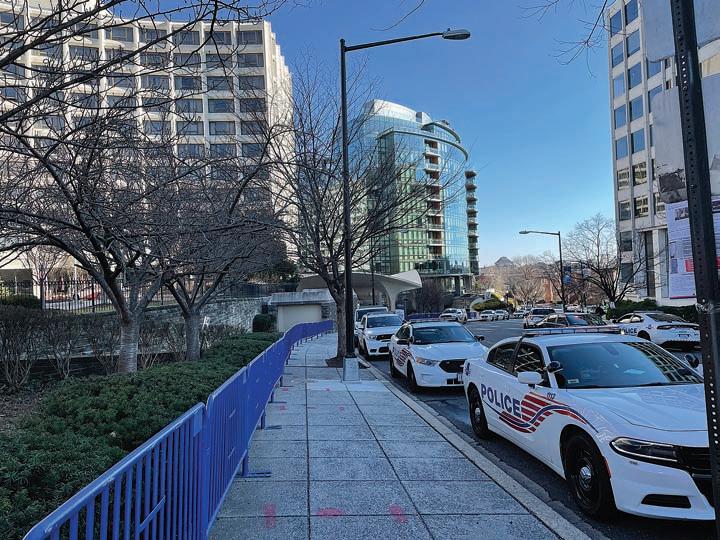
Of course, we tried to cover the Hilton event, announced only the prior week, but after going through metal detectors and showing my press credentials I was denied entry. So I missed hearing AIPAC leaders plan their 2024 congressional election strat-
egy, or U.S. lawmakers and Secretary of Defense Lloyd Austin addressing the gathering. I also missed learning how AIPAC will support Israel’s right-wing extremist parties that make up their current government. What are their plans to inspire American lawmakers to rubber stamp planned changes to Israel’s judiciary and the annexation of the West Bank?
“Have no fear,” leaders at the confab may have crowed. It will be easier now that AIPAC has its own PAC and Super PAC. AIPAC raised more than $17 million in the last election cycle to support the 365 Democratic and Republican candidates that it endorsed. AIPAC’s United Democracy Project Super PAC spent $28 million to defeat candidates, including many progressive Democrats, and promote candidates, including 2020 election-deniers.
—Delinda C. HanleyIsrael’s supporters often suggest that antiSemitism is deeply rooted within the Palestinian ethos. High-profile but unrepresentative incidents of Palestinian antiSemitism—such as Haj Amin al-Husseini, the grand mufti of Jerusalem, meeting with Adolf Hitler in 1941—typically form the
backbone of these accusations. To inject more nuance into this conversation, the Foundation for Middle East Peace’s “Occupied Thoughts” podcast recorded an episode titled “Palestinian Views on AntiSemitism from the 19th Century to the Present Day” on Dec. 22, 2022.
Jehad Abusalim, the education and policy coordinator of the American Friends Service Committee’s Palestine Activism Program, rejected the idea that anti-Semitism is prevalent in Palestine.
Placing the conversation within the history of the broader Arab world, Abusalim highlighted the uproar that took place in Beirut in 1869 when a booklet pushing antiSemitic claims of Jewish blood libel began to circulate. Leading Arab intellectuals “waged a powerful campaign asking Ottoman authorities to confiscate this book and to search for the author, and to basically end the existence of this piece of literature that they found disgusting and ridiculous,” he said.
When Nazism swept Europe during World War II, many Palestinians and other Arabs again condemned anti-Semitism. During the war, the Palestine Broadcasting Service regularly disseminated pro-Allied information, Abusalim noted. In one widely
circulated interview, Egyptian poet and intellectual Ibrahim Abd al-Qadir al-Mazini condemned Nazism as being fundamentally opposed to the Arab and Islamic values of hospitality, generosity and care for the weak.
Similarly, Abusalim pointed to the work of Palestinian intellectual Muhammad Najati Sidqi, who in 1940 published The Islamic Traditions and the Nazi Principles: Can They Agree? The book warned that “Nazism is an evil ideology that Arabs and Muslims shouldn’t adopt,” Abusalim said.

This history of fighting antiSemitism is often ignored by mainstream news outlets and analysts. While al-Husseini’s warm relations with leading Nazis should not be dismissed, it must be placed within its proper context by noting that he did not represent the consensus of Palestinian thinking, Abusalim emphasized.
The violent creation of the state of Israel in 1948 opened a new, complicated chapter in Arab-Jewish relations and did lead to an increase in anti-Semitism in the region, Abusalim acknowledged—though he again stressed that context is essential. Every day, he noted, Palestinians experience violence, oppression and occupation at the hands of a government that claims to represent all Jewish people. Despite this, most Palestinian individuals and entities reject anti-Semitism, but some inevitably fail to distinguish between Judaism and the acts of the Israeli state. “It can be challenging to promote this nuance while this violence is being committed in the name of this [Zionist] narrative and in the name of these ideas that say this is a Jewish state for the Jewish people,” Abusalim said.
The most prominent example of antiSemitism in modern Palestinian society is the 1988 Hamas charter, which borrowed from The Protocols of the Elders of Zion Abusalim believes the receptiveness to such anti-Semitism reflects the trauma and shock Palestinians felt after losing wars in
1948, 1967 and 1973 to the new Zionist state. “In a moment where people were trying to make sense of defeat” at the hands of a new country, such conspiratorial thinking gained traction, he said.
Abusalim said one tragic irony is that the expulsion and occupation of Palestinians by Israel separated many Palestinians from their intellectual tradition that opposed antiSemitism. “Due to the Nakba of 1948, Palestinians lost touch with this intellectual tradition, because we lost our newspapers…the Palestinian library was looted and destroyed in 1948,” he noted. Abusalim also pointed out that during the 1970s and 1980s, Israel heavily limited Palestinians’ ability to engage in political conversations, travel and read. “There are psychological and emotional factors behind why people who are cut off from the rest of the world, who don’t live in a place with a thriving cultural and literary scene can resort to such literature [as The Protocols of the Elders of Zion],” he said.
Hamas removed blatantly anti-Semitic language from its 2017 charter. The new document says, in part, “Hamas affirms that its conflict is with the Zionist project, not with the Jews because of their religion.” This, Abusalim said, shows that Palestinian organizations do evolve and should not be forever tied to one view or statement.
Abusalim, who is completing his Ph.D. in the History and Hebrew and Judaic Studies joint program at New York University, concluded by emphasizing that incidents of Palestinian anti-Semitism must not be swept under the rug, nor be exaggerated or brought up in bad faith. “People still use the mufti while dismissing all the other examples of Palestinian resistance to anti-Semitism, to Nazism, to fascism,” he said. “I think these obsessions aren’t constructive in making sense of the Palestinian experience and why people make certain choices.”—
Dale SprusanskyThe Tahrir Institute for Middle East Policy held a webinar on Jan. 25 to commemorate the 12th anniversary of the 2011 Egyptian revolution, which deposed long-time strong-
Palestinian intellectual Muhammad Najati Sidqi’s writings during World War II strongly opposed the genocidal anti‐Semitism of the Nazi Party.man President Hosni Mubarak. Panelists discussed the state of the opposition movement within the country amid the repressive policies of President Abdel Fattah el-Sisi’s government.
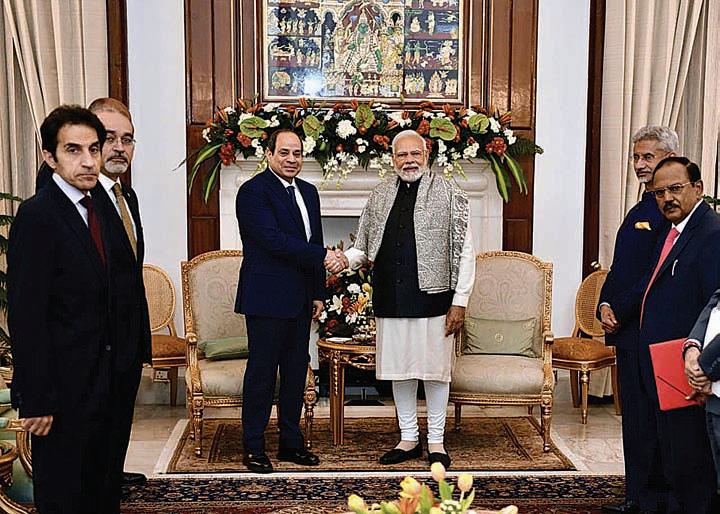
Nancy Okail, the president and CEO of The Center for International Policy, noted that Egyptians choosing to merely share testimonies and stories from the revolution is “an act of resistance,” since doing so often contradicts the state’s telling of history. After overthrowing the democratically elected president, Mohamed Morsi, via a military coup in 2013, Sisi has returned Egypt to authoritarian rule and worked to systematically stifle any space for political expression. As such, his government aims to suppress memories of the 2011 populist revolt against Mubarak. “The Egyptian government is still doing all that is in its power to dominate and manipulate the narrative about the revolution,” Okail commented.
Abdelrahman Mansour, an Egyptian activist currently living in exile, said that while Sisi enjoys near absolute control over the country, he is ultimately vulnerable due to Egypt’s struggling economy and the growing (albeit suppressed) sense of frustration among the country’s more than 100 million residents. Despite his revolutionary background, Mansour is encouraging the Sisi
government to reform itself rather than step down. “We are not asking for a revolution,” he stated. “We are asking for this country to be in a better place—for the interest of everyone, including the army and Sisi.”
Just because there are not massive demonstrations in the streets does not mean people aren’t reaching a boiling point, Mansour cautioned. “People are collectively smart and hide when they think their lives are under any threat or risk” for speaking out, he noted. However, as 2011 demonstrated, frustrations can escalate into massive street movements quickly. Therefore, the government needs to “read the anger on the streets and be smart and wise” about addressing the concerns of the people, Mansour advised. Genuine civil and economic reforms are a win-win “moderate” solution that keeps Sisi in power and gives the people hope for a better future, he said.
Mansour emphasized that all actors in Egypt desperately need to adopt a forwardlooking approach, as he believes the country is stalled and lacks a national plan. “Sisi is stuck in 2011 or 2013, the Muslim Brotherhood are stuck in the moment of 2013 [when they were violently suppressed by Sisi’s forces] and some revolutionary groups are stuck in different moments,” he said. “To go forward, to create a new future,
we can reflect, we can think, we can revisit our memories, but also there is a need to think about the future and our current crisis.” Under the failing status quo, he warned, “no one is protected in Egypt…even the people running the country are under threat.”
Rusha Latif, the author of Tahrir's Youth: Leaders of a Leaderless Revolution, refuted two myths about the 2011 uprising. The idea that the revolution was spontaneous is “ahistorical,” she said. In the decade prior to Jan. 2011, many opposition networks and movements formed and spoke up regarding myriad issues, “building up a culture of resistance in Egypt.” However, these groups were not planning to overthrow the government until the 2010/2011 Tunisian revolution provided an unexpected “trigger” for a revolutionary movement, Latif noted.
While the revolution was successful and untied cross-sections of Egyptian society, the lack of intensive planning for the event proved problematic once Mubarak fell, as there was no unified or cohesive plan for the country’s future.
Despite the post-revolutionary infighting and struggles, Latif said it’s incorrect to portray the revolution as leaderless. Leaders did collaborate with one another during the revolution, but intentionally took a back seat because they knew their countrymen were weary of potential strongmen after decades of living under authoritarianism. At the time “everybody kind of fetishized this idea of a leaderless movement,” she noted. Ultimately, this back seat organizing was not enough to thwart the reemergence of another strongman from the ranks of Egypt’s ever-powerful military.—
Dale SprusanskyOn Jan. 11, Dr. James J. Zogby, president of the Arab American Institute, discussed political activist Ralph Nader’s radical idea to save Lebanon during his weekly Zoom “Coffee and a Column” session. Taking on U.S. corporations and lobbies to ensure consumer protections for safer cars, cleaner air and water wasn’t easy, but Ralph Nader got it done—and his radical proposal to save the failed state of Lebanon could also work, Zogby believes.
The two Lebanese Americans were confounded by a paper recently released by the American Task Force on Lebanon and the Middle East Institute that called for the Lebanese government, parliament, ministries and political parties to implement vital reforms to avoid a meltdown. “What’s troubling is the futility of calling on the very same corrupt sectarian leaders who have driven the country to ruin to reform themselves out of business,” Zogby wrote in a column published on January 9.
Nader’s memorandum outlining his radical idea states, Lebanon’s “staggeringly corrupt, sectarian government enriches a cabal of leaders…at the expense of the Lebanese people…Many of Lebanon’s political pathologies are enshrined in its Constitution which…prescribes sectarian divisions.” The Lebanese people hold the solution, Nader believes. “The people collectively retain the right to dispense with the current constitutional dispensation and provide for a successor better suited for their liberty, safety and happiness.”
Based on three decades of polling in Lebanon, Zogby has found that “substantial majorities of Lebanese, across all regions and religious groups, have little confidence in the traditional sectarian parties and lead-
ers and, more importantly, want to rewrite the Constitution to provide for oneman/one-vote representative elections. We saw a manifestation of this during the October 2019 uprising, in which over one million Lebanese took to the streets demanding that all of the old guard elites go.
“The key to Nader’s proposal for saving Lebanon is the empowerment of two groups of Lebanese who up until now have been forced to sit on the sidelines while watching a country they love die a slow death—hemorrhaging its people, wealth and hope. The proposal provides the opportunity for Lebanese civil society to petition the U.N. and then vote on a referendum to write a new Constitution. And by engaging the Lebanese émigré community in the [Nader-proposed U.N.] Transitional Authority, the proposal invests this extraordinarily successful group of Lebanese by inviting them to help reform and rebuild the institutions of the country.”
Lebanon, one of the wealthiest countries in the 1950s, has become one of the poorest today, with people begging for food in the streets. Zogby and Nader say it’s time to draft a new Constitution that ends corruption, Lebanon’s extensive patronage system and the division of the country by

sect. After Lebanon’s parliament held 11 unsuccessful sessions to elect a new president, some lawmakers staged a sit-in to demand their colleagues fulfill their duty to elect a president. Whether they succeed is unknown as we go to press.
Zogby concludes, “Some may dismiss this proposal as radical. But because Lebanon is worth saving, radical ideas, as improbable as they may seem, demand to be tried, if only because all other options have failed.” —Delinda
C. HanleyGönül Tol, the director of the Turkey Program at the Middle East Institute (MEI), discussed Turkish politics and the ever-evolving political career of President Recep Tayyip Erdogan at MEI’s Washington, DC offices on Jan. 17. Tol is currently promoting her new book, Erdogan’s War: A Strongman’s Struggle at Home and in Syria.
The scholar characterized Erdogan first and foremost as a “populist,” someone who frames politics as a “war between the ordinary masses and the corrupt elite.” Populists, she said, selectively define who “the people” are and claim to solely represent this disenfranchised majority. “This is exactly what Erdogan has been doing since he first came to power in 2002,” Tol explained. “He wanted to appeal to these marginalized groups and present himself as of the people and a true democrat.”
Over the years, Erdogan’s populist approach has resulted in him adopting many identities. He has gone from a conservative democrat to an Islamist to a nationalist, and as “a power-hungry politician….I do not think there is anything he cannot be to stay in power,” Tol said.
Erdogan’s rhetoric and actions, Tol noted, have exacerbated divisions within Turkish society. Additionally, his authoritarian policies have caused the flight of the secular population. One out of every four young Turks say they want to live abroad, she noted. In 2019 alone there were 330,000 people who left the country. “The brightest minds in the country do not see a future in Erdogan’s Turkey,” Tol said.
One reason Erdogan has managed to stay in power for so long is that he is “blessed with a weak and divided opposition,” consisting of secularists, Kurdish nationalists, liberals and others who all have “diverse agendas which at times cannot be reconciled,” Tol opined. “What unites them is their opposition to Erdogan, but they cannot come up with a strategy or common agenda that addresses the main problems of the voters.”
With a presidential election set for May, conditions in the country are ripe for an opposition victory, as inflation is surging, unemployment is high, corruption is widespread and voters are concerned about the millions of Syrian refugees in the country, Tol related.
When faced with domestic crises, Tol noted that Erdogan has often used foreign policy to reshape his image at home. “Erdogan’s domestic calculations are the driving force behind all of his foreign policy moves,” she said. “Erdogan’s foreign policy has… been first and foremost about his domestic strategy to keep his grip on the country.”
As an example, she noted that the Turkish military’s incursions into Syria have strengthened Erdogan’s image as a Turkish nationalist. “I would say foreign policy in general helped Erdogan build his autocracy, but I think that Syria was the crown jewel in his efforts to do so,” Tol argued.
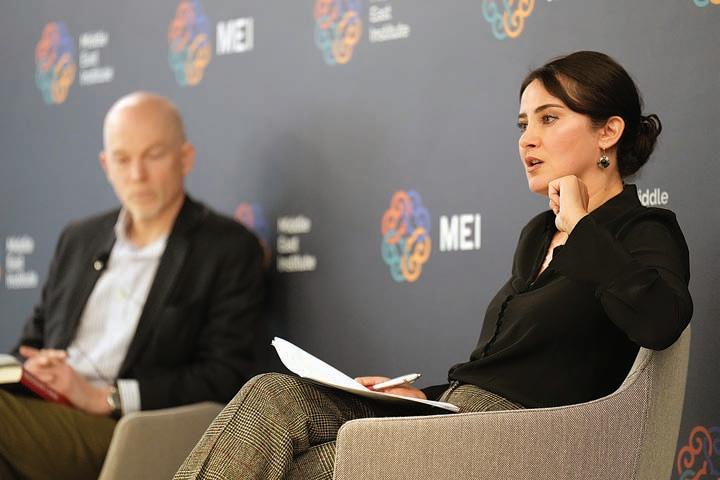
“The war in Syria...heightened Turkish nationalism and Erdogan just rode the nationalist wave.”
Elsewhere, since Russia’s incursion into Ukraine, Erdogan has grown closer to Russian President Vladimir Putin (while maintaining a posture of neutrality toward the conflict) and “relies on Putin more than ever,” Tol said. Putin, via a state-owned company, injected $5 billion into Turkey last summer for the construction of a nuclear plant in southern Turkey, she pointed out. There are also many Russian oligarchs and draft dodgers alike residing in Turkey,
she noted, “so Erdogan is making money out of this [war].”—Elaine
PasquiniOver the past few months, thousands of demonstrators mobilized by the National Solidarity Group for Iran have taken to the streets of Washington, DC to condemn the Islamic Republic of Iran’s violent response to ongoing nationwide protests. The public marches have been held in numerous locations, including outside the White House, the U.S. Capitol and the Lincoln Memorial. “Every Saturday, we change the location of the demonstration in Washington, DC to inform public opinion and the international media about what is happening in Iran,” explained Siamak Aram, an organizer of the rallies.
In addition to local grassroots activists, the rallies have attracted some famous Iranian artists, such as guitarist Babak Amini and singers Faramarz Aslani and Ebrahim Hamedi (better known as Ebi).
Not aiming to merely secure concessions or reforms from the Iranian government, most of the protesters in Washington, DC have called for the toppling of the Islamic Republic. Chants at the rallies have included, “one solution, revolution,” and “we want freedom.”
While protesters have largely focused on Iran’s human rights abuses following (and
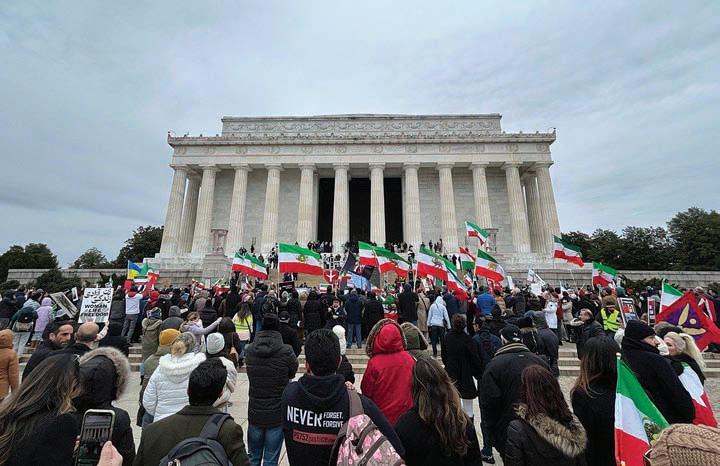
including) the Sept. 2022 death in police custody of Mahsa Amini, who was arrested for violating the country’s hijab laws, they have also criticized the Biden administration’s policy toward Tehran. The rallies have included chants and banners demanding that the U.S. government cease nuclear talks with Iran, arguing that the negotiations give the Iranian government legitimacy, stability and an avenue to desperately needed financial resources.
Protesters have also targeted fellow Iranian Americans who support diplomacy with Iran, namely the National Iranian American Council (NIAC). Indeed, chants have included, “one, two, three, four, NIAC supports dictator.” NIAC has rejected such criticisms, stating that they do not support or receive funding from the Iranian government and view the nuclear deal as an important way to improve the everyday lives of Iranians by lifting stifling sanctions and preventing a devastating war.
So far, U.S. officials have not officially declared an end to the nuclear negotiations, however the talks appear to be, at best, on life support. Video has recently emerged of President Joe Biden telling a supporter that the deal “is dead, but we’re not going to announce it.” For now, the administration seems inclined to technically keep the talks alive while simultaneously showing strong support for Iranian protesters.
Given their momentum and deeply held beliefs, it seems unlikely the Washington, DC protesters will relent on their demands for regime change any time soon, especially if the cycle of protesting and repression continues in Iran.
Mohammad Javad MousavizadehIn what has become an annual event, on Jan. 11 activists from Witness Against Torture (WAT) and the National Religious Campaign Against Torture held a “Close Guantánamo Vigil” outside the White House to mark the 21st anniversary of the extrajudicial prison’s opening.

Since it was first opened by the Bush administration in 2002, the facility has seen 779 detainees pass through, most of whom were never charged with or convicted of a crime. Of that total, nine detainees died while in custody, with seven deaths reported as suicides. Presently, there are 35 prisoners who remain there, 20 of whom have been cleared for release but continue to be held.
Beyond the terrible human tragedy and moral costs, the practical cost of operating the prison is $540 million per year, or $15.4 million for each of the remaining detainees.
Last year, the Biden administration approved five detainees for release, but only one detainee, Saifullah Paracha, a 75-yearold “forever prisoner” was released after having been detained since 2003 on suspicion of having links to al-Qaeda. Arrested in Bangkok, Thailand, Paracha spent 19 years in detention while never being charged with a crime.
Paracha’s son, Uzair, was convicted in 2005 of assisting an al-Qaeda operative, only to have his conviction voided in 2018, in what the judge characterized as a “manifest injustice” based on new evidence debunking the witness statements used to convict him.
At the Jan. 11 protest, 35 participants dressed in orange jumpsuits with black hoods assembled in Lafayette Park across from the White House, where they heard
from Herb Geraghty, an organizer for WAT, who noted, “Guantánamo represents the worst of this country’s xenophobia. Its continued existence as an institution threatens to render meaningless Americans’ proclaimed commitment to human rights, the rule of law and basic ideas of fairness.”
Dr. Maha Hilal, co-director of the Justice for Muslims Collective, stated that Guantánamo is part of a larger post-9/11 effort to “demonize, criminalize and justify state violence against Muslims. And 21 years later—and four administrations later—we still have the problem of Guantánamo.”
James Yee, who served as a U.S. Army prison chaplain to detainees at Guantánamo, spoke eloquently from his own personal experience. Due to possessing documents from the prison upon returning to the mainland, Yee, a West Point graduate, was arrested and held in solitary confinement for 76 days and falsely accused of aiding the “terrorist enemy.” After an extensive investigation, all charges against him were dropped.
Yee spoke of how Amnesty International has described Guantánamo “as the gulag of our time,” while the American Red Cross has described the treatment of prisoners at Guantánamo as “tantamount to torture.”
The protest was closed by a prayer from Imam Saffet A. Catovic, noting how humankind is “made in the image of God and are the children of God, and as such are
entitled to dignity and respect.” He further called for justice to be done here in America and throughout the world, and for Guantánamo to be finally shut down. “This stain on the conscience on humanity, this act of horror and criminality [must] come to an end with the closing of Guantánamo,” he said.
Phil Pasquinischoolchildren in the province from attending classes, Zardari explained. The agriculture sector—the backbone of Pakistan’s economy—was also devastated. “Our farmers had five million acres of standing crops destroyed during the floods, affecting rice and cotton crops,” he noted.
Pakistan is ready to “seize this challenge, seize this moment and ensure that we create an opportunity out of this crisis” to improve the lives of everyone affected by the tragedy, Zardari emphasized. “I am convinced that with hard work and consistent engagement, we will be able to overcome this crisis.”
story for Pakistan 10, 20 years down the line is one of opportunity, and my pitch to everyone is: Get in now!”
Elaine Pasquini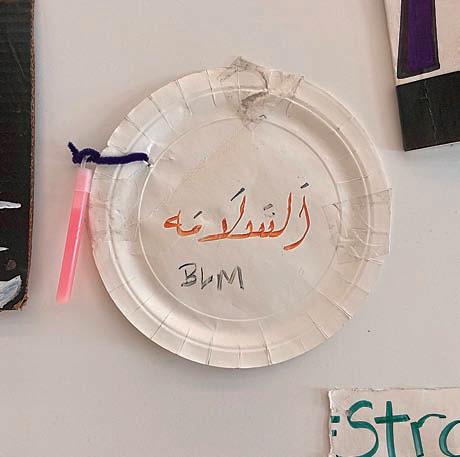
Since mid-2022, the United States and Pakistan have been engaging on a variety of issues, including climate, technology, health care, business and agriculture, Pakistani Foreign Minister Bilawal Bhutto Zardari told an Atlantic Council audience in Washington, DC on Dec. 20, 2022. Zardari is the son of former Prime Minister Benazir Bhutto and former President Asif Ali Zardari.
Amid these forward-looking discussions, Pakistan is facing many ongoing crises: the lingering COVID-19 pandemic, a struggling economy, political strife, inflation and food insecurity. But the biggest challenge for the people of Pakistan right now is a “climate catastrophe of biblical proportions,” the minister stressed.
Not only have the unprecedented floods of 2022 created a health crisis, they have also prompted an educational crisis. “In my home province of Sindh, 47 percent of our educational infrastructure has been either partially or completely damaged as a result of the flood,” preventing 52 percent of
Looking forward, Zardari believes there is a lot of untapped economic potential for Pakistan. While expanding economic ties with the U.S. is a priority, he said Pakistan sees immense opportunity within its region. “We haven’t expanded the complete economic potential between Pakistan and China, let alone Pakistan and Iran, Pakistan and Afghanistan— and through Afghanistan to the Central Asian republics,” he noted.
One definite advantage for Pakistan is its geographical location, which makes it a natural trade hub, particularly for Central Asian countries in need of seaport access. Zardari said he has had successful conversations with officials from Central Asian states on this issue.
While the continuing crises make it difficult to focus on economic connections, Zardari said economic development work must continue. “There definitely are questions about Pakistan’s political stability, economic stability, but that doesn’t mean we’re not trying to address it. Questions? Yes. Does it mean we’re shutting the door? No.”
Zardari concluded on an optimistic note: “I believe the
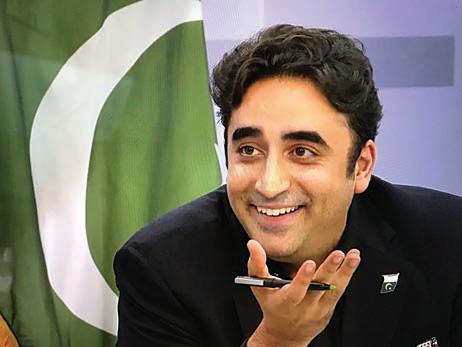
The “Black Lives Matter Memorial Fence Artifact Collection” exhibition is on display at the Martin Luther King, Jr. Memorial Public Library, in Washington, DC until Feb. 24, 2023. Nadine Seiler and Karen Irwin, co-curators of the original Black Lives Matter Memorial Fence, loaned and installed the exhibit.
The Trump administration erected a tall barricade outside the White House and Lafayette Park to restrict protests that erupted in response to the murder of George Floyd in the summer of 2020. From June through January 2021, activists hung signs, banners, T-shirts and more on the fence to protest the treatment of people of color by police. People also demanded resolutions to many social issues, such as racism, LGBTQ rights, women’s rights, the COVID-19 pandemic and more.
The White House fence thus effectively transformed into an artistic endeavor that
allowed individuals to express their feelings, ranging from anguish to joy. The fence was vandalized, and Trump allies who disagreed with its messages almost completely destroyed it in late October 2020. Seiler and Irwin decided to protect, preserve and repair the fence, making sure people’s voices there were not erased.
On Jan. 30, 2021, the co-curators removed a number of items from the fence as part of a cooperative effort for historic preservation. Many of those inspirational items are now on display at the library.
Viewers of the installation can have no doubt that the Black and Palestinian struggles for liberation are connected. They go hand-in-hand, as both movements share the same hope and aspiration to live in a society where all are treated equally. It is hard not to notice how many of the signs spotted on the walls are similar to the ones seen at Palestinian protests. Some examples I spotted include:
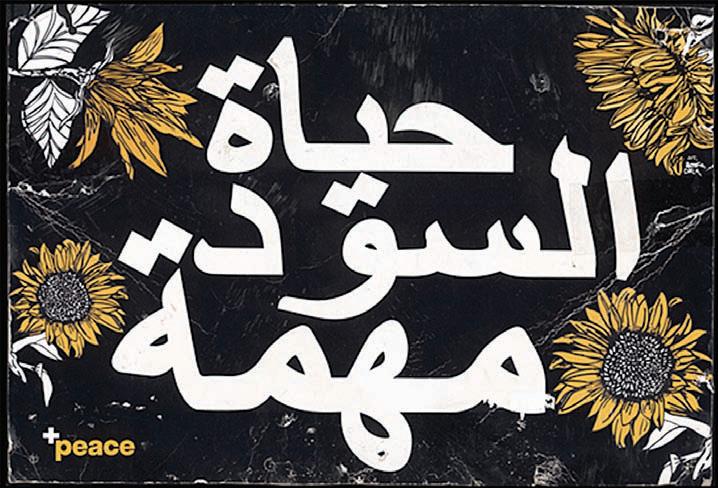
• “No Justice, No Peace”
• “Abolish the Prison Industrial Complex”
• “We All Bleed the Same”
• “Stop Killing Us”

• “White Guilt is Your Conscious Speaking; Please Listen”
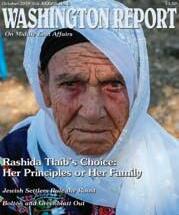




• “If You Are Not Outraged, You Are Not Paying Attention”
• “If They Don’t Give You a Seat at the Table, Bring a Folding Chair”
In July 2021, the National Park Service removed the barricades and replaced the fence, allowing people to once again visit Lafayette Park and walk up to see the White House. Perhaps one day, people will remove the walls and barricades in Israel and Palestine.—Aseel
 Abukwaik
Abukwaik
Now


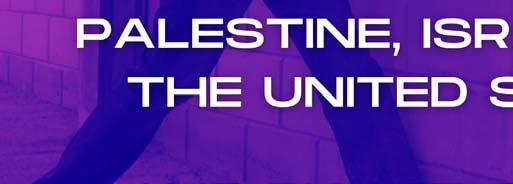
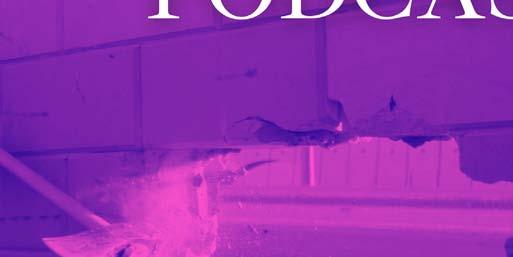



INSIDE A GAZA CAFE, Yusri al-Ghoul envisions another world where the events of his new book—a collection of short stories, which he describes as a “story sequence”—take place. The stories are linked by a common denominator; the main characters are historical figures who departed the world following assassinations in their respective contexts.
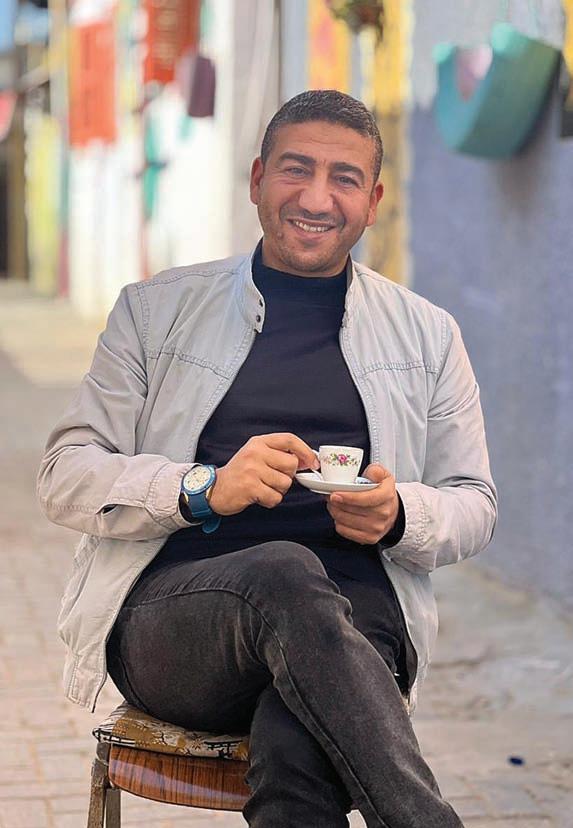
He summons these characters to reformulate and retell history, adapting the text to intertwine the bitter Palestinian reality, with all the onslaught committed by the occupation.
Al-Ghoul, an award-winning Palestinian writer and storyteller, was born in Gaza in 1980, where he also had his education. Al-Ghoul just released a new series of stories in his book John Kennedy Sometimes Hallucinates, published by the Beirut-based Arab Institute for Research & Publishing. The book, written in Arabic, evokes the media blackout of Palestine by reimagining a naked fiction infused with a reality that is hardly covered in Western media.
“Sometimes we have to dig deeper than headlines to understand what actually happened” he tells the Washington Report in an exclusive interview as he adjusts himself struggling for warmth against the winter cold.
The book, released in 2023, has not yet made its way to Al-Ghoul himself. Usually, it takes a year before he can get his hands on a
physical copy of his work. This is due to the Israeli blockade imposed on the coastal enclave, which effectively restricts the movements of individuals and the shipping of most items, including books.
However, Al-Ghoul knows that his book is out there breathing freedom away from his Gaza hometown, which is surrounded by gunboats, military fences and automated gun machines.
In his book, he summons international personalities who have been assassinated and questions them about whatever he wants to know, as he becomes part of the text in a balanced manner. In many situations, the writer is a customer in the fictional café that overlooks a river inside the virtual world after death.
The series of stories reformulate history differently from the real facts that caused the assassinations, in an attempt to convey a message that the truth may not have been fully told in the media narratives of assassinated personalities such as John Kennedy, Pablo Neruda, Salvador Allende, Yitzhak Rabin, Yasser Arafat, Che Guevara, Shireen Abu Akleh and others.
The book has been welcomed by not only Palestinians, but also the broader Arab public, who immediately zoomed in on the story of the killing of Shireen Abu Akleh, the PalestinianAmerican journalist who served over 25 years as an Al Jazeera Arabic correspondent, and is recognized as one of the most well-known reporters across the region. Over her career, she reported on major events affecting Palestinian lives, as well as Israeli politics.
Yusri al‐Ghoul, an award‐winning Palestinian writer and storyteller, sits outside a café. PHOTO WRMEAA New York Times investigation found that the bullet that killed Abu Akleh was fired from the approximate position of an Israeli military vehicle.
Commenting about Al-Ghoul’s postdeath assassination narratives, the Iraqi novelist Diaa Jubaili endorsed the collection of stories as often “non-traditional and nonintentional, nearly a symbolism that attempts to deliver messages that one can feel after reading each story.”

In that virtual café, Abu Akleh meets Colombian Nobel Prize winner novelist Gabriel García Márquez, who, according to the story titled “Márquez Applauds Warmly,” believes in the justice of the Palestinian cause, telling her “There must be a revolution in the face of tyrants.”
The idea of the story series was born in AlGhoul’s mind while he was reading about famous assassinations. He did not like “many endings of the lives of political and literary figures throughout history.”
At that time, he asked himself, “Why don’t I reformulate history?” He says during the Washington Report interview, “The occupation and other oppressive regimes...[y]ou write and lie…and this writing will one day turn into a forged history, and we must play a role in correcting the course of history.”
The storytelling of oral history is a fundamental art among Palestinians and it is being passed from one generation to the next, carrying the story of Palestine and its people. The tradition used in the writing of Tales from a Thousand and One Nights is not an exception. In each Palestinian village, the hakawati are known as itinerant storytellers who would visit villages to tell a story from the history of Palestine. This type of story is ever stronger among the Palestinian diaspora that started to learn the taste of freshly baked loaves of bread in the old days when Palestine was free.
Coming back to reality, the Palestinian book industry in Gaza was crushed by Israeli military attacks. The largest and most
famous bookshop and publishing house, Samir Mansour Bookshop, was reduced to rubble in May 2021 after an Israeli airstrike during the 11-day onslaught on Gaza. Mansour opened 23 years ago and was a beloved part of the local community. He published books by local authors such as Ghareeb Asqalani, Yusri al-Ghoul and Mosab Abu Toha. Mansour lost more than 90,000 books in the bombing. A global campaign raised $250,000 to help rebuild the store, plus donations of 150,000 books. The bookshop was rebuilt and reopened last February thanks to the contributions, plus tens of thousands of new books donated by global citizens around the world. Al-Ghoul, whose books were among those printed locally by the Mansour bookstore, admits that sometimes Palestinians have to work around policies that do not allow shipping books into the Gaza Strip. Sometimes they just have to do the work themselves—like publishing.
Al-Ghoul goes back to the Abu Akleh story describing the scene, “The flags and banners are flying over the café, as if the crowds were preparing for this great festival, even Pablo Neruda, the Nobel Prize winning Chilean poet-diplomat stood on the table to dance, while American novelist Ernest Hemingway is shooting in the air with an old gun to celebrate the occasion, and Márquez warmly applauds and applauds for a girl that has been exhausted by the long journey.”
When asked if he was given 30 seconds to tell something to U.S. President Joe Biden, what would that message be, he paused for a moment before uttering, “At some point, you will be out of the context of time and place—if the U.S. is truly a champion of civilization and human rights, then you should refrain from using the American veto to block the Palestinian rights.” ■
All books featured in this section are available from Middle East Books and More, the nation’s preeminent bookstore on the Middle East and U.S. foreign policy. www.MiddleEastBooks.com • (202) 939-6050 ext. 1101
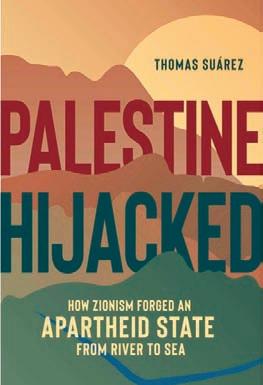 By Thomas Suarez, Olive Branch Press, 2022, paperback, 470 pp. MEB $25
By Thomas Suarez, Olive Branch Press, 2022, paperback, 470 pp. MEB $25
In his new book, Thomas Suarez draws on years of research deep in the bowels of British and U.S. archives, sifting through little known or recently unsealed records. From this haul he presents vivid documentation of the 1948 terror against—and ethnic cleansing of—Palestinians, as well as records of systematic atrocities that consolidated Zionist control after Israel became a state.
But it is in bringing to light the pre-1948 story of Israel’s founding that the book delivers unprecedented detail on the layers of Zionist deception and aggression. Readers encounter the incessant Zionist lies, machinations and terror unleashed against the Palestinians, but also against British police and civil servants, and not least, against recalcitrant Jews who balked at helping impose Jewish supremacy in Palestine.
The book is compulsively readable (as long as you have a moderately strong stomach), more than persuasive, and should be seminal in opening up further directions for research. Sticking to a chronological narrative, accompanied by incisive but restrained commentary, Suarez delegitimizes core assumptions relied on to justify or excuse Israel’s conquest of Palestine.
Most damaging, Suarez shows that “the professed motivation” of early Zionist lead-
ers—to protect Jewish safety and dignity against anti-Jewish persecution—was never their “driving motivation.” What they wanted was to establish “an ethnically predicated settler state for which persecuted Jews were [the] renewable fuel.” This is easy enough to say, of course. Many critics of Zionism have noted Zionist hostility to the rich variety of diasporic Jews and Jewish cultures found around the world and even in Palestine, and their condemnation of non- or anti- Zionists as “self-hating Jews.”
What’s important is that Suarez can back up with hard evidence his assertion that “most victims of Zionist assassinations (i.e., targeted killings of specific individuals) were Jews.” In this vein, Suarez notes the Jewish Agency’s internal instruction in 1942 that non-Zionist Jews were the “foremost enemy.” He also points out that Jews publishing in languages other than Hebrew were labeled as enemies and systematically fire-bombed.
Other storylines that Suarez weaves through the years from early in World War I to 1956 (the year of the Suez Crisis) include:
● Britain eagerly signing on to bring the Zionists to Palestine and using its imperial
power to give them dominance over the Palestinians—only to find itself treacherously re-purposed by Zionists around 1939 to play the role of colonial oppressor of the Jews in Palestine. Over the next several years, the British were driven out by a Zionist terror campaign advertised to the world as a Jewish “war of independence.”
● The Palestinians suffering massive amounts of casualties and bombings by the Zionists and the Brits during the Mandate period. However, after the Arab Revolt ended in 1939, they showed “no disposition to violence,” the British steadily reported.
● Groups of Jewish youth (male and female) going out on seemingly innocuous “hiking tours,” winding their way through Arab areas. But their real purpose, as the British belatedly realized, was to “spy out the land” and secretly photograph, map and assess the military vulnerabilities of Arab communities, often visiting “hidden military training settlements” along the way.
● Early on, U.S. politicians, intellectuals, entertainers and journalists falling for proZionist propaganda and influence campaigns and mobilizing public opinion and lots of funds vital to keeping Zionist terror gangs in business.
● The now-forgotten terror campaign in Europe that helped Zionists take control of Jews displaced during World War II and transport them to Palestine to serve the Zionist cause. The terror also generally deterred British and other European resistance to the Zionist agenda (even the very pro-Zionist Winston Churchill received a letter bomb from the Stern Gang).
● The Zionists cynically engineering a U.N. vote on Resolution 181 in 1947 to partition Palestine, but then completely ignoring the partition resolution to seize more territory. Resolution 194, calling for Palestinian refugees to be allowed to return to their homes, was also disregarded. Nonetheless, the U.N. quickly gave full recognition to the state of Israel.
Palestine Hijacked is a unique resource. Open almost any page—or follow individual index entries—and you find compelling quotes of eyewitnesses and key decision makers from all sides telling their part of the shameful tale. Anyone who wants to fully fathom the history of Israel’s founding

needs to read this book. Moreover, to remain unaware of the history that Suarez presents limits advocates’ ability to overcome many Americans’ stubborn wish to believe in Israel’s basic goodness and necessity, despite Zionism’s 100 years of persecuting Palestinians.
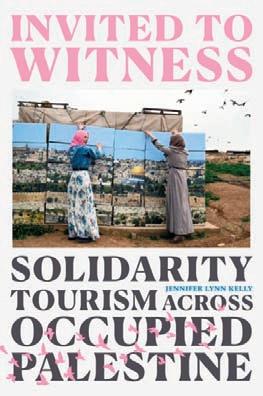 By Jennifer Lynn Kelly, Duke University Press, 2023, paperback, 344 pp. MEB $30
By Jennifer Lynn Kelly, Duke University Press, 2023, paperback, 344 pp. MEB $30
Reviewed by Walter
L. Hixsoncenters on explaining how and why organizers chose solidarity tourism to illuminate and publicize “the contours of Israeli colonial violence.” The study, however, also analyzes the limitations and contradictions of solidarity tourism.
The early chapters analyze the emergence of solidarity tourism as a strategy. The author probes specific aspects of the division and displacement within historic Palestine, such as settler violence that targets olive planting programs. Another chapter centers on the isolation, fragmentation and expulsion of Palestinians from occupied Jerusalem. Subsequent chapters focus on “mixed cities” under Israeli political control, as well as the roles of virtual and celebrity tourism. The seventh and final chapter homes in on the views and interpretations of U.S. tourists and their role as “witnesses” back home.
Solidarity tourism has enlightened countless numbers of tourists to the brutal realities of Israel’s occupation and the systematic erasure of Palestinian narratives. Like countless others, I know this from personal experience, as my two-week tour through Eyewitness Palestine in 2013 was one of the
In this sophisticated academic study, Jennifer Lynn Kelly probes the complexities of solidarity tourism in Palestine. Flourishing since the Oslo Accords, which divided the West Bank into designated areas with varying administrative and security controls, solidarity tourism has become a noteworthy industry as well as a significant source of knowledge production about Israeli settler colonization.
Invited to Witness draws on the author’s interviews primarily with Palestinian tour guides, but also with community members, tourists and activists during multiple trips to the region spanning a decade. The book
Contributing editor Walter L. Hixson is the author of Architects of Repression: How Israel and Its Lobby Put Racism, Violence and Injustice at the Center of US Middle East Policy, along with several other books and journal articles. He was a professor of history for 36 years, achieving the rank of distinguished professor.
most enlightening yet disturbing experiences of my life. I have been a “witness” ever since.
That said, Kelly’s impressive field research yields a nuanced analysis rather than an uncritical celebration of solidarity tourism. She notes that in many ways, “solidarity tourism is about failure.” Indeed, solidarity tourism originated as an effort to “get through” to internationals as witnesses, because other means had failed to expose and destabilize Israeli settler colonialism.
Invited to Witness underscores the inability of many tourists to understand that unbridled U.S. support for Israel is grounded in another and pernicious form of solidarity—namely settler solidarity between Israel and the United States. Moreover, tourists, unlike Palestinians under occupation, enjoy the privilege to move with relative freedom and to return home—and on the part of many, to maintain a blind eye to the core identity of the United States as a settler society. Although Kelly analyzes the limitations and contradictions of solidarity tours, she rejects derision or dismissal of the tours as mere “occupation tourism.”
This book is an academic analysis grounded in feminist studies, American
studies, Asian American studies, critical ethnic studies and Palestinian as well as U.S. history. Despite what the uninitiated reader might consider excessive jargon, the book remains readable, well put-together by Duke University Press and illustrated with several photographs.
 By Xavier Abu Eid, Dar al-Kalima University Press, 2022, paperback, 349 pp. MEB $20
Reviewed by Daoud Kuttab
By Xavier Abu Eid, Dar al-Kalima University Press, 2022, paperback, 349 pp. MEB $20
Reviewed by Daoud Kuttab
talked, worked, protested, been tortured, imprisoned and martyred in the shared pursuit of Palestinian liberation. Published by the university press of the Bethlehembased Dar al-Kalima University, the book contains more than 500 footnotes, allowing it to also serve as a Palestinian Christian bibliography of sorts.
With skill and grace, Abu Eid provides a panoramic view of the contributions of Palestinian Christians across many different fields, including: academics and educators like Edward Said, Hanna Nasser, Hanan Ashrawi and Nabil Kassis; legal experts such as Camille Mansour; human rights activists like Raja Shehadeh and Jonathan Kuttab; nonviolence proponents like Mubarak Awad and Father Elias Chacour; businesspeople and philanthropists like Said Khoury and Hasib Sabbagh; mayors such as Bethlehem’s Issa Bandak and Elias Freij and Ramallah’s Karim Khalaf; politicians like Wadie Haddad; and PLO leaders like George Habash, Kamal Mansour and Nayef Hawatmeh.
Abu Eid, a practicing Christian who was born in Chile and moved to Palestine to advise the PLO and conduct research, also gives much space to the activities of church leaders, including the well-respected Latin Patriarch Emeritus Michel Sabbah, detailing his entire life story and reflecting on his influence. Other Latin patriarchs are not given the same positive remarks, as the author is critical of Sabbah’s non-Arab predecessors, who he believes were more loyal to their country of origin than their Palestinian flock.
The church that comes out with the highest marks in the book is the Greek Catholic Church, whose leaders are referred to as being close to their congregations, speaking out for their rights and refusing to acquiesce to the various powers. Anglican (Episcopal) and Lutheran Palestinian bishops also receive positive reviews, although their church sizes are relatively small.
The Palestinian national struggle has always prided itself on its secular nature, rejecting attempts to introduce religion into the conflict taking place in what is often referred to as the Holy Land. In fact, the strong connection between Christian and Muslim Palestinians has been a major part of the Palestinian narrative. This historic relationship, while well-known and understood within Palestine and the region, has been dismissed or overlooked by many in the West.
Rooted in Palestine seeks to change this reality by comprehensively documenting the role of Christians in the Palestinian movement, giving a name and face to the many Palestinian Christian leaders who have been involved, side by side with their fellow Palestinian Muslims, in the national struggle. Christians, the book shows, have
Daoud Kuttab is an award-winning Palestinian journalist and former Ferris Professor of Journalism at Princeton University. Follow him on Twitter @daoudkuttab.
Abu Eid also names Christians who became martyrs for Palestine: The Beit Jala mayor who was killed by the British; a PLO representative in Brussels, Naim Khader, who was most likely killed by the Abu Nidal Group; Rania Murrah, a 24-year-old mother who was killed by Israeli fire while on her way to buy milk; Johnny Thaljieh, a 19-year-old Palestinian who wanted to become a priest but was killed while on his way to serve at Mass at the Church of the Nativity; and the 40 Armenian Christians who were killed during the 1948 war.
The breadth of Palestinian Christian thinking is also evident in the book, as Abu Eid shares stories and opinions of individuals possessing different views about crucial events and issues, such as the Oslo Accords and the role of armed resistance.
In addition to its vital information, Rooted in Palestine tantalizes readers with interesting anecdotes, such as PLO Chief Negotiator Saeb Erekat kicking out Mayor Elias Freij from the front row of the Madrid Conference, and a Latin priest, Fr. Iyad Twal, performing the baptism of Anglican twins because the Israeli army barred Rev. Samir Esaid from reaching his parish in the Ramallah-area village of Birzeit.
Rooted in Palestine is an important and valuable addition to the many books written about Palestine, especially since it focuses on a narrow (but important) element of Palestinian life. Abu Eid is to be commended for revealing and celebrating the many Palestinian Christians who have done so much for their country, almost always without seeking any attention or praise.
paperback, 400 pp. MEB $28
One of the world’s most thinly populated nations, Western Sahara, or the Sahrawi Arab Democratic Republic (SADR), epitomizes the concept of “lines in the sand.” Its reality is shaped by lines drawn on maps by colonial cartographers and by a physical wall of sand—the 1,700-mile-long Berm piled up by the Moroccan occupiers in emulation of the Israeli separation wall. The country’s desert expanse is at the crossroads of modern
U.N. correspondent Ian Williams is the author of U.N.told: The Real Story of the United Nations in Peace and War.
geopolitics, sovereignty, international law and diplomacy, where it is an Ozymandian monument to international law; “look upon my works, ye mighty, and despair!”
Rabat shares with Israel a determination to ignore U.N. resolutions and international decisions, as well as an effective cabal of friends determined to cover for its occupation despite international law. Stephen Zunes and Jacob Mundy, the authors of Western Sahara: War, Nationalism and Conflict Irresolution, go deep into the issues and are heroically objective in the face of flagrant duplicity and defiance from Morocco, and the obfuscation of sponsors and bystanders in the West.

Unfortunately, the U.N. has totally failed to provide an effective answer to “The Question of Western Sahara,” but as Zunes and Mundy demonstrate, figuring it out raises many more fundamental questions which all need answers.
So, what qualifies a nation to claim the right to self-determination? U.S. Supreme Court Justice Potter Stewart invoked the subjective element in 1964 when he stated, probably presumptuously, that we recognize pornography when we see it. Similarly, in the absence of more objective indicators, if a majority of a people think they constitute a nation, then it is wise to assume their views are conclusive. The authors convincingly demonstrate that the furnace of colonial struggle against Spain, Morocco and Mauretania has indeed forged a genuine Western Saharan identity.
However, this aspiration is often unrecognized within the Arab world. It almost takes an effort of historical data mining to remember the heady days of Arab nation-
Stranger in My Own Land: Palestine, Israel and One Family’s Story of Home by Fida Jiryis, Hurst and Company, 2023, hardcover, 392 pp. MEB $35.

After the 1993 Oslo Accords, a handful of Palestinians were allowed to return to their hometowns in Israel. Fida Jiryis and her family were among them. In this beautifully written memoir, Jiryis tells the story of their journey, which is also the story of Palestine, from the Nakba to the present—a 75-year tale of conflict, exodus, occupation, return and search for belonging. Stranger in My Own Land chronicles a desperate, at times surreal, search for a homeland between the Galilee, the West Bank and the diaspora, asking difficult questions about what the right of return would mean for the millions of Palestinians waiting to come “home.” Jiryis reveals how her father, Sabri, a PLO leader and adviser to Yasser Arafat, chose exile in 1970 because of his work. Her own childhood in Beirut was shaped by regional tensions, namely the Lebanese civil war and the 1982 Israeli invasion, which led to her mother’s death. Thirteen years later, the family made an unexpected return to Fassouta, their village of origin in the Galilee. But Jiryis, 22 years old and full of love for her country, had no idea what she was getting into.
The Untold Story of the Golan Heights: Occupation, Colonization and Jawlani Resistance edited by Muna Dajani, Munir Fakher Eldin and Michael Mason, I.B. Tauris, 2022, paperback, 248 pp. MEB $35.

In 1967 Israel occupied the western section of Syria’s Golan Heights, expelling 130,000 residents and leaving only a few thousand Arab inhabitants clustered in several villages. Sometimes characterized as the “forgotten occupation,” the western Golan Heights have been transformed by Israeli colonization, including the appropriation of land and water resources, economic development and extensive military use.
This landmark volume is the first academic study in English of Arab politics and culture in the occupied Golan Heights. It focuses on an indigenous community, known as the Jawlanis, and their experience of everyday colonization and resistance. Rich in ethnographic detail and with chapters from diverse disciplines, the book is unique in bringing together Jawlani, Palestinian and UK researchers. The innovative format, with shorter “reflections” from young Arab researchers, activists and lawyers who respond to more traditional academic chapters, establishes a bold new “de-colonial” approach.
Sitti’s Bird: A Gaza Story by Malak Mattar, Crocodile Books, 2022, hardcover, 32 pp. MEB $18.95.
Sitti’s Bird: A Gaza Story is a unique children’s picture book, written and illustrated by Palestinian artist Malak Mattar. Reflecting her experiences of childhood in occupied Palestine, Mattar’s story brings warmth and wonder to children as it tells of her self-discovery as an artist during the 2014 Israeli airstrikes on Gaza. It is the story of a young girl whose love for her family and art help her channel her fears and overcome traumas that few of us can imagine, traumas tragically shared by countless children in Gaza and around the world. While painfully real, this book teaches children to keep dreaming and loving in the face of every challenge and injustice.

alism, with its plans for pan-Arab unity centered around throwing out colonial hegemons. Today, an underlying assumption remains that colonialism is a phenomenon exclusively exercised by Europeans upon the Third World, explaining weak support among Arab governments for the Polisario Front’s liberation struggle in Western Sahara. As one example, the book notes the strong support from Polisario for the Palestinians—and the absence of reciprocation from the Palestinian leadership.
In contrast, the African Union has been stiffened in its support for the Sahrawis by its founding commitment to the sanctity of colonial boundaries. However, standing back, that is more a pragmatic rule than a fixed ethical principle, although pragmatism does go a long way in this case. There are few worse scenarios than the likely chaotic scramble for Africa if those boundaries were put in play.
Among the principles that the international community is actively flouting in the Sahara are not only decolonization, but the right to national self-determination, the prohibition against the acquisition of territory by force and the U.N. Charter’s absolute prohibition against aggression and invasion. And that is before we get to the innumerable conventions on human and civil rights. As the authors enumerate, the charge sheet is exacerbated by Rabat’s repeated defiance of specific U.N. Security Council and General Assembly resolutions, and its continuing and self-incriminating refusal to countenance any human rights element in MINURSO, the everlasting U.N. mission in the Sahara. They also recount numerous occasions where U.N. officials and agencies have overlooked such breaches. Morocco has indeed adopted the modern annexers’ handbook principle of talking without giving an inch.
With that background, the authors sadly explain the political and diplomatic balance sheet for Polisario—the robust sense of nationhood among the Sahrawis and, ironically, the ineptitude of the Moroccan monarchy, which has done as much to build Sahrawi patriotism as Vladimir Putin has to create a stronger Ukrainian sense of nationhood.
Western Sahara’s fish, phosphates and perhaps solar power are among the few ob-
jective elements that Polisario has in its favor—and since it does not have physical control of them, it reinforces the need to invoke international law to exert leverage. The authors are aware of the odds, but as they point out, the world was even more oblivious to now-independent East Timor, with only three countries recognizing it and the Association of Southeast Asian Nations explicitly backing Indonesian annexation. SADR has 84 nations backing it, plus the African Union and a string of international legal judgments. But then again, Palestine has even more backing, and we know how that has turned out thus far.
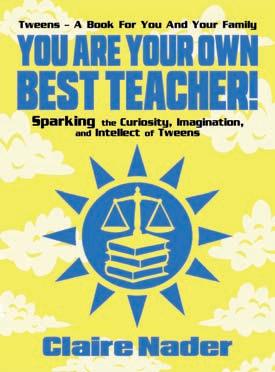 By Claire Nader, Essential Books, 2022, paperback, 237 pp. MEB $20
Reviewed by Delinda C. Hanley
By Claire Nader, Essential Books, 2022, paperback, 237 pp. MEB $20
Reviewed by Delinda C. Hanley
self-conscious thinking behind, confidently speak truth to power, ask questions and continue to learn.
Nader warns kids, “Our society often underestimates you, categorizes or labels you too rigidly. It doesn’t allow you to discover how good, smart and idealistic you truly can be right now, especially if you are given a chance.”
Nader urges youngsters not to wait to use their imagination, creativity and unique strengths to ensure the future of our world. Young people, like Swedish environmental activist Greta Thunberg, do inspire their elders to make essential changes. Thunberg was only 8 when she began studying climate disruptions. Nader writes that after teaching herself the facts, Thunberg collected “science-based arguments” and “enlisted her parents and her sister to endorse her personal philosophy: to step lightly on this earth, our only home.” The family adopted lifestyle choices that reduced their own carbon footprint. In 2019, when she was 16, she addressed the United Nations and demanded bluntly, “How dare you steal our future through inaction?” Her challenge resonated throughout the world. Nader’s book emphasizes another famous Thunberg quote: “I have learned you are never too small to make a difference.”
Nader argues, “Adults shouldn’t tell you that you’re too young to be an active citizen. Many children have found ways to help the poor, to clean a polluted environment, to invent things for the disabled and to better their communities.”
While Claire Nader’s engaging book is a guide for young “tweens,” 9-to-12-yearolds, their teachers and families, it’s also chock full of wisdom for readers of any age. The Nader family, of Lebanese descent, is well-known for their activism. Political scientist and author Claire Nader and her siblings were taught by their parents that informed civic participation begins early and should grow throughout life. You Are Your Own Best Teacher! encourages us to leave
Like many of us, when Claire Nader was a fifth grader, a “good student” was obedient, a teacher’s helper who always got high grades. Today, a good teacher or parent teaches kids how to think and encourages “you to disagree if you think the facts and what’s right are on your side.”
Students can use their moral sensibilities, their notions of right and wrong, to turn a bad situation around. If they witness injustice, they should be emboldened to speak out. After all, brave children who ask hard questions may become ground-breaking journalists like Helen Thomas, “who drove presidents and press secretaries up the wall during her 60-year career as a White House correspondent and author. Why?
Because she repeatedly asked questions (like you kids would) ask...such as ‘Mr. President, why are we in Iraq?’ or ‘What about the rights of Palestinians under Israeli occupation?’” Shouldn’t you be able to have factual discussions with the politicians who change our world? Claire Nader gives us the tools to teach ourselves how to wage peace instead of war.
Nader’s book reminded me that, at age 11, I wanted to be a missionary doctor. My parents nourished that desire, and let me volunteer at an orphanage in Damascus. (It was only chemistry and religion that put a stop to my plans.) How did you plan to save the world? How can we encourage children’s innate altruism? You can begin by reading You Are Your Own Best Teacher!

11 Lives: Stories from Palestinian Exiles edited and translated by Muhammad Ali Khalidi, OR Books, 2022, paperback, 300 pp. MEB $22.95.

Written by refugees, this highly original anthology of Palestinians forced to live outside of their homeland brings together stories of what it means to be exiled. The contributors share insights into the events that led to their displacement and the raw experience of daily life in a refugee camp. The 11 lives given voice in this book are unique, each an expression of the myriad displacements that war and occupation have forced upon Palestinians since the Nakba of 1948. At the same time, they form a collective testament of a people driven from their homes and land by colonial occupation. Each story is singular, and yet each tells the story of all Palestinians. The product of a creative-writing workshop organized by the Institute for Palestine Studies in Lebanon, 11 Lives tells of children’s adventures in the alleyways of refugee camps, of teenage martyrs and of the love and labor that form the threads of a red keffiyeh
The Bird Tattoo: A Novel by Dunya Mikhail, Pegasus Books, 2022, hardcover, 304 pp. MEB $26.95.
 By Mosab Abu Toha,
By Mosab Abu Toha,
City
LightsPublishers, 2022, paperback, 144 pp. MEB $15
Report by Delinda C. HanleyDunya Mikhail’s The Bird Tattoo chronicles a world of great upheaval, love and loss, beauty and horror. Helen is a young Yazidi woman living with her family in a mountain village in Sinjar, northern Iraq. One day she finds a local bird caught in a trap and frees it, just as the trapper, Elias, returns. At first angry, he soon sees the error of his ways and vows never to keep a bird captive again. Helen and Elias fall deeply in love, marry and start a family in Sinjar. The village has seemed to stand apart from time, protected by the mountains and too small to attract much political notice. But their happy existence is suddenly shattered when Elias, a journalist, goes missing. A brutal organization is sweeping over the land, infiltrating even the remotest corners, its members cloaking their violence in religious devotion. Helen’s search for her husband results in her own captivity and enslavement. She eventually escapes her captors and is reunited with some of her family. But her life is forever changed. Elias remains missing and her sons, now young recruits to the organization, are like strangers. Will she find harmony and happiness again?
The Purple Color of Kurdish Politics: Women Politicians Write from Prison edited by Gültan Kisanak, Pluto Press, 2022, paperback, 272 pp. MEB $22.95.
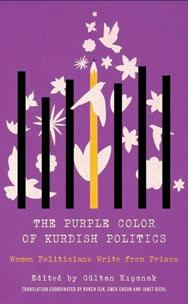
Award-winning poet, short story writer and essayist Mosab Abu Toha’s book reading on Jan. 12 was the first in-person event of the year hosted by the Jerusalem Fund in Washington, DC. Combined with a lunch donated by Falafel Inc (which serves the best falafels I’ve ever tasted), the book
Gültan Kisanak, a Kurdish journalist and former member of Turkey’s parliament, was elected co-mayor of Diyarbakır in 2014. Two years later, she was arrested and imprisoned. Her story is remarkable, but not unique. While behind bars, she wrote about her own experiences and collected similar accounts from other Kurdish women, all co-chairs, co-mayors and parliamentarians incarcerated on political grounds by the Turkish state. Written with a left-wing bent, The Purple Color of Kurdish Politics also features reflections on Turkey’s anticapitalist and socialist movements, as well as radical feminism. Demonstrating ceaseless political determination and a refusal to be silenced, the book hopes to inspire women living under even the most unjust conditions to engage in collective resistance.
reading and lively Q&A session reminded attendees why in-person talks are ideal (but virtual viewing is still possible on YouTube, <https://youtu.be/mREsCciAHQw>).
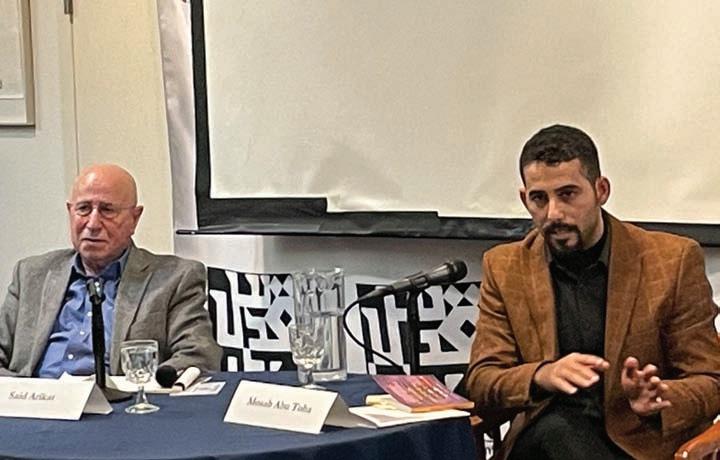
Abu Toha read remarkable, unpublished new poetry and then turned to the compelling poems from his book, Things You May Find Hidden in My Ear, chronicling daily life under siege in Gaza. Moderator Said Arikat, Washington bureau chief for the Palestinian newspaper al-Quds, then asked, “When did you begin to write poetry?”
Abu Toha explained that he began posting about the 2014 Israeli assaults on Gaza on Facebook, and people commented that his posts were poetic. “I was just writing what I was seeing in front of me, what I was hearing other people saying. And I’ve always been a ‘photo-taking’ person. I think my love for taking photographs is one reason why I like to write poetry, the details, the things that I can see in my eye and put them onto the page.”
Some of Abu Toha’s photos are included in his book. For example, a photo of a recently bombed residential apartment building is captioned, “The scent of coffee still hangs in the air. But where’s the kitchen?”
He showed a video clip of his young daughter Yaffa, 4, frightened by Israeli air strikes in May 2021, and his son Yazzan, 6, offering a thin blanket to help her hide from the bombs. Abu Toha told the stricken audience, “I wish we did have a magic blanket that would hide all of us and keep us safe.”
His poem, “Shrapnel Looking for Laughter,” describes his neighbor’s house after it was bombed. “Everyone is dead: the kids, the parents, the toys, the actors on TV, characters in novels, personas in poetry collections....Even we, hearing the bomb as it fell, threw ourselves to the ground, each of us counting the others around them. We were safe, but our hearts still ache.”
A different poem describes how a mother in Gaza gathers all her children into her bed and sings a song or distracts them with a story to drown out terrifying explosions. Another mother leaves a cake burning in her oven as she evacuates her family from their home before it’s blown up.
When Arikat asked why, as a bilingual poet, he wrote in English instead of his
mother tongue, Arabic, Abu Toha said one practical reason is that there are more publishers in the English language world. However, his poems have been published in AlAraby Al-Jadeed, and also Al-Ayyam, a major Arabic language newspaper in Palestine, “and I’m working on publishing my first poetry collection in Arabic.”
When asked if he ever tries to translate from one language to another, Abu Toha said that doesn’t work well. “When I write in English, I just write it in English from the start,” he explained. “Generally, when I write in English, I have a specific audience in my mind,” he said. “I’m telling stories that I want other people in the West, especially in America, to know about.”
One such poem speaks to the bleak reality in Gaza. When a father/son/husband is late returning home from work, Americans might just check the traffic reports. When a Gazan is late, relatives check the hospitals and the morgue.
“The Wounds” describes when the poet, aged 16, was felled by an Israeli attack during “Operation Cast Lead” on his way to the grocery shop. Dripping with blood, he shares an ambulance with a corpse. “The body burnt, maybe no head. I don’t look at it. The smell is so bad. I’m so sorry whoever you are.” Later at the hospital, “My brother tells me: Hearing the explosion and knowing you hadn’t returned home yet, we assumed you were dead. We began searching for you in the morgue. I look around me, relatives circle my bed. I watch them as they chat. I imagine them praying around my coffin.”
When asked how he copes with all the trauma he’s experienced, Abu Toha said sometimes he writes poetry months after the event. “The Wounds” was written 11 years after the incident, but “I could remember every detail....I think writing about these things helps me recover from some of the traumatic experiences. I do think that writing is a healing process because many of us have nightmares and we don’t know the source of these traumas until we write about them. Through writing you are pulling something from your subconscious, and you can kill these memories.”
The title poem of his book, “Things You May Find Hidden in My Ear,” is written to his doctor before surgery to repair lingering damage from that wound. When she opens Abu Toha’s ear, he asks her to “touch it gently. My mother’s voice lingers somewhere inside...songs in Arabic, poems in English I write to myself, or a song I chant to the chirping birds in our backyard...” He asks the surgeon to put those sounds back in his ear. “Put them in order, as you would do with the books on your shelf.” But as for “the drone’s buzzing sound, the roar of an F-16, the screams of bombs falling on houses, on fields, and on bodies, of rockets flying away—rid my tiny ear canal of them all...”
Readers of Abu Toha’s poetry will not want to forget the heartbreaking and also uplifting words penned by this Gazan poet. As fellow Palestinian poet Naomi Shihab Nye notes, “I feel like I have been waiting for his work all my life.” ■


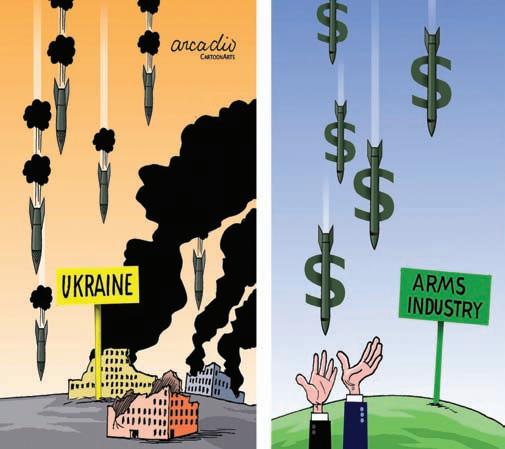


Maarten, Leiden, Netherlands
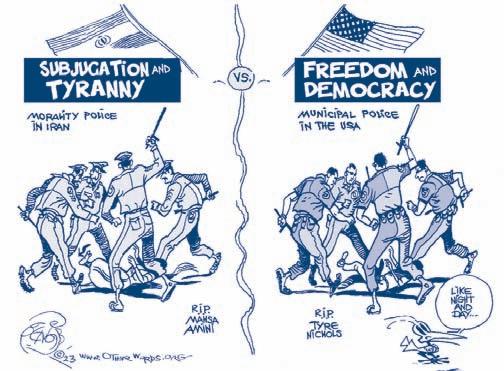
VICE
1600
To the Oroville Mercury-Register, Feb. 2, 2023
When I was in Israel and the Palestinian West Bank in January 2009 with a Christian Peacemaker Team, I saw for myself some of the horrors of Israel’s apartheid government. That was the time of Israel’s “Operation Cast Lead”—bombing Gaza, killing over 1,400 people, including around 350 children killed in three weeks. We were able to watch Al Jazeera’s TV reports in Arabic. Al Jazeera in Arabic shows a lot more blood and guts than Al Jazeera in English.
I spent one night in the home of a Palestinian doctor. His younger brother had been shot through the shoulders by Israeli soldiers. Three days later, a 17-year-old relative of theirs was killed by Israeli soldiers. Another group from our tour was going to spend a night with a different family. They were turned back because one of the men in the family had died that day after having been arrested by Israeli soldiers. He had been plowing a farm field that day, when the Israeli soldiers arrested him; several hours later he was dead—no reason given for his death.
I watched at Israeli checkpoints in Hebron while school children and teachers walked to school. They have to show their passports to Israeli soldiers before crossing the street, both going to school and returning home, five days a week. They can be arrested and held in jail without charge for six months.
America needs to stop giving $3.8 billion a year to Israel.
Sharon Fritsch, Chico, CA PRESIDENT KAMALA HARRIS PENNSYLVANIA AVE. NWWASHINGTON, DC 20500
COMMENT LINE: (202) 456-1111
WWW.WHITEHOUSE.GOV/CONTACT
ANY MEMBER: U.S. HOUSE OF REPRESENTATIVES
WASHINGTON, DC 20515 (202) 225-3121
To The Dallas Morning News, Jan. 15, 2023
Re: “New Israeli government penalizes Palestinians—Security Cabinet withholds millions after U.N. move,” Jan. 7 news story.
When I read this headline, I expected to hear of a rocket attack from Hamas-controlled Gaza or renewed violence in East Jerusalem. I could scarcely believe it when I read that the true provocation was that Palestinian leaders were publicly urging the International Court of Justice to render an opinion regarding the legality of Israel’s occupation of the West Bank. That $39 million isn’t aid; under the 1994 Oslo Accord, it’s tax revenue that Israel collects on behalf of the Palestinian Authority—money earmarked for schools, clinics and governance.
Even if that $39 million belonged to Israel, it’s wrong to punish Palestinians for seeking redress through peaceful, diplomatic means. Wrong and shortsighted. The closure of Palestinians’ hospitals and schools will certainly not prompt Palestinians to give up their struggle against the Israeli occupation. To many, it will enforce the argument that violence is the Palestinians’ only recourse.
Paul Zoltan, Dallas/Little Forest Hills, TX THERE’S

To The Davis Enterprise, Jan. 24, 2023
George Rooks in a letter (Jan. 22) argues that the new government of Israel stands for democratic values. He devotes the first half of the letter to describing the undemocratic behaviors of Hamas and the

SECRETARY OF STATE ANTONY BLINKEN
U.S. DEPARTMENT OF STATE
2201 C ST. NW
WASHINGTON, DC 20520
PHONE: (202) 647-6575
VISIT WWW.STATE.GOV TO E-MAIL
ANY SENATOR: U.S. SENATE WASHINGTON, DC 20510 (202) 224-3121
Palestinian Authority. Near the end of the letter, he lists the wonderful things that the Netanyahu government is doing to support democracy.
Strangely to my mind, he includes on the list “advance[ment of] the rights of Israelis living in Area C of Judea and Samaria.” Area C is the designation given in the Oslo Accords to what many refer to as the Occupied West Bank. It covers 60 percent of the West Bank and is home to an estimated 180,000-300,000 Palestinians and to a settler population of at least 325,500 living in 125 settlements and approximately 100 outposts.
Those outposts and settlements occupy land stolen from Palestinian Arabs and have secured water in this very dry land in violation of water laws, hence Amnesty International’s phrase “the occupation of water.”
This theft of land and water has been and continues to be supported—at times with violence—by the Israeli military. Palestinians can obtain water from some of the settlements but must request it and jump through procedural hoops. How can anyone celebrate this as advancing democracy?
Stu Pettygrove, Davis, CA
To The Hamilton Spectator, Jan. 20, 2023 Regarding “The sources of Gaza violence” (Nov. 19): When I was looking for a home for my family, Hamilton [Canada] was our top choice, with diversity near the top for the reasons why. Having grown up in a suburban, non-diverse community, I couldn’t speak of my Palestinian roots confidently because of the negative, false stereotypes. Today, my children know their
grandfather was forced out of his home in Palestine in 1948 with no payment or opportunity to come back.
The world is waking up to the type of state Israel is. Amnesty International, Human Rights Watch and even the South African government all refer to Israel’s regime as apartheid. We no longer live in a world with limited media options that can provide one biased narrative: Israelis good, Palestinians bad.
The truth is in the daily accounts from social media and alternative outlets that show the suffering Palestinians face daily. I’m proud that my daughters can raise their heads in pride in understanding their history and speak honestly about the oppression their family has faced.
Tarek Jalbout, Hamilton, ON
To the Santa Cruz Sentinel, Jan. 31, 2023
As a supporter of Jewish Voice for Peace, I must say that Marc Thiessen’s Zionist attack on Rep. Ilhan Omar (D-MN) has no basis. She is not “anti-Semitic” nor is anyone else who tells the truth about the police state of Israel. The Israeli government has launched a new escalation of violence against Palestinians. It’s a government of brutal apartheid and settler colonial rule over Palestinians.
For decades, the U.N. has condemned Israel for violations of human rights and for its illegal settlements. Rep. Omar speaks the truth, but it seems that the truth no longer sets one free.
Joan Quilter, Santa Cruz, CA
To The Philadelphia Inquirer, Dec. 30, 2022
I listened to King Charles’ first Christmas address and also Pope Francis’ Christmas message for peace from the Vatican. Both referred to Bethlehem, where Christianity started and which both have visited. Charles quoted lines from the famous carol about Bethlehem, “Yet in the dark street shineth the everlasting Light,” alluding to the efforts of volunteers and service communities to help others in distress. Later he described his reverential presence in the cave under the Church of the
Nativity, standing next to the silver star inlaid on the ground that marks the place of Christ’s birth.
The pope pleaded for an end to conflicts around the world. “If we want it to be Christmas, the birth of Jesus and of peace, let us look to Bethlehem and contemplate the face of the child who is born for us,” he said.
I found it strange that neither man remarked on the situation in the Bethlehem of today. The small town is subject to frequent incursions of Israeli soldiers and tanks and is hemmed in by a high wall that inhabitants have to get permits to cross. People lack livelihoods because of the Israeli occupation, which is now 55 years old. International law condemns Israel’s settlements and land grabs. Upholding the rule of law seems worth supporting for any world leader.
Joan Hazbun, Media, PATo the Church Times, Jan. 13, 2023
The challenging article by Canon Richard Sewell on hope in the Holy Land (December 23/30) quoted Palestinian church leaders calling for churches to abandon their neutrality over the situation there and to take urgent action. It is, however, difficult for those in the situation to specify what kind of action, and easier for those of us outside to do so.
This is even more important in the light of the policies being proposed by the new government. These seem to be designed to provoke a new intifada, or uprising, in order for the Israeli security forces to crack down even further against any resistance— peaceful or otherwise.
What those of us involved over 30 years in the anti-apartheid movement in relation to South Africa learned was the need for a kind of pincer movement, where we on the outside responded to the calls for action from those inside. In those discussions, it became clear that an escalating economic boycott, alongside those of sports and culture, would be essential to force the regime to listen to the internal African leadership.
It was difficult then for leaders such as Archbishop Desmond Tutu to urge economic sanctions, but he endorsed them. He also endorsed the same stance in relation
to what he described as apartheid in Israel/Palestine. Nelson Mandela intimated similarly, saying that Africans could not be free until freedom came to Palestinians. What is needed now is political and economic pressure on Israel to honor its commitments to being a genuinely democratic society, and to recognize that Palestinians who have lived there as long as the Jewish people must be treated as equals, with equal rights for all in the land.
To give hope to Palestinians requires active pressure on Western governments to stop wringing their hands at every tightening of “security measures,” and every successive Israeli atrocity against Palestinians, and introduce serious sanctions, such as expelling diplomats, reducing trade and ending all “security” collaboration with Israel. Aid could also be cut. If the U.S. reduced its $3.8 billion a year by half, and put blocks on the money transfers that enable the purchases of Palestinian land and property, that could encourage the Israeli government to think again.
Pressure is also needed on the UK banks that support the occupation. The recent “Don’t Buy into Occupation” report showed that HSBC and Barclays are two of the three largest lenders to the 50 companies that are most involved in developing the infrastructure and construction in the occupied territories. The churches all have large investments in those two banks, and some of the named companies, and should be addressing this issue in their dialogues with them. They could also press for more investment in the Palestinian economy.
Hope is a vague concept. Making it real usually needs both political and economic content. If the churches here were to adopt some of these policies instead of simply offering prayers or sympathetic messages, Palestinian Christians—a vital if small minority—would have more grounds for hope. Although many Palestinians are being forced to leave to escape the occupation, Jews and the Palestinians remaining will always have to share the land between the river and the sea. Whether they do that in mutual respect and dignity rather than acrimony and hate may well depend on how much effective weight the outside world brings to bear.
David Haslam, Evesham, England ■When beginning his search for a fitting way to honor his wife’s dedication to healthcare, Lightfoot reached out to PCRF founder Steve Sosebee to inquire about the organization’s needs. As a longtime supporter of PCRF, he decided to donate a hospital room, a vital contribution to the infrastructural development of the Dr. Musa and Suhaila Nasir Pediatric Cancer Department in the Gaza Strip, to honor his wife’s memory.
Established in 1992, the PCRF is a volunteer-based nonprofit organization founded by Sosebee and founding head social worker Huda Al Masri following the first intifada. The initial objective of the PCRF was to safely bring Palestinian children to receive free healthcare treatment in the United States. Through the hard work of volunteers and the support of donors, the organization has been able to grow and implement a wide scope of healthcare projects to meet community needs within Palestine. The organization is made up of a medical advisory board of about 150 doctors and nurses with various specializations. “Those are all volunteers who go on missions and give their time away from their families and their work to operate on children and build up the health sector,” Sosebee explained.
BILL LIGHTFOOT, a Northern Virginia businessman, recently donated a family hospital room to the Palestine Children’s Relief Fund (PCRF) in honor of his late wife, Mary Purington Lightfoot, who passed away from cancer. As an RN nurse who often helped treat children, Mary Lightfoot was passionate about advocating for the safety and well-being of Palestinians.
As a non-profit organization serving a marginalized population, the PCRF relies on crucial investment and commitment from donors and volunteers to provide medical care for hundreds of children in Palestine each year. “We don’t build something to walk away from it,” Sosebee explained. “We continue to provide child life services for patients and their families. We train the doctors and nurses and provide chemotherapy drugs. We do things that the Ministry of Health should be doing but can’t due to the lack of resources.”
Since the launching of the Dr. Musa and Suhaila Nasir Pediatric Cancer Department in 2019, Sosebee has persisted in growing

vital healthcare opportunities in Palestine. Sosebee states, “When [Bill Lightfoot] offered to make a donation, we obviously have the need there, and we were able to match his donation with the need in the department. And we commemorated that by having his wife’s name covering the sponsorship of a family room in Gaza in the department.”
The Mary Purington Lightfoot Family Room adds to the cancer department’s different areas of patient services. It provides families with a suitable place to help them sustain their resilience and emotionally recharge during stressful times.

Although Israel has a universal healthcare system, Palestinians living under Israeli occupation experience extreme difficulty in accessing Israel’s health services.
According to Sosebee, “[Palestinians] don’t have access to Israeli health services unless there’s financial coverage. And even if there’s financial coverage— which is difficult to obtain because it’s very costly—the Palestinian Authority must pay for it, [and] they have themselves their own financial challenges. In addition to that, those patients and their families need permits to travel to access that care.”
The need for establishing a self-reliant, local infrastructure to effectively respond to healthcare needs in Palestine is essential because the Israeli government often arbitrarily delays and denies permits for Palestinian patients. According to the 2022 World Health Organization (WHO) report “Health Conditions in the Occupied Palestinian Territory, Including East Jerusalem, and in the Occupied Syrian Golan,” the healthcare fragmentation and financing to the occupied Palestinian ter-
ritories has created a significant gap in treatment accessibility for Palestinians needing medical attention. Within the current political context, creating readily accessible health care services in Palestinian communities offers hope and greater opportunity for improving outcomes.
Sosebee is aware that advocating for Palestinian families and providing services within Palestinian communities, even healthcare service, can be fraught with unpredictability. Voicing a concern about PCRF being allowed to continue operations in Palestine, Sosebee said, “We’re concerned that the behavior of the Israeli government will not match in any way the humanitarian needs of the Palestinian people…That they will block and prevent even organizations like ours, which are not political and not religious, but focusing on the humanitarian needs of children.”
Since the non-profit’s establishment, the PCRF has treated thousands of children each year. It has earned the highest 4-star rating from Charity Navigator for 11
years and has expanded its offices across the West Bank, Gaza Strip, Beirut and Jordan. The PCRF has established projects, such as the Pediatric Cardiac Surgery Program and the Gaza Amputee Project, to meet the unique needs of children who routinely experience traumatic violent conditions. In 2020 the organization began a mental healthcare initiative to support children suffering from psychological trauma and behavioral problems because of violent occupation and restrictive systematic inequalities.
The organization is always looking for new ways to strategically advance care to their patient services. Sosebee states that “in plastic and reconstructive care, there’s a need to do a breast reconstructive surgery for women with breast cancer in Gaza. Nobody’s doing that. We want to do that.”
Every year United States taxpayers provide $3.8 billion to fund Israel’s military occupation against Palestinians. Lightfoot hopes that the PCRF’s commitment to equity in Palestine inspires other Americans to advocate against the continued subjugation of Palestinians. Lightfoot asserts, “I think [that] as Americans…we have a special obligation to try and help the [Palestinians].”
For more information about how to support the Palestine Children’s Relief Fund, visit the PCRF’s website <www.pcrf.net>. ■

BOOKLOVERS around the world are mourning the loss of John Goelet, 91, who died Jan. 8, 2023 at his home in Maryland. That’s because wherever he traveled around the world he carried a bottomless briefcase already packed with books, newspapers and publications, on various subjects in many languages. He enjoyed browsing in international bookstores and reading multiple newspapers in French and English. When he was in his family home in Sandricourt, France, the local bookseller made it a point to call on him regularly. Whenever John visited Middle East Books and More, we built a tower with our latest books for him. Somehow there was always room for another dozen in his briefcase and bookshelves—and he would read them all. A line by Game of Thrones author George R. R. Martin comes to mind: “A reader lives a thousand lives before he dies. The man who never reads lives only one.”
John Goelet lived many lives and had countless interests, but it was his passion to improve education and the media that brought the American Educational Trust, Americans for Middle East Understanding, international scholars, writers, cartoonists and filmmakers under his wing. He believed that better education and an unbiased media could solve most international problems, so he also discreetly endowed academic chairs, supplied funds and ideas, as well as precious artwork he’d collected from around the world, to universities, including his alma mater, Harvard, as well as the American Universities in Cairo and Afghanistan. He supported educational publications like ours, online media platforms, museums, conferences and research that would help inform and improve the political landscape. He listened to new ideas, especially from young people, and fired up everyone in his orbit.
Born in France to a French mother and an American father, John studied history and languages, including Latin, French and Spanish. His interests then shifted to the Middle East, and the study of Arabic and Farsi, as well as Persian art. John met his wife, Henrietta, while he was attending the American University in Cairo, 70 years ago. She became his partner in adventures,
Delinda C. Hanleyincluding a months-long road trip to visit Henrietta’s close friend in Bhutan, by way of Lebanon, Syria, Iraq, Afghanistan and Pakistan.
After John’s military service, the Goelets became involved in agrifarming research and training while they raised their sons. Deeply concerned about the sustainability of food production, John helped fund the Desert Development Center in South Tahrir, Egypt, which introduced new drought-resistant varieties of citrus fruit trees, improved cattlebreeding, and promoted land management practices that have spread in the water-challenged region. A conversation with John Goelet could move with lightning speed from politics to seedlings to portable contraptions that grab nighttime dew in the desert, to hot lighter-than-air balloons that could transport vital food and building supplies to survivors of disasters. Then there was his passion for aquaculture, which brought clam and oyster farming to France in 1972.
A descendant of Bordeaux’s famed wine merchant, Barton & Guestier, John Goelet had a vision of producing Cabernet Sauvignon that would rival the world’s best. He challenged a recent winemaking school graduate, young Bernard Portet, to travel the world and find a place to grow Cabernet Sauvignon. A two-year global search led Portet to the Napa Valley before it became recognized as a world-class wine region. Together with Portet, the couple planted their first vineyard in 1972 and began production of their beloved Clos du Val Bordeaux-style wines. Wine-lovers touring today are shown a shady courtyard with sturdy olive trees, which John planted for Henrietta.
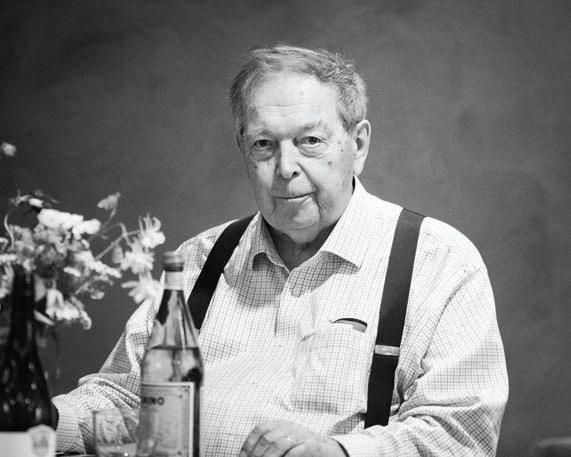
Together, John and Henrietta have devoted their lives to planting and nurturing many seeds that may take years to bring peace. They’ve instilled that passion to leave the world a better place in their sons and their wives, Philip and Anette, and Christopher and Lucy, as well as their grandchildren. We will truly miss John’s boundless curiosity, enthusiastic and creative intellect, his mischievous sense of humor, and his ready generosity.
The Goelet family asks that memorial contributions be sent to:
Holy Family Hospital Foundation
2000 P Street NW #310
Washington DC 20036
Tel. 202-785-0801 ■
The following are individuals, organizations, companies and foundations whose help between Jan. 1, 2022 and Dec. 31, 2022 is making possible activities of the tax‐exempt AET Library Endowment (federal ID #52‐1460362) and the American Educational Trust, publisher of the Washington Report on Middle East Affairs. Some Angels helped us co‐sponsor the IsraelLobbyCon. Others are donating to our “Capital Building Fund,” which will help us expand the Middle East Books and More bookstore. Thank you all for helping us survive the turmoil caused by the pandemic. The May issue will begin listing 2023 donors! We are deeply honored by your confidence and profoundly grateful for your generosity.
($100 or more)
Sami Abed, South Lyon, MI
Robert Abel, Wilmington, DE
Geoffrey Abrams, New York, NY
Rizek & Alice Abusharr, Claremont, CA
Aly Abuzaakouk, Fairfax, VA
Justine Adair, Waxhaw, NC
Michael & Jane Adas, Highland Park, NJ
Diane Adkin, Camas, WA
Frank Afranji, Portland, OR
James Ahlstrom, Stirling, NJ
Syed Ahmed, Trenton, NJ
Qamar Ahsan, Flint, MI
Bulus Paul Ajlouny, San Jose, CA
Mohammad & Shaista Akbar, Orwigsburg, PA
Peter Akras, Wading River, NY
Robert J. Akras, North Bay Village, FL
Saleh Al-Ashkar, Tucson, AZ
Rashda Albibi, Panama City, FL
M. Al Hussaini, Great Falls, VA
Tammam Aljoundi, Saint Louis, MO
Mazen Alsatie, Carmel, IN
Hamid & Kim Alwan, Milwaukee, WI
Hanaa Al-Wardi, Alhambra, CA
Nazife Amrou, Sylvania, OH
Ali Antar, Bristol, CT
Dr. John Duke Anthony, McLean, VA
Jamil Barhoum, San Diego, CA
Mona A. Bashir, Reston, VA
Joseph Bendict, Mystic, CT
Linda Bergh, Syracuse, NY
Donald Bickford, Brooklyn, NY
Michael Bradley, Scottsdale, AZ
Edward Briody, Jackson Heights, NY
James Burkart, Bethesda, MD
Mireya Camurati, Williamsville, NY
Isa Canavati, Fort Wayne, IN
Ted Clement-Evans, Liverpool, ME
Sharon Conlon, Omaha, NE
Estate of Rajie Cook, Washington Crossing, PA
Margaret Coulter & Patricia Daugherty, Sacramento, CA
Dennis Denno & Raina Korbakis, East Lansing, MI
Gregory DeSylva, Rhinebeck, NY
Robert & Tanis Diedrichs, Cedar Falls, IA
L. F. Boker Doyle, New York, NY
Garegin Dro Grigorian, Chicago, IL
Bernie Eisenberg, Los Angeles, CA
Lewis Elbinger, Mount Shasta, CA
Tom Ellis, Albany, NY
Barbara Erickson, Berkeley, CA
Hossam Fadel, Augusta, GA
Jeanne Finley, Albany, NY
Nancy Fleischer, Sacramento, CA
Steve France, Cabin John, MD
E. Aracelis Francis, St. Thomas, USVI
Donald Frisco, Wilmington, DE
Anne Ganz, Chilmark, MA
William Gassmann, Exton, PA
Claire Geddes, Salt Lake City, UT
David Glick, Fairfax, CA
Graeme Goodsir, Mechanicsburg, PA
Sam Gousen, Arlington, VA
Doug Greene, Bowling Green, OH
Nabil Haddad, Greeley, CO
Iftekhar Hai, S. San Francisco, CA
Dixiane Hallaj, Purcellville, VA
Mahmoud Hamza, Ridgewood, NJ
Nicola Hanania, Missouri City, TX
Laurie Hanawalt, Cleveland, OH
Erin Hankir, Nepean, Ont., Canada
Delinda C. Hanley, Kensington, MD*
Jim Hanna, Brush Prairie, WA
Susan Haragely, Livonia, MI
Walid & Norma Harb, Dearborn Hts, MI
Angelica Harter, North Branford, CT
Sam Hassan, Olympia, WA
Jim Hausken, Kensington, CA
Gerald Heidel, Bradenton, FL
Aouicha Hilliard, Henrico, VA
Neil Himber, Youngsville, PA
M. D. Hotchkiss, Portland, OR
Barbara Howard, New York, NY
Iftekhar Hussein, Malvern, PA
Zafer & Juhayna Husseini, Dallas, TX
Azmi Ideis, Deltona, FL
Nadia Itraish, Arlington, VA
Abdul Jabbar, San Francisco, CA
Rafeeq Jaber, Oak Lawn, IL
Marilyn & Harold Jerry, Princeton, NJ
Janis Jibrin, Washington, DC
Mark Kaidy, Westminster, IN
Issa & Rose Kamar, Plano, TX
Akram & Lubna Karam, Charlotte, NC
Carolyn L. & Martin Karcher, Washington, DC
Ghazala Kazi, Columbia, MD
Mary Keath, Bend, OR
Joseph A. Kechichian, La Canada
Flint Ridge, CA
John Keiser, Silver Spring, MD
Gloria Keller, Santa Rosa, CA
Najwa Kelloff, Reston, VA
Charles Kennedy, Concord, NH
Susan Kerin, Derwood, MD
Rehan Khan, East Brunswick, NJ
Mohayya Khilfeh, Willow Brook, IL
Eugene Khorey, Homestead, PA
William King, Hilo, HI
Carl Kleinholtz, Elyria, OH
Bader Kudsi, San Jose, CA
Edward Kuncar, Coral Gables, FL
Ronald Kunde, Skokie, IL
Edward Lamonte, Irondale, AL
David & Rene Lent, Hanover, NH
Marilyn Levin, Ashland, OR
William Lofthouse, Ashland, OR
Jonothan Logan, New York, NY
Sherif Lotfi, New York, NY
Joseph Louis, Los Gatos, CA
Donald Maclay, Media, PA
Lucinda Mahmoud, Oceanside, CA
Richard Makdisi & Lindsay Wheeler, Berkeley, CA
Asad Malik, Bloomfield Hills, MI
Sabeen Malik, Freehold, NJ
Abdulla Mamdani, Minneapolis, MN
Ted Marczak, Toms River, NJ
Joseph Mark, Carmel, CA
Martha Martin, Kahului, HI
John Matthews, West Newton, MA
Carol Mazzia, Santa Rosa, CA
Bill McGrath, Northfield, MN
Georgianna McGuire, Silver Spring, MD
Hugh McInnish, Huntsville, AL
Janet McMahon, Washington, DC
Prof. John Mearsheimer, Chicago, IL
Anisa Mehdi, Maplewood, NJ
Janet Mendelsohn, Napa, CA
Tom Mickelson, Cottage Grove, WI
Samuel Milham, Olympia, WA
Curtis Miller, Albuquerque, NM
George Mohammed, Orland Park, IL
Jan Moreb, Winston-Salem, NC
Dr. Shajih Muhanna, Atlanta, GA
Moe Muhsin, Honolulu, HI
Elizabeth Murray, Escondido, CA
William Nadeau, San Diego, CA
Claire Nader, Washington, DC
Joseph Najemy, Worcester, MA
Stephen Naman, American Council for Judaism, Atlanta, GA
Richard Nau, Longview, WA
Henry Norr, Berkeley, CA
Susan Nye, Watertown, MA****
Chalbi Ouahib, Eden Prairie, MN
Eleanor Parker, Helena, MT
Barry Preisler, Albany, CA
Moneta Prince, Austin, TX
Cheryl Quigley, Toms River, NJ
Ray Rafidi, Plano, TX
Carol Rames, Mesa, AZ
Marjorie Ransom, Washington, DC
Marilyn Raschka, Hartford, WI
Kenneth Reed, Bishop, CA
Edward Reilly, Rocky Point, NY
Paul Richards, Salem, OR
John Robinson, Somerville, MA
William Rugh, Hingham, MA
Mohammed Sabbagh, Grand Blanc, MI
Linda Saccavino, Tampa, FL
Anthony Saidy, Los Angeles, CA
Sarah Saul, Portland, ME
Ajazuddin Shaikh, Granger, IL
Qaiser & Tanseem Shamim, Somerset, NJ
Carl Shankweiler, Valley View, PA
Zac Sidawi, Costa Mesa, CA
William & Ursula Slavick, Portland, ME
Deborah Smith, Durham, NC
Les Sosnowski, Lake Forest, IL
Viola Stephan, Santa Barbara, CA
Corrine Sutila, Los Angeles, CA
Norman Tanber, Dana Point, CA
Thomas Trueblood, Chapel Hill, NC
Letitia Ufford, Hanover, NH
Joe & Helena Vella, Burlingam, CA
V. Vitolins, Grosse Pointe Farms, MI
Martin & Nancy Wein, N. Chesterfld, VA
Hermann Weinlick, Minneapolis, MN
Thomas C. Welch, Cambridge, MA
Edwina White, Sacramento, CA
David Williams, Golden, CO
Thomas Wunderlich, Cambridge, MA
Elizabeth Yates, Chesterfield, MO
Raymond Younes, Oxnard, CA
Robert Younes, Potomac, MD
Fathi Yousef, Irvine, CA
Mashood Yunus, Minneapolis, MN
John Zacharia, Vienna, VA
A. H. Zahrieh & family, Staten Isle, NY
Vivian Zelaya, NorCal Sabeel, Berkeley, CA#
Mohammed Ziaullah, Montclair, CA
Fred Zuercher, Spring Grove, PA
or more)
Miriam Adams, Albuquerque, NM
Dr. Mohammed Ahmed, Waterville, OH
Nabil & Judy Amarah, Danbury, CT
Robert Ashmore, Mequon, WI
Sultan Aslam, Plainsboro, NJ
Robert Barber, Parrish, FL
James Cobey, Washington, DC
Larry A. Cooper, Plymouth, MI****
Andrew and Krista Curtiss, Wilmington, NC
Raymond Doherty, Houston, TX
David Dunning, Lake Oswego, OR
Steven Feldman, Winston Salem, NC
Andrew Findlay, Alexandria, VA
Sameer Hassan, West Palm Beach, FL
Islamic Center, Detroit, MI
Mary Izett, Walnut Creek, CA
Les Janka, Hilton Head Island, SC
Bilquis Jaweed, West Chester, OH
Marwan Kazimi, Atlanta, GA
Nabil Khoury, Bloomfield Hills, MI
Matt Labadie, Portland, OR
Michael Ladah, Las Vegas, NV
Alison Lankenau, Tivoli, NY
Edwin Lindgren, Overland Park, KS
Allen MacDonald, Saratoga Springs, NY
Amar Masri, Fort Wayne, IN
William McAuley, Chicago, IL
Mizhraki Family Fund, Potomac, MD
Maury Keith Moore, Seattle, WA
Eid Mustafa, Wichita Falls, TX
Suhail Nabi, Spring, TX
John Najemy, Albany, NY
W. Eugene Notz, Charleston, SC
James Posakony, Del Mar, CA
John & Peggy Prugh, Tucson, AZ
Gary Rosen, Manchester, MA
Donald & Diana Ryan, Janesville, WI
Ramzy Salem, Monterey Park, CA
James Sams, Bethesda, MD
Aziz Shalaby, Vancouver, WA
Shahida Siddiqui, Ewing, NJ
Raymond Totah, Fallbrook, CA
Jeanne Trabulsi, Front Royal, VA
Tom Veblen, Washington, DC
William Walls, Arlington, VA
Catherine Al-Askari, Leonia, NJ
Roger Bagshaw, Big Sur, CA
James Bennett, Fayetteville, AR
Ted Chauviere, Austin, TX
Forrest & Sandi Cioppa, Walnut Creek, CA
Prof. Juan Cole, Ann Arbor, MI
Ed Fields, Marietta, GA
Raymond Gordon, Venice, FL
Wasif Hafeez, W. Bloomfield, MI
Theodore Hajjar, Venice, CA
Mir Masood & Anjum Hassan, Calabasas, CA
Brigitte Jaensch, Carmichael, CA
Fahd Jajeh, Lake Forest, IL
Jeanne Johnston, Santa Ynez, CA
Nazik Kazimi, Newton, MA
Nidal & Melissa Mahayni, Richmond, VA
Nabil Matar, Minneapolis, MN
Tom & Tess McAndrew, Oro Valley, AZ
Darrel Meyers, Burbank, CA
Sara Najjar-Wilson, Reston, VA
Anne O’Leary, Arlington, VA
Audrey Olson, Saint Paul, MN
Hertha Poje Ammoumi, New York, NY
Phillip Portlock, Washington, DC
Bassam Rammaha, Corona, CA
Fred Rogers, Northfield, MN
Patricia Ryder-Christensen, Poulsbo, WA
Betty Sams, Washington, DC*, **
Irmgard Scherer, Fairfax, VA
Joan Seelye, Washington, DC
Abid Shah, Sarasota, FL
Bernice Shaheen, Palm Desert, CA***
Shahida Siddiqui, Ewing, NJ
Mushtaq Syed, Santa Clara, CA
Don Wagner, Orland Hills, IL
Mumtaz & Aglai Ahmed, Buda, TX
Michael Ameri, Calabasas, CA
Asha A. Anand, Bethesda, MD
Lois Aroian, East Jordan, MI
Grace Austin, Chicago, IL
Karen Ray Bossmeyer, Louisville, KY
Branscomb Family Foundation, La Jolla, CA
Joseph Daruty, Newport Beach, CA
Nabila El Taji, Amman, Jordan
Majed Faruki, Albuquerque, NM
Dorsey R. Gardner, Palm Beach, FL
Alfred R. Greve, Holmes, NY
Brice Harris, Pasadena, CA
Judith Howard, Norwood, MA
Ghazy Kader, Shoreline, WA
Timothy Kaminski, Saint Louis, MO
Dr. Jane Killgore & Thomas D’Albani, Bemidji, MN**
Katharina D. Koehler, Mannheim, Germany
Tony Litwinko, Los Angeles, CA
George & Karen Longstreth, San Diego, CA
Jack Love, Fort Myers, FL
Jamal Najjab, Washington, DC
Andrea Nobil, Miami Beach, FL
Hani Marar, Delmar, NY
Roberta McInerney, Washington, DC**
Mary Norton, Austin, TX
Robert Roeske, Madison, WI
Lisa Schiltz, Houston, TX
Gretel Smith, Garrett, IN
David Snider, Bolton, MA
Imad & Joann Tabry, Fort Lauderdale, FL
Donn Trautman, Evanston, IL
Prof. Stephen Walt, Brookline, MA
($5,000 or more)
Paula Davidson, Naples, FL
Dr. Clyde Farris, West Linn, OR*, **
Ronald & Mary Forthofer, Boulder, CO
John & Henrietta Goelet, Washington, DC
Muhammad Khan, Jersey City, NJ
William Lightfoot, Vienna, VA
Ralph Nader, Washington, DC
Benjamin Wade, Saratoga, CA
* In Memory of Dick & Donna Curtiss
** In Memory of Andrew I. Killgore
*** In Memory of Dr. Jack G. Shaheen
**** In Memory of Diane Rose Cooper
# In Memory of John F. Zelaya

American Educational Trust
Washington Report on Middle East Affairs
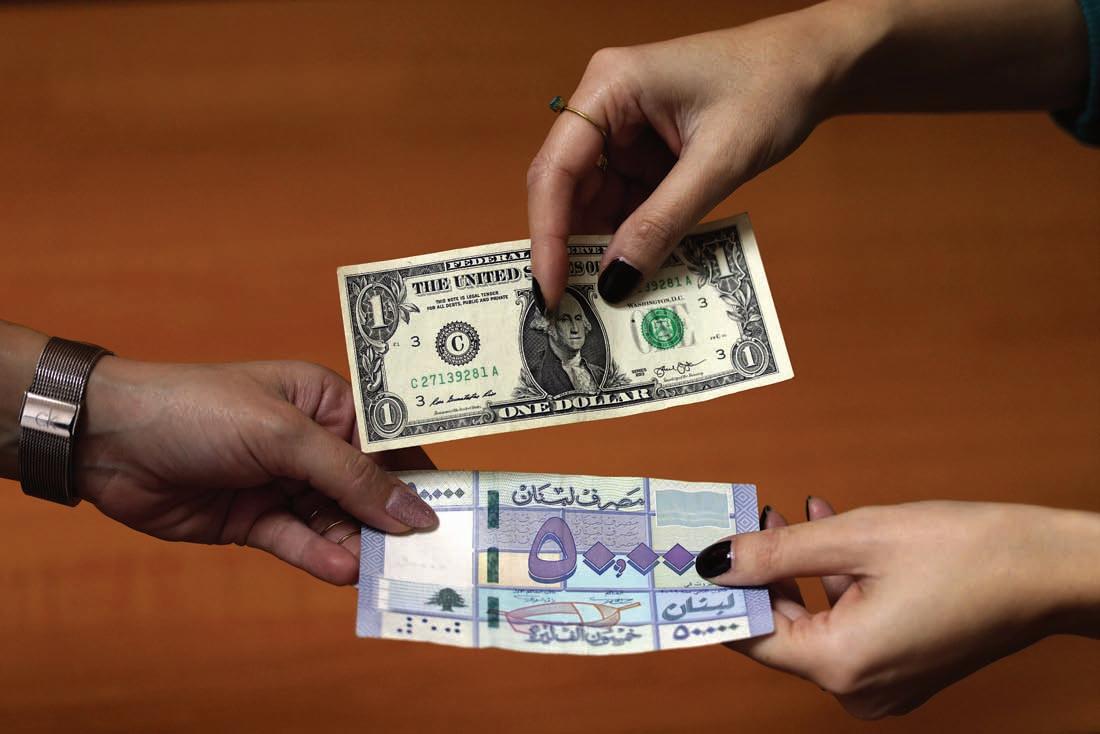
P.O. Box 53062
Washington, DC 20009
March/April 2023
Vol. XLII, No. 2
This picture shows two women exchanging a U.S. dollar bill for a 50,000 Lebanese pound (lira) banknote, in the Lebanese capital of Beirut, on Jan. 19, 2023. The Lebanese currency reached the psychological threshold of 50,000 pounds for one U.S. dollar, as the country grapples with a full economic collapse and its parliament fails to elect a president. PHOTO BY JOSEPH EID/AFP VIA GETTY IMAGES